
BLOG: APPLIED RESEARCH OF EMMANUEL GOSPEL CENTER
Church Landscape Review: Pastoring Under Pressure
In the last 10 years, pastors have faced unprecedented challenges in shepherding their congregations. How did pastors in Boston hold up under the pressure?
Church Landscape Review: Pastoring Under Pressure
In the last 10 years, pastors have faced unprecedented challenges in shepherding their congregations. Even veteran pastors admitted they had never seen anything like this during their ministerial careers.
During the pandemic, almost half of pastors nationwide considered leaving full-time ministry.
What about pastors in Boston? How many hours a week do they work? What kind of support do they prefer? What type of training do they use to develop other church leaders? What questions would they like to ask other pastors?
The Emmanuel Gospel Center’s Applied Research team explored difficult questions like these in a study of pastors of new churches in the Boston area from 2014 to 2024. In “Pastoring Under Pressure,” the team analyzed key trends and critical challenges facing these leaders. The report also includes recommendations as well as reflection questions for pastors and church leaders.
This report is part of the larger 2024 Church Landscape Review, a study of newer church communities in the Boston area over 10 years. We will publish the Applied Research team’s findings in a series of reports to be released periodically throughout 2025:
Open Doors in Boston
Evolving Vision*
Church Sustainability*
*Titles are subject to change.
If the Black Church were to disappear, who would miss it?
There are about 250 Black churches in Boston facing multiple challenges. To leverage their collective strength, almost a dozen of them came together to build relationships for the betterment of the community.
(Clockwise from top left: wwing, wwing, timeless, MCCAIG, all via Getty Images)
“If the Black Church were to disappear, who would miss it?”
That’s the overarching question Jaronzie Harris and her team led with as they began a data-driven study of the Black Church in Boston.
The team tried to answer a series of questions: “Who’s in the Church? What are they doing? How’s the Church doing? How many churches do we have? What are these Black Christians even thinking about or talking about? Do they even talk to each other?”
Jaronzie Harris, Director, Black Church Vitality Project. Emmanuel Gospel Center
In partnership with several organizations, Harris’s efforts helped establish the Black Church Vitality Project, an initiative close to her heart as a daughter of the Black Church.
“My love for the Church really comes out of my love for Black people, Black communities,” Harris told the Emmanuel Gospel Center’s Curious City podcast. “Always having that sense of service and a faith centered in hope and love.”
The team’s research found there are about 250 Black churches in Boston facing multiple challenges. To leverage their collective strength, Harris sought to bring some of these churches together to build relationships for the betterment of the community. She gathered almost a dozen Black churches in close proximity to each other in four predominantly Black neighborhoods of Boston.
Together, they looked at the changes taking place in their local communities, how their mission and values might need to change in light of what they’re learning about their neighborhoods, and how their churches can take action.
These topics made for vulnerable conversations. And while not everyone is on the same page, Harris said the desire is there among the churches to work together.
These meetings and discussions between these churches make for a dynamic, relational process that’s transformative in and of itself. It holds up a mirror for the churches to assess themselves in the immediate context of their neighborhoods and the broader culture they live in.
“My love for the Church comes from my love for Black people,” Harris said, “so if the Church is not serving the people, then what are we doing?”
For this and more from Harris’s conversation with Caleb McCoy, listen to the Curious City podcast.
Apple Podcasts | Podbean | Spotify | YouTube
Church Landscape Review: Changing Faces of Faith
Churches have experienced plenty of change and faced much upheaval over the last 10 years. If you could take a snapshot of your church before and after that period, what would it look like? Would you see any big structural changes? How would the leadership of your church have changed? What about the congregation?
Churches have experienced plenty of change and faced much upheaval over the last 10 years. If you could take a snapshot of your church before and after that period, what would it look like? Would you see any big structural changes? How would the leadership of your church have changed? What about the congregation?
That’s just what the Applied Research team at the Emmanuel Gospel Center did with a diverse group of newer churches in Boston between 2014 and 2024.
They looked at things like attendance, leadership, and demographics. Their findings in the “Changing Faces of Faith” report show time left little untouched. The churches in the study had to be creative when it came to finding meeting space, facing a pandemic, and navigating leadership changes.
This report is part of the larger 2024 Church Landscape Review, a study of newer church communities in the Boston area over 10 years. We will publish the Applied Research team’s findings in a series of reports we will release periodically throughout 2025:
Open Doors in Boston
Evolving Vision*
*Title subject to change.
Church Landscape Review: Executive Summary Report
How has the church landscape in Boston changed over the last ten years? EGC’s Applied Research team analyzes the data from before-and-after snapshots of a group of newer churches between 2014 and 2024.
In 2014, the Emmanuel Gospel Center (EGC) conducted a research study of over 40 church plants in the Boston area. It involved in-depth interviews with a diverse group of new churches from different denominations, ethnic groups, and networks. While the study focused on women in church leadership, it yielded a treasure trove of information on the church planters and their congregations.
Ten years later, EGC’s Applied Research team revisited the snapshot the 2014 data had produced and re-interviewed almost two dozen of the original churches. The team wanted to examine any shifts in the church landscape over a challenging and tumultuous period.
The research team gathered their findings in a series of reports we will release periodically throughout 2025. The Executive Summary Report provides a broad introduction to the study along with major data trends. The other reports revolve around four different themes:
Open Doors in Boston
Evolving Vision*
*Title subject to change.
Exploring Church Spaces
Christians look on in dismay as empty churches are converted into luxury condos, but congregations are beginning to reassess how their sacred spaces are used outside Sunday worship.
Christians look on in dismay as empty churches are converted into luxury condos. Steeples used to dot city skylines and dominate small towns. But for decades now, it’s felt like these sacred spaces are being overshadowed. Disemboweled.
However, a sea change is underway as congregations reassess the use of their buildings outside Sunday worship. They are beginning to ask themselves some uncomfortable questions: How much of our building lies empty during the week? How much dead space is the church creating on a city block? How else could this space be used? Who else could benefit from this space?
Communities and cities are buckling under the strain of challenges such as affordable housing, economic and education inequality, mental health and substance abuse, environmental resilience. There is a unique opportunity for churches to leverage their real estate assets for missional witness.
Saranya Sathananthan, a researcher in residence at EGC, has been engaging with local congregations at the forefront of church-space innovation. She delves into the challenges they face and uncovers powerful missional opportunities in reimagining church spaces.
Explore the resources she and her team have created and discover insights on church-space innovation.
Challenges and Solutions for Maximizing Church Spaces in Boston
While many churches in Boston share their space with congregations, nonprofits, or community members, several barriers prevent them from fully utilizing their properties for mission.
Challenges and Solutions for Maximizing Church Spaces in Boston
by Saranya Sathananthan, Researcher in Residence
One of the main observations from this study is that most of the churches that participated were well-aligned when it came to utilizing their property for mission. It should come as no surprise, given that numerous churches in the city rent to other congregations, provide office space for nonprofits, or allow community members to host events for nominal fees.
While this represents a great strength in how churches utilize their properties in Boston, it still represents only a fraction of what could be happening. (See this list of innovative uses of church spaces.) Despite this potential, several barriers prevent churches from fully utilizing their properties for mission.
Vision and Mission
A key indicator in determining how open a congregation is to creatively using its property lies in the theology of its senior leaders regarding sacred space and stewardship. The research revealed that leaders with a broader understanding of stewardship often cast a vision for their congregation that embraced opening their buildings to the rest of the community for purposes beyond worship services. Some leaders saw the church building as a tool for ministry, expressing a desire for it to bless the surrounding community. Others shared their perspectives on the sacredness of a building itself. While some expressed that the architecture or history of their building drew people to the church, leaders who viewed the physical structure as "just a building"—with the sacredness residing in the people and activities where God's presence is invited—tended to foster a more flexible, community-focused use of their spaces.
However, some leaders experienced notable tension when they tried to shift their congregation's mindset about property use. Some expressed that their church's subculture leaned toward risk aversion, with worst-case scenarios prompting people to want to close their doors and retreat into enclaves rather than serving as launching pads for their communities. In other contexts, leaders noted that specific subgroups, having worked hard to secure their space, were highly protective of their resources. They feared that opening their doors could lead to misuse or loss, which made them hesitant to fully embrace the potential of their church property to serve a wider group of people.
Aging Infrastructure Against Limited Funds
One of the most pressing issues facing many Boston churches is the undeniable reality of aging infrastructure. Over 50 churches in the city are registered as historic landmarks, and many church buildings, regardless of these official designations, are old and need significant repairs. Unfortunately, the funds required to address these issues are often limited, particularly for smaller, dwindling congregations that struggle even with the regular upkeep of their expansive historic buildings.
This issue is not unique to Boston; it mirrors trends in other major cities and Western nations. In the United Kingdom, over 2,000 church buildings have closed during the past decade.1 In New York City, more than three dozen houses of worship and similar buildings were razed or redeveloped in Manhattan alone between 2013 and 2018,2 often replaced by high-end condos. Each year, congregation closures outnumber new church starts in the U.S. by 50%, according to Lifeway Research. In 2019, prior to the pandemic, although about 3,000 new Protestant churches were planted, 4,500 Protestant congregations closed. In Boston, over recent decades, about 45 buildings owned by churches have been lost to the Christian community, primarily through sales to developers and private commercial entities.
Another aspect of this challenge is that many church buildings in Boston are not fully accessible, up to code, tech-equipped, or readily transformed for different needs. Moreover, historic designations restrict how churches can renovate many of these buildings. These limitations hinder churches' ability to serve their communities effectively, particularly in welcoming people with disabilities or hosting events that require modern amenities. A combination of even a few of these conditions can significantly limit how the space can be used, preventing churches from fully utilizing their buildings for diverse activities or adapting them to meet modern needs. Notably, many churches participating in this project had fires that rendered certain spaces of their churches unusable for years before repairs could be made.
“Do churches spend their limited resources on maintaining or updating their buildings, or should they abandon ownership and focus their funds directly on ministry activities?”
The cost of bringing these buildings up to current standards can be prohibitive, particularly for congregations already struggling financially. The cumulative effect of deferred maintenance leading to more significant issues has resulted in many churches closing, with buildings left abandoned,3 sold, or even demolished.
This situation presents a dilemma for many pastors: Do churches spend their limited resources on maintaining or updating their buildings, or should they abandon ownership and focus their funds directly on ministry activities?
"We sold our former building for a very good price, but now the question is, shall we use it on brick and mortar?” Pastor Daniel Chan of Boston Chinese Evangelical Church in Boston’s Chinatown said. “Our deacons are raising the question of whether we should spend the money on ourselves (on a new multifunctional sanctuary) or spend the money directly on the community. So we are still struggling and debating."4
Limited Leadership Capacity and Training
Limited leadership capacity in many congregations further complicates their decision-making regarding church infrastructure. Pastors and church leaders are often stretched thin, balancing their congregations’ spiritual needs with the practical demands of maintaining their facilities. Many seminaries do not provide pastors with practical education on facilities maintenance or the business acumen needed to run a church, leaving leaders to learn on the job.
“The main challenge is inexperience, just not knowing what we're doing for a lot of these things,” Pastor Larry Kim of Central Square Church in Cambridge, Massachusetts, said. “There's always a new surprise here in this building, and it's trying to figure out how to problem-solve those things. It’s like I'm learning things for the first time.”5Although some denominations have long provided practical support for church operations, facilities management, and loans for repairs and upgrades, we are now finally seeing a broader range of resources and services that better equip leaders with the knowledge they need becoming available.
“There's no lesson like on-the-job training,” Pastor Kurt Lange at East Coast International Church in downtown Lynn, Massachusetts, said. “But there are now books written by Christian authors and church leaders in this space that I do think a lot of pastors need to read.”6Pastor Kurt Lange's Recommended Reading List
Delegating facilities management and related responsibilities to non-pastoral roles can benefit churches with the capacity to hire staff or manage volunteers. However, this may not be feasible for smaller churches with limited internal resources. Whether the church hires staff or enlists volunteers to assist with facilities management, make repairs, write grants, or take on other specialized roles, investing in the professional development of these staff members and volunteers is essential. If church leaders don’t learn what is needed, others cannot be expected to know this information, even if they bring relevant skill sets to their roles. Each church situation is unique, and the number of intersecting decisions to be made at any given time makes it challenging even for the most trained or experienced professionals. Churches that understand the value of investing in their leaders are more likely to succeed, and recognizing those who manage and maintain the facilities as essential to the church will contribute to its overall success.
“If we want to help our staff members to be successful, we need to provide training for them,” Pastor Chan of Boston Chinese Evangelical said. “Our facility manager needs training on property management, our technician needs training to develop skills to make repairs, and we realized that we may need to put more money into training even our pastor, who is coordinating all this. He didn't study this in seminary. So we realized we need a budget for training our people.”Even if a church lacks the funds to hire staff, outsource services, or send people for professional training, sharing knowledge within the congregation can be a valuable way for everyone to contribute to the overall vision. Tapping into the expertise of individuals who can teach or offer specific skills and “doing it together” can foster shared experiences that build missional solidarity.
“Find out who your people are and what they know. Include everybody in your parish, because there’s all kinds of good ideas out there.”
“Find out who your people are and what they know. Include everybody in your parish, because there's all kinds of good ideas out there,” Jim Woodworth, facilities manager at the Cathedral Church of St. Paul in downtown Boston, said. “But sometimes you’ve got to draw them out of people.”7
“Some of my people aren't in the workforce,” Pastor Lange of East Coast International said. “So we’re teaching people how to paint, hold a drill, etc., for people who have never had a chance to do it.”
He shared that the sending church they came out of would have hired a company to make any necessary repairs or do construction, but that they were not at a place where they could afford it when they were a church plant. Though their circumstances have changed since then, he still emphasized the need to think through whether to hire an outside company.“Sometimes just because it may be easier for us to pull it off, or faster, or better, we have learned that there are some real interesting discipleship opportunities in working with people, like doing manual labor together.” Pastor Lange said. “So we kind of enjoy it—working with people in that capacity.”
An observation from the research revealed that when an entire congregation is committed to the vision for the church building, there’s more significant motivation for everyone to contribute. It is the task of church leadership to communicate that vision effectively, from the leadership level to every person in the congregation and beyond or cultivate that vision together through a series of discussions that brings together various stakeholders. This process is vital, whether the church has abundant or minimal resources for the upkeep of facilities.Take Congregación León de Judá in the South End neighborhood of Boston, for example. Under the direction and vision of Pastor Roberto Miranda, the congregation purchased a building in the South End in 1994 and undertook a decade-long renovation, with members volunteering their time and skills and resourcing supplies to build the church.
Javier Encina, the facilities manager at León de Judá, described church teams tearing flooring from homes and putting it back together in that building, almost completely fitted with donated materials.“It took us around 10 years, between volunteers and salvaging materials and reusing them, to build this church,” Mr. Encina said. “We built this building with the sweat of the people. All the work and manual labor on the church was done by the people of this church.”
No wonder this hallmark congregation takes deep pride in their building and invests in its upkeep, ensuring it remains a welcoming place for their members and the broader Boston community.
Figs. 1-4 Members of Congregación León de Judá work together on reconstructing the Harrison building, the first building they purchased in the South End. Figs. 5-6 Hallway and entrance to the Harrison building. Photos courtesy of Congregación León de Judá.
The Difficulties of Decision-Making and Management
Effective decision-making regarding the use and maintenance of church properties is often complex and challenging. Many churches have governance structures that can slow decision-making, leading to frustration and burnout among those responsible for managing the property. Establishing a dedicated team to handle property management can alleviate the burden on pastoral staff, but this requires careful planning and clear communication.
Deciding to expand the use of church space introduces new challenges. Questions arise, such as who will open the space, manage access, troubleshoot issues, ensure security, handle cleanup, and deal with inevitable wear and tear. Churches may need to consider growing their team and delegating additional leadership responsibilities.Moreover, churches often face bureaucratic obstacles from the city or state when adapting their spaces for new uses, particularly regarding regulations for activities involving minors or other vulnerable populations and the need to obtain special permits. When a church transitions to additional usages, even adding a single one could elicit numerous issues. These challenges can be daunting and may discourage churches from moving forward if not carefully considered. Every church I interviewed expressed these challenges when opening their space for additional use beyond Sunday services.
Helpful Mindsets and Postures
When asked how they navigate these challenges, several leaders shared helpful mindsets they adopt.
"I expect things to go wrong. I expect to have to switch gears constantly. We prioritize, and then we re-prioritize. But that's the job."
— Jim Woodworth, facilities manager at the Cathedral Church of St. Paul in downtown Boston, on the need for flexibility
“Be nimble and pivot.”
— Laura Mitchell, Director of Children and Youth, from Central Square Church in Cambridge, MA, reflecting on the challenges with their building’s heating. They had to rearrange everything and move from the sanctuary to the fellowship hall for a few months.8
“Lead with patience. We have to be mediators, understanding everyone’s point of view."
— Yulieth Ramos, the administrative assistant at Congregación León de Judá in the South End neighborhood of Boston, describing how she manages the frustrations of staff or members when a group leaves a mess after an event9
“You’ve got to be willing to be innovative and entrepreneurial. What has helped our church is avoiding the mindset of 'we've always done it this way' or 'we've never done it that way.' … Maybe God is trying to move flexibly with us, but we're staying rigid, not allowing God to do what He’s trying to do. That flexibility is tied to good stewardship—managing things properly, responsibly, ethically, and justly."
— Pastor Darrell R. Hamilton II of First Baptist Church of Jamaica Plain in Boston, on the value of innovation and the need for flexibility10
For churches who share their space with other groups, it’s also crucial to be aware of cultural differences and power imbalances between host and guest and how they can impact relationships. EGC conducted research on congregations sharing space in 2012 and section three and four of this blog post on Shared Worship Space11 has additional factors to consider when sharing space where there are major cultural and economic differences between the hosting congregation and groups that share their space.
People, Processes, and Communication
Many pastors emphasized the importance of the right processes and people in overcoming challenges.
"I don’t know what I’m doing half the time," Pastor Christina Tinglof of Forest Hills Covenant Church in Boston, admitted. "I would say to other pastors: make sure you’re not making decisions on your own. It’s important to involve others."12Pastor Hamilton echoed this sentiment, stressing that "cultivating a good team is critical."
“Cultivating a good team is critical.”
When things don’t go as planned, Pastor Lange of East Coast International shared their approach to handling issues with outside groups that use their space: “We make sure to maintain a benevolent attitude towards other churches that use our facilities, but that requires us to have quick conversations whenever something goes wrong.”
Establishing clear internal processes and communicating space usage guidelines to everyone involved takes time, often requires trial and error, and can be frustrating—just like any growing pains. Each church's processes and policies may need to adapt during different seasons of change and transition.
The most significant takeaway from leaders' experiences in successful property management is the importance of pacing. Churches don’t need to do everything at once. It’s often better to start with small, manageable changes, learning from those experiences before expanding further. This iterative, flexible approach allows churches to refine their processes and avoid being overwhelmed by the demands of managing an active, multifunctional space. Trying something new might sometimes feel like taking one step forward and five steps back, but having the resilience to address setbacks before moving forward is critical to long-term growth and sustainability.
“It cannot be one size fits all.... We have to work with the moment.”
One fascinating observation from my conversations with church leaders was the contradictory nature of the advice they offered. One person would recommend having a single administrative person manage all scheduling online, while another said they’re OK with multiple pastors managing the schedule without an online calendar. A few advocated strongly for outsourcing repair work, while another made the case for involving volunteers from the church. Some pastors advise being deeply involved in management details, while others recommend delegating those tasks. These different approaches taught me early on that there’s no single solution. Each church should take inventory of its strategies, weigh the pros and cons, and decide what works best, then reassess and adapt as circumstances change.
“It cannot be one size fits all,” Pastor Marc Lefevre of Boston Missionary Baptist Church in Roxbury, Massachusetts, said. “Based on who we are, we can do it this way. Yet when we become bigger, it would be impossible to do it the same way. When we were only 15, or when we were only 100, that was a different ballgame. But now that we are a growing church, you have to do things differently. We have to work with the moment.”13
- Rachel Pfeiffer, “After 2,000 UK Church Buildings Close, New Church Plants Get Creative,” Christianity Today, May 25, 2022, https://www.christianitytoday.com/2022/05/uk-england-church-close-anglican-buildings-restore-new/.↩︎
- C. J. Hughes, “For Churches, A Temptation to Sell,” New York Times, October 4, 2019, https://www.nytimes.com/2019/10/04/realestate/for-churches-a-temptation-to-sell.html.↩︎
- Matthew Christopher, “Why Are There So Many Abandoned Churches: Changing Neighborhoods, Loss of Faith, Even Heating Bills Make Places of Worship Among the Most Common Types of Forgotten Places,” Atlas Obscura, February 29, 2024, https://www.atlasobscura.com/articles/abandoned-churches.↩︎
- Daniel Chan, interview by author, September 20, 2023.↩︎
- Larry Kim, interview by author, October 11, 2023.↩︎
- Kurt Lange, interview by author, November 3, 2023.↩︎
- Jim Woodworth, interview by author, September 29, 2023.↩︎
- Laura Mitchell, interviewed by author, October 11, 2023.↩︎
- Yulieth Ramos, interviewed by author, August 30, 2023.↩︎
- Darrell R. Hamilton II, interviewed by author, February 22, 2024.↩︎
- Bianca Duemling, “Shared Worship Space - An Urban Challenge and a Kingdom Opportunity,” Emmanuel Research Review reprint Issue No. 74, January 2012, https://www.egc.org/blog-2/2012/1/16/shared-worship-space-an-urban-challenge-and-a-kingdom-opportunity.↩︎
- Christina Tinglof, interviewed by author, November 2, 2023.↩︎
- Marc Lefevre, interviewed by author, November 10, 2023.↩︎
Opportunities for Leveraging Church Spaces
Churches open to reimagining how their spaces can be utilized may discover new ways to serve their communities, build stronger connections, and contribute to the financial sustainability of their facilities.
Opportunities for Leveraging Church Spaces
Finding a Sweet Spot: Missional Alignment, Financial Sustainability, and Community Vitality
by Saranya Sathananthan, Researcher in Residence
Churches open to reimagining how their spaces can be utilized may discover new ways to serve their communities, build stronger connections, and contribute to the financial sustainability of their facilities.
Mission-Driven Space Utilization
One key opportunity many churches are already embracing is evaluating and repurposing underused spaces for mission-aligned activities that benefit the community. They are partnering with local organizations, offering space for community events, or creating new programs that address the surrounding neighborhood’s needs. By aligning the use of space with their mission, churches can ensure that the use of their properties is furthering their spiritual and community goals.
Mathew Jarell from the Cathedral Church of St. Paul in downtown Boston spoke to the challenges and rewards of utilizing space for mission-aligned activities that serve different groups and purposes. The cathedral has only one large sanctuary that it adapts for use by different worshiping communities, musical events, and meetings.
“Space doesn’t just morph into whatever is needed; it requires a lot of preparation, hard work by our facilities team, and time and energy.”
“It takes a lot of planning,” Mr. Jarell said. “Space doesn’t just morph into whatever is needed; it requires a lot of preparation, hard work by our facilities team, and time and energy. But we’ve made things possible.”1
Given their context in downtown Boston, where space is at a premium, he shared how their church space has supported people planning events there.
“When we get a request from a group planning an event on the Common, it feels good when we can help. It feels like we’re contributing to the life of the neighborhood and the city,” he said “It’s challenging, but it’s really rewarding and a great, great opportunity to be able to be a part of that.”
Innovative Use of Church Spaces
Another opportunity lies in reimagining what’s possible with church spaces. This page includes a list of possible spaces in church buildings or on church-owned property and an expanded list of potential uses in urban contexts. These ideas stretch the imagination, showcasing what’s possible—from indoor play areas for families with young children to urban farms on rooftops or lawns.
Some churches are already finding creative ways to use their buildings, from hosting coworking spaces to providing affordable venues for arts and cultural events. By adopting flexible and adaptive-use policies, churches can respond to the dynamic needs of their communities and explore new ways to generate income while staying true to their mission.
Fig. 1 The Loft at Stetson is a thrift store owned and operated by East Coast International Church which doubles as a location for on-the-spot counseling. Proceeds from the thrift store go toward a church ministry that supports women in recovery.
Pastor Kurt Lange from East Coast International Church in Lynn, Massachusetts, discussed using their spaces for multiple purposes. The lobby of their church also serves as a cafe, which is open Monday through Friday, with the church using it on nights and weekends. They doubled up their church offices with the nonprofit they started. The second floor of another building is a thrift store, which also serves as a counseling center.
“We’re very comfortable organizationally with the messiness of there being a worship space that is also a cafe that’s also a job training center that is also a space for community meetings.”
“We're very comfortable organizationally with the messiness of there being a worship space that is also a cafe that's also a job training center that is also a space for community meetings, and we could just keep going,” Pastor Lange said. “So everyone knows that you don't really know what you're going to walk into on any given day unless you look at the calendar.”2
Fig. 2 Land of a Thousand Miles Coffee owned by East Coast International Church. The coffee shop is also the front entrance and lobby to their main church sanctuary.
Economic Impact on the City
"The average historic sacred place in an urban environment generates over $1.7 million annually in economic impact,” a 2016 research study conducted by Partners for Sacred Places found.3 This impact stems from churches offering jobs and training individuals; purchasing goods and services from local businesses; serving as incubators for nonprofits and small enterprises; and providing affordable spaces for life events, from weddings to funerals.
Given this substantial contribution, this moment calls for civic leaders in Boston to invest in revitalizing church spaces, expanding their role and service as community hubs. As more churches face financial pressures that force them to close or move and sell their properties, the city risks losing institutions that provide invaluable contributions to its residents.
The implications for the vitality of Boston’s neighborhoods are significant. The loss of a church can mean the loss of accessible, affordable space for various activities and the elimination of a vital gathering place where people build social capital and access a wide range of often free programs and services that enhance individual lives and the community.
“If our church closed down, would anybody notice?”
Several church leaders emphasized this vital role. Pastor Davie Hernandez of Restoration City Church in Roxbury, Massachusetts, asked his congregation: “If our church closed down, would anybody notice? We have to be a church that, if we miss one day, everybody's asking what happened. That's what we strive to be. We want to be so much a part of the community that we are part of the lives and livelihood of everyone in our community, part of a system or the ecology of their daily lives.”4
Boston’s churches, often situated at central locations within their neighborhoods—at major intersections or on main streets—offer a unique opportunity for community impact. These churches typically share the goals of local nonprofits, possess ample underutilized space, and provide various facilities, from kitchens to auditoriums.
Historically, they have also been deeply rooted in the spiritual, social, and cultural lives of their communities. Even a modest investment to help a church maintain its building assets or adapt to a new use that benefits the community could have a significant and far-reaching impact.
In light of the city's needs, there are unique opportunities for churches to partner with civic leaders, developers, nonprofits, and other stakeholders to further Boston's economic empowerment and vitality. Churches can leverage the underutilized spaces in their buildings for use as commercial kitchens, early childhood education such as daycare centers and schools, affordable housing, and spaces for the arts.
Community Hubs & Cultural Centers
Beyond the economic impact, churches also have the potential to serve as vibrant community hubs and cultural centers, addressing a wide range of local needs. This opportunity allows churches to expand their role beyond spiritual nourishment to include social, educational, and cultural engagement. Some churches have successfully transformed their properties into dynamic community centers offering various services, from food pantries and after-school programs to cultural events and neighborhood meetings.
In many immigrant communities, churches naturally serve as cultural centers where the congregation and the community are deeply intertwined. These churches often provide spaces where people can connect with their cultural heritage while meeting practical needs. For example, a church might offer language classes, legal aid, or job training programs specifically tailored to the needs of their community members. This dynamic was evident in many diasporic churches I interviewed in Boston.
Congregación León de Judá in the South End neighborhood of Boston houses Agencia ALPHA, a well-established immigration service in Boston. When I visited, the building was bustling with activity, with several staff members taking phone calls and interns working to support the team.
Fig. 3 English class in progress at Boston Missionary Baptist Church. Emmanuel Gospel Center.
Boston Chinese Evangelical Church in the Chinatown neighborhood of Boston and Boston Missionary Baptist Church in Roxbury, Massachusetts, offer English classes to their diasporic communities. These programs are open to the community, regardless of whether participants are congregation members.
Pastor Daniel Chan of Boston Chinese Evangelical Church said this aligns with their church's vision because the majority of their members are first-generation immigrants.
“When we first immigrated to America, we struggled with English, finding jobs, and other difficulties,” he said. “But after 30 years, we’ve been able to settle down. Most of us now have jobs, and some even own homes.”5
While many of their members have moved to more affordable areas like Qunicy, Malden, and other Chinese population centers, new immigrants are still coming through Chinatown.
“That’s why we decided to stay in Chinatown—to be a blessing to the community,” Pastor Chan said. “We have after-school programs, community English classes, and summer camps for middle school students. This church still pulls people back to the community to help. We want them to remember that they were once immigrants, and now that God has blessed them, it’s time to give back. Our vision is: ‘Blessed to be a blessing to others.’”
Fig. 4 Friday Food Pantry Distribution at Boston Missionary Baptist Church. Emmanuel Gospel Center.
Pastor Marc Lefevre of Boston Missionary Baptist Church said the church uses its space to provide community services such as computer and English language training, food distribution, and immigration support.
“We are open to the community—many local organizations use our space for their meetings or gatherings,” he said. “They know it’s open for them. We don’t charge for the space; we see it as a blessing from the Lord.”6
This idea of the church as a community hub extends to all who enter its doors, whether they are members of the congregation or people in need. When churches embrace this role, they become places of refuge, support, and connection for the entire community. The 2016 report by Partners for Sacred Spaces found that "87% of the beneficiaries of community programs and events housed in sacred places are not members of the religious congregation. In effect, America's sacred places are de facto community hubs.”7
This has been especially true for Black churches which have played a critical role in the formation and maintenance of Black life in America for centuries. In Boston, churches have been the heart of movements that have advanced human and civil rights from abolition in the 19th century to anti-violence organizing in the 1990s. A combination of historical, social, and economic factors has led to significant displacement of Boston's Black community which has had a profound impact on churches, particularly in their role as social and cultural centers. This displacement has challenged Black churches' ability to maintain their central role in fostering community cohesion, cultural identity, and social services, while also pushing them to adapt and advocate for the preservation of their communities amidst gentrification and economic pressures.
Examining Who is Inside & Outside the Church
As churches continue to function as crucial community hubs, one question arises: Who do you find inside and outside the church, and are they one and the same? Does the congregation reflect the community? Suppose your local community includes people experiencing homelessness. How can the church’s offerings holistically include not just spiritual nourishment but also practical services such as a free or subsidized laundromat, showers, haircuts, and access to housing—making the church a genuine, welcoming place for them to belong? How can the utilization of church space contribute to a closer integration of the congregation and the local community?
While churches can serve as community hubs, it's crucial to establish clear boundaries on how people use the space. A church’s space does not need to become everything to everyone, and it's important to communicate this to both the congregation and the broader community.
“Who do you find inside and outside the church, and are they one and the same? Does the congregation reflect the community?”
I discussed the challenge of setting boundaries around the use of church space with Yulieth Ramos from Congregación León de Judáh in the South End neighborhood of Boston. When I asked how she would respond to people who believe the church should be open to anyone at any time because of its role as a sanctuary, she said the church is responsible for stewarding its space well for the sake of all who use it.
“What I said to one person who asked me that question was, ‘I understand that the church is open, but we have to take care of the space because we're using it every day,’” she said. “Even if someone wanted to stay overnight, we would have to do so much to ensure that this space remains safe in the evenings and still usable by the other people who share it during the day. While we are a church and we do want to help, we're not a shelter, and if someone needs one, we can help them find it. We have to set boundaries to ensure this place remains safe and accessible by all the groups that use it.”8
Churches are encouraged to stay true to their mission and vision while remaining flexible on implementation. Some congregations experience mission drift as they begin to evolve into nonprofits. One way to maintain a distinction between these roles is to establish separate entities and management to ensure that efforts to make the space more available for community needs don't overshadow the primary call to steward the congregation's spiritual life.
Community Partnerships
Developing strong community partnerships is a crucial opportunity for churches looking to maximize the impact of their properties. By opening their facilities to local organizations and community groups, churches can foster stronger ties within the neighborhood and enhance their ability to serve. These partnerships can generate additional revenue through space rentals, collaborative programs, or funding opportunities for innovative projects that benefit the entire community.
However, churches should carefully consider who they partner with and how these partnerships align with their values and theology of stewardship. Some churches may avoid collaborations with for-profit entities, while others might see such partnerships as a creative way to further their mission.
Regardless of the approach, if a church considers opening its space to its neighbors, it is essential to involve community stakeholders in shaping how the space will be used. Including community partners in the planning process not only ensures that the space is utilized in the most beneficial ways but also fosters a stronger investment in the space and its activities. This approach creates greater community buy-in, helping the church maintain its role as a vital and enduring presence in the neighborhood.
Preservation and Modernization
Balancing the need to preserve historic church buildings with the necessity of modernization is a challenge that presents significant opportunities for churches. Many church leaders are deeply concerned with how their properties can continue to serve future generations while maintaining their historical and architectural integrity.
"We're fixing that tower so that the next generation doesn't have to worry about it and can focus on something else,” Pastor Larry Kim of Central Square Church in Cambridge, Massachusetts, said. “Our job is to ensure that this remains a church, a place of worship for the next generation, and that it continues. When I watch our kids run around, have space to play, grow, and be discipled, I feel like it’s really been worth it—worth paying for the restoration of that window that gives sunlight to my kids as they’re being discipled."9
Pastor Lange from East Coast International Church in Lynn, Massachusetts, said he is passionate about leaving a legacy.
“All of our facility, building, and capital campaigns are called ‘Legacy,’” he said. “We're driving home this idea that all of this is for the next generation and the generations beyond that.”
Investing in energy-efficient upgrades, accessibility improvements, code compliance, and sustainable practices can reduce long-term costs and align with a church’s commitment to environmental stewardship. These updates can also make the space more welcoming and functional for a broader range of activities and community uses.
“We’re fixing that tower so that the next generation doesn’t have to worry about it and can focus on something else. Our job is to ensure that this remains a church, a place of worship for the next generation, and that it continues.”
However, securing grants and funding for preservation projects can be challenging. Churches need to seek resources that support the physical upkeep of the building while allowing them at the same time to invest in the community and the people who use the space.
Working with experts in historic preservation and exploring innovative funding options—such as community crowdfunding or matching grants—can help congregations navigate this complex landscape. If a church does not already have a historic designation, exploring that option could unlock access to a pool of funding that would otherwise be unavailable.
It's critical to recognize the significant challenges involved in preserving historic spaces. There’s often a lot of red tape, and the specialized skills required for restoration are typically offered by only a few companies, meaning that the millions of dollars spent usually leave the local community.
To address these issues, it's essential to create accessible training and education as well as opportunities for emerging small businesses to build the capital needed to offer these services, thereby fostering greater equity within the preservation system.
Churches should also establish budgets for ongoing maintenance, preventative work, and future renovations, and develop plans for funding these needs.
The Church’s Stewardship Moment
As churches in Boston and beyond navigate the complexities of property management, there’s a unique opportunity for congregations to take the time to reflect on their approach to utilizing their space. The theology of a church’s decision-makers plays a crucial role in the stewardship of resources and assets. Aligning a congregation’s property with its mission—and finding sustainable ways to do so—is paramount.
While some congregations or denominations may have leaned toward protecting their assets for various reasons, this article presents a challenge to be more generous with the resources God has blessed them with for the benefit of the wider community and to consider how their buildings can be used not just as places of worship, but as dynamic resources that contribute to the shalom of the city. The decisions churches make today about stewarding these spaces will shape their legacies for generations to come.
“Be creative and take risks,” said Mr. Jarell from the Cathedral Church of St. Paul in downtown Boston. “I think that churches, in general, are at an interesting crossroads right now, where the traditional use of church space has diminished—we all know that. But there's an opportunity right now for churches to articulate a vision for how space can be used in a different and innovative way.”
“Be creative and take risks.”
Churches can begin that journey by asking themselves how they can leverage their assets, what causes they can support, and how they can galvanize their local neighborhoods.
“Can we inspire passion among everyone in our community—not just people that attend church on Sundays or have been parishioners for years and years, but also people that may have never thought to enter the doors of a church before?” Mr. Jarell said.
As he considered the Cathedral’s role in the life of the city over the past few years, Mr. Jarell reflected on how much has changed downtown since the coronavirus pandemic. There was little conception of what life would be like. But the aftermath presents new possibilities.
“Through this process of everything crumbling and falling apart, and things changing, and the world morphing into something new, we have an opportunity to reshape what the life of our city looks like,” he said. “These sacred spaces in time are liminal moments, and we're in one right now. The opportunity is there, so seize it.”
- Mathew Jarell, interviewed by author, September 29, 2023.↩︎
- Kurt Lange, interviewed by author, November 3, 2023.↩︎
- Partners for Sacred Places, “The Economic Halo Effect of Historic Sacred Places,” Sacred Places: The Magazine of Partners for Sacred Places, The National Report, 2016, https://sacredplaces.org/info/publications/halo-studies/, accessed October 3, 2024.↩︎
- Davie Hernandez, interviewed by author, August 29, 2023.↩︎
- Daniel Chan, interviewed by author, September 20, 2023.↩︎
- Marc Levefre, interviewed by author, November 10, 2023.↩︎
- Partners for Sacred Places, “The Economic Halo Effect of Historic Sacred Places,” 5.↩︎
- Yulieth Ramos, interviewed by author, August 30, 2023.↩︎
- Larry Kim, interviewed by author, October 11, 2023.↩︎
Four Ways Churches Use Their Space for Economic Empowerment
Some churches have successfully transformed their properties into dynamic community centers offering various services, from food pantries and after-school programs to cultural events and neighborhood meetings.
Four Ways Churches Use Their Space for Economic Empowerment
by Saranya Sathananthan, Researcher in Residence
In light of the city's needs, there are unique opportunities for churches to partner with civic leaders, developers, nonprofits, and other stakeholders to further Boston's economic empowerment and vitality. Churches can leverage the underutilized spaces in their buildings for use as commercial kitchens, early childhood education such as daycare centers and schools, affordable housing, and spaces for the arts.
Beyond the economic impact, churches also have the potential to serve as vibrant community hubs and cultural centers, addressing a wide range of local needs. This opportunity allows churches to expand their role beyond spiritual nourishment to include social, educational, and cultural engagement. Some churches have successfully transformed their properties into dynamic community centers offering various services, from food pantries and after-school programs to cultural events and neighborhood meetings.
1. Commercial Kitchens
Many churches have large kitchens with various appliances and accessories that remain underutilized for most of the week. Occasionally, congregation members use these spaces to prepare food for church events or partner with nonprofits to cook meals for distribution or soup kitchens. However, many of these kitchens are not licensed, limiting their use. Imagine the significant economic impact of investing in transforming these kitchens into licensed commercial kitchens.
Food served at public events must be prepared by businesses operating out of licensed kitchens, with the appropriate permits for food handling. Boston has a limited number of shared commercial kitchens where caterers can legally cook for events. Churches offering these spaces to community members would provide crucial support to small businesses needing such facilities throughout the city.
However, running a licensed shared kitchen involves navigating considerable regulatory red tape. Therefore, churches would need to partner with individuals or businesses experienced in this area and develop a partnership where the business operates out of the church space. This collaboration could unlock new opportunities for both the church and the community, contributing to local economic growth.
Fig. 1 A commissary kitchen operating out of First Baptist Church Jamaica Plain.
Fig. 2 A commissary kitchen operating out of First Baptist Church Jamaica Plain.
2. Early Childhood Education (Daycares and Schools)
The cost of childcare in major cities like Boston is staggering. The average weekly daycare cost in 2023 was $321, up 13% from $284 in 2022, which can amount to over $1,500 per month1—if you're fortunate enough to find it that low here in the city. Families often have to tap into savings and rely on both household incomes to cover these expenses. Parents face difficult decisions about whether it's even worth it for both to return to work, as much of their income goes directly to childcare costs.2 The issue is compounded by the limited supply of childcare options, leading to lengthy waitlists, sometimes extending for a year before the child is even born.
In the United Kingdom, many churches have stepped in to provide childcare services, offering much-needed support to families.3 For churches in Boston, creating affordable daycare or a private preschool could be a meaningful social enterprise, especially if there are individuals within the congregation who have the knowledge and passion for running such an initiative. Alternatively, churches might consider partnering with individuals or organizations interested in starting their own school or daycare, provided they share similar values—even if the focus is not on Christian education.
There are, of course, regulatory restrictions to consider, such as compliance with building codes. However, by working closely with a school or daycare partner, churches can either collaborate to make the necessary changes or include those requirements as part of the agreement, ensuring that the partner is responsible for compliance. While some churches may have dedicated spaces for a school or daycare, utilizing shared or multi-use spaces is becoming more common—especially in urban settings. What works best will depend on the needs of both the church and the childcare provider, and it will likely require some compromise to find a solution that benefits everyone involved.
Fig. 3 Entryway to a sanctuary that is used as a preschool during the day at First Baptist Church of Jamaica Plain.
Fig. 4 Entryway to a sanctuary that is used as a preschool during the day at First Baptist Church of Jamaica Plain.
3. Affordable Housing
The 2023 Greater Boston Housing Report Card, produced by the Boston Foundation, highlights a growing crisis. An increasing number of residents across all income and education levels are leaving the region due to skyrocketing housing costs for rentals and homeownership. The existing housing supply does not meet the demand. And Massachusetts lags behind other states in producing more housing—particularly housing that is affordable to middle- and low-income individuals and families.
The Metro Mayors Coalition, which comprises 15 municipalities in Massachusetts, has set a goal to produce 185,000 new housing units between 2015 and 2030 to address this imbalance. However, Boston remains one of the most expensive rental markets in the nation, and the disparities across racial lines are significant according to the housing report card: “Black and Latino families are still far less likely than White or Asian families to own homes in Greater Boston.”4 The report also examined affordability, defining a household as "cost burdened" if it spends more than 30% of its income on housing. The findings were stark: “The majority of renter households in Greater Boston earning less than $75,000 are cost burdened. Overall, about half of renters and a quarter of homeowners in the region are cost burdened.”5
Imagine if churches could help address this issue by creating affordable housing for renters and homeowners in Boston, particularly for those most vulnerable to being financially pushed out of the city. The income saved by residents through church-created affordable housing could significantly contribute to the city’s economic vitality in numerous other ways. For churches open to exploring this non-traditional option, partnering with developers to create affordable housing on their properties is a viable path. Some churches in Greater Boston, such as East Coast International Church in Lynn, Massachusetts, and St. Katharine Drexel Parish in Roxbury, Massachusetts, are already doing this. While it's not easy—requiring access to various city, state, and federal incentives and working with mission-oriented developers rather than purely profit-driven ones—it can make a substantial impact.
For churches where working with developers and funding agencies feels too complex or misaligned with their values, there are other ways to provide affordable housing. Several churches in Boston still own other properties, such as parish houses, which were traditionally used to offer free or low-cost housing for clergy and their families. Many are considering using these parish houses or other properties to provide housing for vulnerable groups. For instance, Restoration City Church in Roxbury, Massachusetts, operates Jasmine’s House, which offers a haven for women rebuilding their lives after being trafficked. Other churches use parish houses as temporary housing for migrants and refugees. There are numerous possibilities.
Moreover, many parachurch ministries actively seek housing for the different groups they serve. This situation presents an excellent partnership opportunity for churches to make their housing assets available for ministry purposes, further extending their impact on the community.
4. Spaces for the Arts
Many major cities are committed to funding the arts. In Boston, significant investments have been made to ensure an equitable recovery for the arts and culture sector following the coronavirus pandemic, supporting everything from theater and dance to public art and libraries. In fiscal year 2023, the City of Boston allocated $25 million in American Rescue Plan Act (ARPA) funding to bolster arts and cultural activities in downtown Boston and neighborhoods across the city as part of their community revitalization efforts. While ARPA funding has concluded, opportunities for the arts continue to thrive.6
Imagine artists using church spaces as studios, galleries, rehearsal spaces, and performance venues. Church communities sometimes undervalue artists, yet they contribute immensely to the cultural vitality of our neighborhoods.
See "Christian Creatives and the Church"
There are numerous opportunities for churches to collaborate with local artists and even co-apply for funding to support public art initiatives. By utilizing non-traditional spaces, such as church properties, for artistic endeavors, churches can create vibrant cultural hubs that benefit and positively impact the community.
Fig. 5 Performance of Benjamin Brittain's "The Prodigal Son" by Enigma Chamber Opera in February 2024 in the Cathedral Church of St. Paul’s sanctuary in Boston. According to the church, part of its strategic plan is to “strengthen the civic fabric by hosting events at the intersection of arts, education, and faith that bring together a wide range of people and address relevant issues of our time.” Photo credit: Rev. Amy McCreath
Fig. 6 The future location of The Center for Faith, Art, and Justice at First Baptist Church of Jamaica Plain in Boston. This space was destroyed by a fire in 2005, and efforts are underway to fundraise to complete its restoration.
Fig. 7 The renovated sanctuary will feature a gallery space. Rendered images courtesy of First Baptist Church of Jamaica Plain.
Fig. 8 The renovated sanctuary will feature a gallery space. Rendered images courtesy of First Baptist Church of Jamaica Plain.
By leveraging their properties in these strategic ways, churches can play a vital role in the economic vitality of their neighborhoods. When cities invest in church spaces, it creates a win-win situation, enabling churches to continue their presence and contributions to the community.
These are only a few opportunities I see having potential for impact. But it’s important to note that the first step before launching into any of these paths is for church leaders to begin these conversations with community stakeholders and city leaders to discern where there is momentum for collaboration and building something new together. It may take years before anything visible is accomplished, yet those relationships built from the onset are foundational for long-term success.
- Care.com Editorial Staff, “This is What Child Care Costs in 2024,” 2024 Cost of Care Report, CARE, Jan. 17, 2024, https://www.care.com/c/how-much-does-child-care-cost/.↩︎
- Kristi Palma, “Child Care Expenses are Crippling, Say Boston.com Readers,” Boston.com, March 2, 2023, https://www.boston.com/community/readers-say/child-care-expenses-are-crippling-say-boston-com-readers/.↩︎
- Hope Together, “Talking Toddlers,” (Research Report), 2020, accessed October 3, 2024, https://www.hopetogether.org.uk/Publisher/File.aspx?ID=257900.↩︎
- Sonia Gupta and Sandy Kendall, eds., “The Greater Boston Housing Report Card 2023 with a Special Analysis of Community Land Trusts,” The Boston Foundation, 2023, 32, accessed October 3, 2024, https://www.tbf.org/news-and-insights/reports/2023/november/2023-greater-boston-housing-report-card.↩︎
- Gupta and Kendall, “The Greater Boston Housing Report Card 2023,” 40, https://www.tbf.org/news-and-insights/reports/2023/november/2023-greater-boston-housing-report-card.↩︎
- “Strengthening Arts and Culture,” City of Boston: Mayor’s Office of Arts and Culture. July 1, 2022, https://www.boston.gov/departments/budget/strengthening-arts-and-culture.↩︎
What happens when church buildings close?
Churches faced with aging buildings, lack of parking, and aging, dispersed membership may find selling their buildings necessary—or even advantageous. What happens to the buildings when they do?
Trends and status of Christian institutional property ownership in the City of Boston
by Rudy Mitchell, Senior Researcher
Boston is home to about 575 Christian churches. While many of these rent space from other churches, organizations, or private owners, a significant number of congregations own and meet in traditional church buildings, former commercial properties, or converted residential buildings.
Currently, churches and their denominations own about 320 properties in Boston, including 256 buildings primarily used for worship, ministry, and service.
In recent decades, some church-owned buildings have been sold to other congregations, developers, and private business owners. As a result, about 45 buildings formerly owned by churches or religious organizations have been lost to the Christian community as well as the communities and neighborhoods these churches once served and called home.
These churches not only contributed to the spiritual well-being of their neighborhoods but also played an important role in sustaining the social fabric of their communities. Many provided a variety of social services and enriched civic life. Memories of important life events were tied to these sacred spaces.
As a result, the loss of these congregations and sacred spaces has had a deeper impact than is often realized.
In a constantly changing city and culture, there are many reasons why congregations decline, and church buildings are sold. To stay vital to the life of the community, churches require spiritual renewal and the ability to adapt to younger generations. Shifting demographics also can affect congregations, particularly when their members move to different areas farther from the church building.
In the Boston area, this movement of people is influenced by ever-rising housing costs and, in some neighborhoods, gentrification: the process of higher-earning and more educated residents moving into historically marginalized neighborhoods. While gentrification brings increased financial investment and renovation to a neighborhood, it often also leads to a rise in housing costs, which results in the displacement of long-time residents. This dynamic disrupts congregations, as church members may be displaced or move elsewhere. Churches faced with aging buildings, lack of parking, and aging, dispersed membership may find selling their buildings necessary—or even advantageous. Sometimes, congregations that were renting space are no longer able to afford the cost.
What happened to these buildings?
Congregations, which own and meet in residential houses, often adapted the first-floor space for worship. In several cases, when sold, the new owner has changed the occupancy, converting the space into a residence and adding an additional unit.
Iglesia de Dios Pentecostal at 68 Day St. in Jamaica Plain used the first floor for church services, but after the building was sold, the first floor was changed into a residential unit.
The Greater Community Baptist Church at 27 Howland St. in Roxbury used to meet in a converted house with a brick addition on the front. When this property was sold, the new owner removed the addition and converted the building to a two-family house.
Iglesia de Dios de la Profecia owned a tax-exempt converted house at 20 Moreland St. in Roxbury, which was sold and converted into a private two-family residence.
On Melville Avenue in Dorchester, the Salvation Army used a large house and 35,000-square-foot lot as a ministry center and church called Jubilee Christian Fellowship. When sold in 2022, the property was turned into a two-family luxury residential building.
While several houses used as church buildings have been sold, congregations such as the Church of God and Saints of Christ on Crawford Street and Spirit and Life Bible Church on Columbia Road continue to meet in converted houses.
In the past, numerous churches met in commercial or storefront properties, even in neighborhoods like the city's South End. Some storefront churches rented space, while others purchased the buildings when prices were relatively low. As rental prices rose and neighborhoods gentrified, several churches renting storefronts had to move out or close.
One rental storefront church space became a dental office, and another became a restaurant. Several church spaces have become laundromats. For example, the Full Life Gospel Center in Codman Square decided to sell its storefront property and buy another Dorchester church building whose Haitian congregation had moved to a former synagogue in Randolph. The former Full Life Gospel Center property on Washington Street was then renovated into a laundromat.
“Over the last 50 years in Boston, as the city has changed and property has become much more expensive, many former storefront churches have disappeared.”
Although churches, which own commercial-type space, generally have not needed to move, some have chosen to sell and relocate or buy other buildings. Grace Church of All Nations in Dorchester chose to sell its storefront property to a CVS Pharmacy and purchased a former Christian Science Church in Roxbury. Over the last 50 years in Boston, as the city has changed and property has become increasingly expensive, many former storefront churches have disappeared.
From the 1950s to 1970s, as neighborhood churches in Boston declined and congregations were leaving the city, many church buildings and synagogues were sold or passed on to new Black, Haitian, or Hispanic congregations. In recent years, some church buildings have been sold to other congregations, while many others have been lost to the religious community altogether.
Some churches with valuable properties may have concluded their assets could be better spent on more extensive, less expensive, and more modern facilities in other areas, closer to where their congregants live. Those congregants who used to live in Lower Roxbury, Roxbury, or Dorchester may now live outside the city because of escalating housing costs in Boston. Although some churches that have sold city buildings have rented temporarily, most have purchased other buildings.
The 45 church buildings cited earlier represent over 30 congregations that have closed permanently. Others have either moved elsewhere in the city—such as Grace Church of All Nations, New Hope Baptist Church, Full Life Gospel Center, Mount Calvary Baptist Church, Church of God of Prophecy, Boston Chinese Evangelical Church—or moved out of the city—such as Trinity Latvian, Christ the Rock Metro, Concord Baptist Church, and Ebenezer Baptist. Some congregations, such as Holy Mount Zion Church, New Fellowship Baptist/Spirit and Truth, and Mount Calvary Holy Church, are left in limbo due to fires, structural deterioration, or financial constraints.
Although some churches have relocated outside the city of Boston, the overall number is still relatively small compared to the total number of churches currently in the city. As lower- and middle-income Boston residents, as well as new immigrants, settle in communities farther from downtown, new churches are also starting up in these communities. At the same time, inner-city churches are losing members who no longer commute back to their former congregations.
When traditional church properties are sold to non-church buyers, they are mostly converted into market-rate residential units, such as condos or apartments. However, there are notable exceptions to this: St. James African Orthodox Church in Roxbury, Hill Memorial Baptist Church in Allston-Brighton, and Boston Chinese Evangelical Church in Chinatown.
St. James African Orthodox was rescued from demolition and private development through neighborhood activism and the help of Historic Boston, Inc., which purchased the building, made repairs, and eventually resold it to a community organization, the Roxbury Action Program. (In the process, Historic Boston, Inc. tried to interest other churches and community organizations in developing the building cooperatively; however, no churches could take on the project.)
Hill Memorial Baptist worked with a neighborhood development organization and the City of Boston to see their church sale result in plans for affordable senior housing, with the church building preserved to serve as a social center for the new residents. The church, its denomination, and the Allston Brighton Community Development Corporation went through a five-year partnership and planning process to achieve positive outcomes for the community and church.
Boston Chinese Evangelical is another unique example of a traditional church-building sale. Over the years, church leaders were in dialogue with the City of Boston and the Boston Public Schools about their church building and property in Chinatown, which was in a strategic location next to the Quincy Elementary School. After the congregation purchased a large, nearby building at 120 Shawmut Ave., it sold its church building to the city. The church building was demolished, and the new Josiah Quincy Upper School was built on the site.
While the St. James African Orthodox and Hill Memorial Baptist congregations closed, the Boston Chinese Evangelical congregation continues to use a diverse portfolio of property that includes rented worship space at the Josiah Quincy Elementary School, its multi-purpose building at 120 Shawmut Ave., and a Newton, Massachusetts, satellite church building.
Preserving and sustaining church congregations and their properties is critical for the health of Boston’s neighborhoods. Churches’ physical and spiritual presence contributes to their communities on many levels.
Congregations that want to stay in their current neighborhoods can seek ways to serve others and sustain themselves by renting space to community groups or other congregations. Churches looking to close or relocate and sell can plan and consider positive outcomes for their building by selling to another church or community-serving organization. They can also work to see community development efforts, such as community centers or affordable housing units, built within the church or on its site.
Christian Organizations Addressing Social Issues
This guide showcases organizations addressing some of the most pressing social issues. Their endeavors range from supporting vulnerable children and families to promoting environmental stewardship.
Photo credit: Matt Vasquez via Lightstock
by Rudy Mitchell, Senior Researcher
Boston is home to an array of initiatives dedicated to tackling social issues. Many churches and Christian organizations are at the forefront of addressing these needs. Some have been serving for decades. Others are new.
This guide showcases Christian organizations addressing some of the most pressing social issues. Their endeavors range from supporting vulnerable children and families to promoting environmental stewardship.
Organized into over a dozen categories, this guide lists many organizations engaged in this work. Whether you want to collaborate, network, volunteer, or learn more about what God is doing in our city, we hope this guide serves as a valuable resource.
This is not meant to be a comprehensive list. Don’t see a Christian organization you think should be included? Feel free to contact us to suggest any additions.
-
“The mission is to engage and equip neighbors, volunteers, and congregations to build strong communities characterized by God’s shalom.
“Shalom means wholeness, peace, well-being, righteousness, and justice.”
The ministry applies “community-building strategies that include strengthening youth and families, developing leaders, multiplying collaborations, and investing in corner-by-corner transformation resulting in a more green, healthy, safe, connected, and economically-empowered neighborhood.”
For more on their youth programs, see "Youth" below.
Website: tbpm.org
Email: tbpm.org/contact
Phone: (617) 929-0925
Location: 15 Elmhurst St., Dorchester, MA 02124
Cory Johnson Program for Post Traumatic Healing
“The Cory Johnson Program for Post Traumatic Healing is a Christ-inspired, community-based, clinically-supported 501c3 program of the Roxbury Presbyterian Church Social Impact Center that offers a peer-centered approach to addressing post-traumatic stress in urban neighborhoods.” The program fosters connections and empowers individuals to take active roles in helping themselves and others heal. The main outreach of the Cory Johnson Program is the Can We Talk Network, which has several sites in Boston.
Can We Talk Roxbury: “This program component offers a safe, sacred space for people to share their stories of trauma, loss, grief, and hope in words, poetry, or song. Artists in residence offer their creative expressions, and Community Companions offer support. It is a place for listening, and people experience individual and community healing.” Other support groups are also available.
Contact: Danielle McFarlane, dmcfarlane@rpcsic.org
Location: Roxbury Presbyterian Church, 328 Warren St., Boston, MA 02119
Codman Square Can We Talk? A partnership with the Boston Project Ministries, Life Church Boston, Second Church of Dorchester, and Neighborhood Church of Dorchester. “Codman Square Can We Talk? is a safe place to share your story and have your voice heard and welcomed. It is a community-based, clinically-supported program that increases awareness and understanding of trauma, offers mental health resources, and a safe environment for what can at times be painful conversations to occur.”
Phone: Contact through The Boston Project by dialing 617-929-0925 or emailing Maridena Rojas, maridena@tbpm.org
Location: Community Room, 86 Southern Ave., Dorchester
Also: Anointed Fire Church, 777 Washington St., Dorchester; Contact: Tony Fernandes, tonya_f@hotmail.com
Peace by Piece: Fourth Presbyterian Church
Contact: Lauren Basler, laurenabasler@gmail.com
Contact: Rev. Burns Stanfield, bstanfield@hds.harvard.edu
Location: 340 Dorchester St., South Boston, MA 02127 and 5 O’Connor Way, South Boston, MA 02127
Emmanuel Episcopal Church of Boston (Common Cathedral)
Contact: Rev. Carrington Moore, carrington@commoncathedral.org
Location: 15 Newbury St., Boston, MA 02116
Boston Trauma Healing Collaborative
“The vision of Boston Trauma Healing Collaborative is to develop an integrated strategy that draws from the strengths of current trauma healing programs (both locally and nationally), to train and equip churches and communities to become more trauma-informed as they respond to wounded people and unacceptable realities that are often rooted in trauma. . . .
“This integrated strategy includes a collaborative effort between BTHC, as a local partner with the American Bible Society and the Trauma Healing Institute, and the Cory Johnson Program for Post-Traumatic Healing and their Can We Talk… Network, which will help encourage churches and non-profit organizations to work together to bring healing to those wounded by trauma.”
Others
American Bible Society Trauma Healing: ministry.americanbible.org/trauma-healing
Trauma Healing Institute: traumahealinginstitute.org
Cory Johnson Program for Post-Traumatic Healing: rpcsocialimpactctr.org
Can We Talk… Network: canwetalknetwork.org
-
“For an individual who has experienced the life-shattering effect of domestic abuse, Hagar’s Sisters is a non-profit organization that offers holistic services that empower them to find healing and a new healthy way of life that is free from abuse.”
Website: hagarssisters.org
-
Boston Education Collaborative
The Boston Education Collaborative (BEC) is an initiative of the Emmanuel Gospel Center which recruits, trains, and connects church volunteers with underserved schools to address disparities in educational opportunities.
The BEC “empowers churches, schools and non-profits to support underserved urban students. BEC helps students thrive in all areas of life by nurturing and supporting church-school partnerships; facilitating and encouraging neighborhood-focused involvement; engaging in systems level work; and participating in broader networking, coaching, and learning opportunities.”
Leadership: Ruth Wong, director
Website: egc.org/education
Email: rwong@egc.org
Phone: (617) 262-4567
Boston Higher Education Resource Center (at Congregación León de Judá)
Mission: “The Boston Higher Education Resource Center (HERC) functions to equip first-generation youth of color to access and thrive in higher education, to break the cycle of poverty, and to become agents of change in our communities.”
The Passport Curriculum is designed to equip 11th and 12th-grade students to navigate the college admissions process and the college world successfully while gaining and developing their academic and leadership skills. The center offers both in-school programs and a community-based program at 62 Northampton St. These programs are far more extensive than typical after-school tutoring programs.
Leadership: Carolina De Jesus, CEO; Junardy Jean-Charles, Passport to College Program Director
Website: bostonherc.org
Email: info@bostonherc.org and infopassport@bostonherc.org
Phone: (617) 221-6495
Location: HERC, 62 Northampton St., Boston, MA 02118
American Chinese Christian Educational & Social Services, Inc. (ACCESS)
Mission: “ACCESS seeks to empower, encourage, & motivate immigrants to build confidence, gain skills, and the ability to make positive changes within their own lives.”
Vision: “We want to see our Chinatown neighbors thriving and building bridges across languages, cultures, and generations in God's love.”
Their programs include K-5th grade enrichment afterschool and summer programs, adult fitness as well as arts and crafts programs in Tai Tung Village.
Leadership: Pasang Drolma, executive director; Annie Tran, director of children and families
Website: chinatownaccess.org
Email: info@chinatownaccess.org
Phone: (617)-426-1070
Location: 244 Harrison Ave., Boston, MA 02111
Victory Generation Programs of the Black Ministerial Alliance/Ten Point, a network of faith-based, out-of-school educational enrichment programs.
Mission: “Our mission is to empower and strengthen out-of-school program leaders and their staff who serve as role models and the front-line to the children and families we wish to serve. In addition to building impactful and qualifiable programs for students, we also provide workshops and training to empower parents in advocating for their children and fostering positive school relationships.”
Leadership: Rochelle Jones, director of education
Website: bmatenpoint.org/victory-generation
Email: info@bmaboston.org
Phone: (617) 445-2737
“Victory Generation directly aids out-of-school programs dedicated to nurturing, strengthening, and enhancing the social, emotional, and cognitive development of Boston's youth aged 5 – 12. As an intermediary, we support our affiliated programs by enhancing their organizational and programmatic capabilities. Our assistance includes networking, financial aid, professional development workshops, and technical guidance.”
Sites
Twelfth Baptist Church After-School
Leadership: Darryl Simpson, program director
Website: tbcboston.org
Email: dsimpson@tbcboston.org
Phone: (617) 427-5158; main line: (617) 442-7855, ext. 121
Location: 160 Warren St., Roxbury, MA 02119
Hours: Monday - Friday, 2-6 p.m.
Greenwood Shalom After School Program (a Victory Generation site)
Greenwood Shalom offers a range of enriching activities designed to engage and inspire students. These include tutoring, homework assistance, interactive online learning using Lexia, art, music, STEM projects, physical fitness, social emotional support, field trips, play, and test prep.
Programs
After-school enrichment program for children ages 5 to 13.
Summer enrichment program
English Language Arts Bootcamp: A full day program in February vacation week.
Math Bootcamp: A full day program during April vacation week.
Saturday Online Academy (10 a.m. - noon): Designed to uplift and empower students who may face barriers to traditional academic and emotional support.
Healing Hearts Club Camp: A transformative five-day program designed to provide healing and support for children ages 8 to 13 who have experienced trauma.
Contact information
Coordinators: Sasha Desrosiers and Jennifer Merren
Website: greenwood-outreach.org
Email: greenwoodshalom@gmail.com
Phone: (617) 282-1464
Location: 378 Washington St., #A, Dorchester, 02124. (The entrance is on Dakota Street.)
Mission: “To promote diversity, equity, and inclusion in education, employment and opportunity through long-term relationships with youth and their families and communities.”
Programs
B Ready
Afterschool enrichment program for students grades 1-12. See ssypboston.org/bready for more details.
B Safe
“Summer enrichment program - provides a safe, fun, academically enriching environment for 650 students each year. We run B-SAFE at our year-round sites in the South End and Lower Roxbury and at four additional sites in Dorchester, Mattapan, and Chelsea.
Intergenerational Organizing
This program “equips young people to become agents of change and helps them to organize their neighbors, parents, and peers to address the issues of that disproportionately impact their communities” (such as gun violence).
Contact information
Leadership: Inés Palmarin, executive director; Eva Ortez, chaplain
Website: ssypboston.org
Email: info@ststephensbos.org
Phone: (617) 262-9070
Sites
South End: St. Stephen’s Church at 419 Shawmut Ave., Boston, MA 02118
Lower Roxbury: The Church of St. Augustine and St. Martin at 31 Lenox St., Boston 02118
-
Massachusetts Interfaith Power & Light
“Mission:
• To educate people on why climate change is a matter of morality and justice.
• To foster public understanding of policies that will lead to a sustainable future.
• To work with faith communities and their members to be better environmental stewards of their buildings by providing technical expertise and assessing ways they can lower their carbon emissions and save money.”
Website: massipl.org
Email: info@MassIPL.org
Phone: 617-244-0755
Address: P. O. Box 600163, Newton, MA 02460
Better Future Project builds grassroots power to advance a rapid transition beyond fossil fuels. Communities Responding to Extreme Weather (CREW), a program of Better Future Project, is Better Future Project's network of local leaders building grassroots climate resilience. In 2023, CREW sponsored the Interfaith Summit, How to Respond to Climate Change.
Rev. Vernon Walker, former director
Location: 30 Bow St., Cambridge, MA 02138
Boston Faith & Justice Network
Boston Faith & Justice Network, as part of one of its online book club discussion series, has focused on how we as Christians are called to climate justice. See the BFJN website for recommended resources and readings.
Leadership: Elizabeth Grady-Harper, executive director
Website: bostonfaithjustice.org/learn
Email: info@bostonfaithjustice.org
-
“Fostering Hope empowers churches and individuals to care for children and families impacted by foster care.
Our vision is the dream of a day when ZERO children in foster care are waiting for a safe and supported family to care for them. This initiative is called Project ZERO. “
Leadership: Jonathan Reid, founder and director
Website: fosteringhope.org
Email: info@fosteringhope.org
Phone: (401) 524-0949
-
Initiative on Health, Religion, and Spirituality
Although this organization is not independent, it addresses the important relationship between spiritual care and spirituality to medical care and physical health. The initiative is centered at Harvard Medical School and the Harvard School of Public Health.
It aims “to study and implement ways to better integrate religion and spirituality into the practice of medicine and public health. It seeks to discover individual and social connections of spirit, mind, and body within the healthcare context. Advancement of spirituality research is energized by the practical concern that new discoveries from spiritual and religious resources will yield significant new gains in alleviating illness and promoting human flourishing.”
Some of the studies are relevant to end-of-life spiritual care.
Faculty leaders include Dr. Tracy Balboni, Dr. Michael Balboni, Ms. Laura Tuach, and Dr. Tyler VanderWeele.
Website: projects.iq.harvard.edu/rshm/home
Email: xavier_symons@hsph.harvard.edu (Xavier Symons, administrator)
Location: 12 Arrow St., Cambridge, MA, 02138
Boston Health Care Fellowship and Longwood Christian Community
“Our vision is to reunite faith and healthcare in line with God's intention of bringing healing to the world. To that end, we exist to make disciples of Jesus among those in the biomedical science and healthcare community in Boston for the glory of God.”
Website: healthcarefellowship.org
Location: Boston Healthcare Fellowship, Longwood Medical Area, Boston, MA 02120
Christian Medical and Dental Society
The Christian Medical and Dental Society “has over 340 healthcare campus ministries as well as over 80 community ministries. Along with encouraging students to live out the character of Christ on their campuses, they help Christian healthcare professionals connect with each other through local ministries.”
Campus chapters
-
Housing Justice
“The Boston Rescue Mission transforms lives by empowering individuals experiencing homelessness or who are at risk of becoming homeless to achieve and sustain life skills necessary to become more self-sufficient.
“We operate an emergency overnight shelter every year. We offer healthy and hearty meals, basic necessities, and bathroom and shower facilities. We provide sober living and life growth shelter communities for men in recovery transitioning from homelessness to independent living.
“Our mission is to
Offer resources that prevent and end homelessness
Support the recovery, health, faith, and independence of those with a history of substance use, incarceration, and homelessness
Raise awareness about the root causes of homelessness, addiction, and incarceration
Serve our guests and residents and each other with respect, integrity, and grace
Continue to learn, grow, and excel in our services
Be good stewards of the resources entrusted to us by our supporters”
Contact information
Website: brm.org
Email: info@brm.org
Phone: (617) 338-9000
Location: 39 Kingston St., Boston, MA 02111
Veterans’ House: 173 Humboldt Ave., Dorchester, MA 02121
Faith Leaders for Housing Justice
“A coalition of Boston area faith leaders collecting and sharing information and stories about issues facing people with housing insecurity.”
The group is involved in several practical ministries. Leaders include Art Davies, Rev. June Cooper, Sara Mitchell, Jennifer McCracken, Amanda Grant Rose, and Phil Jones. They are working in partnership with the Boston Faith & Justice Network.
Website: bostonfaithjustice.org/fl4hj/
Send Relief: Boston Ministry Center's Friendship Initiative
“The Friendship Initiative of the Boston Ministry Center seeks to build friendships with neighbors experiencing homelessness. It begins with sharing a meal, engaging in constructive conversations and transforming lives through fulfilling relationships.”
Leadership: Andrew Montoya, coordinator
Phone: (401) 443-6839
Location: Boston Ministry Center, 88 Tremont St., Boston, MA 02108
MANNA (Many Angels Needed Now and Always)
MANNA is a “ministry of and with the unhoused community in downtown Boston. Through MANNA, we seek not only to welcome folks across differences of class, wealth, culture, race and mental ability, but also to empower all people to claim their place as essential members of our community. We all have gifts to give and to receive. We need each other. And this is why we gather each week to serve, to pray, and to create together.”
Mission statement: “To provide a space for spiritual refuge and flourishing; To build a community of genuine belonging with the unhoused and unstably housed of Boston.”
Leadership: Rev. Jennifer McCracken, contact and lead pastor
Website: mannaboston.org
Email: mannaboston.org/contact
Location: St. Paul’s Cathedral, 138 Tremont St., Boston, MA 02111
Hours of ministries:
Gathering of friends over coffee and worship service (Sundays, 8:30 - 11 a.m.)
Lunch and worship service (Mondays, 9:30 a.m. - 2 p.m.)
Black Seed Writers Group (Tuesdays, 9:30 - 10:45 a.m.)
Quiet Meditation (Tuesdays, 11 a.m. - noon)
"Miracle Mile Ministries is a Boston, MA based Christian ministry devoted to a sustained, deliberate, and strategic response to the area we call ‘Miracle Mile’ (a roughly 2-square-mile area in the South End of Boston often referred to as ‘Mass & Cass’ or ‘Methadone Mile’).
“It is led by a core group of four Boston area Lead Churches (Congregación León de Judá, Antioch Community Church Brighton, Cornerstone Church, and Symphony Church) but involves a universe of a dozen or so churches and parachurch ministries from throughout Boston's neighboring communities who faithfully support this effort week after week.”
Saturday ministries include breakfast, prayer, clothing distribution, counseling and referral, and street outreach.
Website: miraclemileministries.com
Email: cljstreetministry@gmail.com
Saturdays at 9 a.m. (volunteers arrive at 8 a.m.)
Location: Congregación León de Judá, 62 Northampton St., Boston, MA 02119
Winter Walk is a non-profit organization raising awareness and funds to end homelessness in our communities. It centers on an annual walk, 2 miles around the streets of the city in February, one of the coldest months of the year. The Winter Walk raises awareness and funds for 25 non-profit organizations working to alleviate suffering and address the root causes that give rise to homelessness. It helps fund St. Francis House, Common Cathedral, and the Manna Community. Also, various church groups have participated in Winter Walk.
Website: winterwalk.org
Email: info@winterwalk.org
Although not specifically a Christian organization, Women’s Lunch Place operates at the Church of the Covenant at 67 Newbury St. in Boston.
Leadership: Jennifer Hanlon Wigon, executive director
Website: womenslunchplace.org
Email: info@womenslunchplace.org
Phone: 617-267-1722
Affordable Housing
Greater Boston Interfaith Organization
“The Greater Boston Interfaith Organization (GBIO), founded in 1998, is a broad-based organization that works for the public good by coalescing, training, and organizing people across religious, racial, ethnic, class, and neighborhood lines.” “Our mission is to build power by developing local leaders so we can act together on issues that matter to our communities.”
Housing Justice Campaign
“This comprehensive, multi-pronged, statewide Housing Justice campaign addresses challenges to safe and dignified public housing, affordable rental and homeownership, and access to supportive housing for citizens returning housing justice and other issues.”
Leadership: Allie Gardner, chief of staff, (608) 630-3041; Kathleen Patron, executive director
Website: gbio.org
Email: office@gbio.org
Mailing address: GBIO, P.O. Box 190892, Roxbury, MA 02119
Location: GBIO, 1803 Dorchester Ave., Dorchester, MA 02124
“Habitat for Humanity Greater Boston’s homeownership program provides homeownership opportunities to families without the financial means to purchase a home through traditional methods. By utilizing volunteer labor, sweat equity, and donated supplies and funds, Habitat Greater Boston can build and sell homes at an affordable price to first-time homebuyers.” Since its founding, the organization has used its model to build more than 120 homes in Dorchester, Roxbury, and other neighborhoods.
Website: habitatboston.org
Phone: 617-423-2223
Location: 434 Massachusetts Ave., Suite 201, Boston, MA 02118
-
Mission: “Amirah exists to provide a refuge for those seeking to break free from exploitation and heal in community on their journey toward lasting hope. “ “Amirah exists to provide exit and aftercare opportunities to women exiting the commercial sex trade.”
Amirah’s “supportive services include comprehensive case management, economic stability planning, housing navigation, support groups, individual coaching, and peer care navigation. We provide supportive services to clients living in our residential program, those housed in other local housing programs, and clients housed independently or seeking housing placement.”
Amirah also has a rapid rehousing program, a community resource center, and education programs.
Leadership: Mary Speta, executive director
Website: amirahinc.org
Email: info@amirahinc.org
Phone: (781)-462-1758
Location: 100 Cummings Ctr, Suite 204-J, Beverly, MA 01915 (office)
“The mission of Route One Ministry is to serve sexually exploited and trafficked women by entering strip clubs and building relationships with the women who work in the clubs. We also strive to equip the local church, and community leaders with the tools they need to understand trafficking, identify vulnerable people, and respond in the most healthy ways to those who have experienced sexual abuse.”
Leadership: Bonnie Gatchell, executive director
Website: lovedbyrouteone.org
Email: info@lovedbyrouteone.org
Send Relief: Boston Ministry Center’s Beloved Initiative
“The Beloved Initiative is an effort to serve human trafficking and sexual abuse survivors as they are brought into safe community with opportunities to be mentored and empowered to embrace new identities in Christ.” This ministry is a part of the Boston Ministry Center.
Leadership: John Ames, director
Phone: (401) 443-6839
Location: Boston Ministry Center, 88 Tremont St., Boston, MA 02108
-
“Harbor Christian Counseling provides clinically skilled, biblically informed, gospel driven counseling services for individuals, couples, children and families in the Greater Boston area. Our team also seeks to partner with local churches to provide training and resources that promote a more effective and compassionate ministry to mental health issues within the church.”
Leadership: Matt Warren, executive director
Website: harborchristiancounseling.com
Phone: (617) 299-6516
Location: 874 Beacon St., Boston, MA 02215
-
Boston Faith & Justice Network
"The Boston Faith & Justice Network brings Christians from many traditions together to move from personal religious commitment to transformative action against poverty and oppression. We foster a dialogue about money and responsibility while presenting opportunities for practical lifestyle shifts and justice-oriented engagement. Economic discipleship—following Jesus with our money—is one of the foundations of our vision for Christ-centered just living."
Leadership: Elizabeth Grady-Harper, executive director
Website: bostonfaithjustice.org
Email: info@bostonfaithjustice.org
Massachusetts Poor People's Campaign
The Poor People's Campaign, a national ecumenical and interfaith anti-poverty campaign, seeks to confront the interlocking injustices of systemic racism, poverty, ecological devastation, the denial of health care, militarism and the expansion of the war economy, and the false narratives of religious extremism and white supremacy. Cynthia Parker is one of the local Massachusetts organizers.
-
Emmanuel Gospel Center (EGC): The Race & Christian Community Initiative (RCCI)
RCCI collaborates across racial lines to foster shalom between individuals, communities, and systems damaged by racism. “RCCI works toward this vision by equipping Christians in Greater Boston to engage issues of race in ways that honor the image of God in all people and nurture the righteousness and justice Jesus desires for our communities.”
RCCI “provide[s] biblically-based discipleship so white evangelical communities can experience — and contribute to — healing from the sin of racism.” RCCI “also work[s] with BIPOC Christians who desire to see transformation in white evangelical communities and the body of Christ at large.”
The ministry includes action communities, learning community cohort groups, experiential education, workshops, and coaching. Resource lists, articles, and books are also available.
Leadership: Megan Lietz, director
Website: egc.org/race and egc.org/race-resources
Email: mlietz@egc.org
Phone: (617) 262-4567
Location: EGC, 44 Moultrie St., Dorchester, MA 02124
“Our vision is that people and organizations are aware and respond to the racial brokenness and systemic injustice in our world. That we are no longer conditioned by a racialized society but are grounded in truth. That all are equipped to flourish.”
During 2020 and 2021, UniteBoston launched a “Be the Bridge” Zoom group, where 28 people engaged in weekly conversation with Latasha Morrison’s “Be the Bridge” curriculum. Although this is a national organization, a number of Boston area churches have started “Be the Bridge” groups and used the curriculum.
Website: bethebridge.com
Email: info@bethebridge.com
-
Awaken City Church: Immigrant Connection
"Immigrant Connection is dedicated to building a community of inclusion.
"By providing low-cost legal services to eligible immigrants to secure permanent residency and citizenship, our hope is that they will experience greater access to employment, education, housing, and health services. Our entire community and economy benefit when individuals experience stability and opportunities.
"Immigrant Connection (IC) is recognized by the Department of Justice, and our services include legal representation for green cards and citizenship, petitions for survivors of domestic violence or violent crimes, family-based petitions, temporary protected status, consular processing, work authorization applications, and DACA renewal applications."
Website: awakenboston.org/immigrant
Emmanuel Gospel Center (EGC): Intercultural Ministries
“Intercultural Ministries (IM) supports immigrant leaders' work in grassroots organizations tuned in to community needs. We leverage our volunteer and church networks, offering thought partnership as our partners share their concerns and make strategic connections to support our partners' priorities. We network, train, and consult to promote effective intercultural ministry and international mission networks in and out of Greater Boston.”
Leadership: Sarah Blumenshine, director; Gregg Detwiler, consultant
Website: egc.org/intercultural
Email: sblumenshine@egc.org
Location: EGC, 44 Moultrie St., Dorchester, MA 02124
Mygration Christian Conference
“We exist to explore God's heart through stories of migration.”
“We believe that the Bible's stories are our stories, and that through the exploration of these stories we can come to a greater understanding of how Christians can positively and proactively respond to the migration crisis in our world today.”
Mygration Christian Conference sponsors an in-person and online conference each summer and provides educational webinars and resources throughout the year.
Leadership: Daniel Montañez, founder and director
Website: mygrationchristianconference.com
UniteBoston: “A Sanctuary for Strangers”
“We want to help every church, big and small, to feel equipped to address the migrant crisis and mobilize their church to ACT. We have put together a full preaching package complete with designs, multimedia content, sermon examples, and more, to help churches recognize Migrant Sunday across Boston effectively.”
Leadership: Rev. Kelly Fassett, executive director; Rev. Devlin Scott, managing director
Website: uniteboston.com/a-sanctuary-for-strangers-understand-believe-act/
Mailing address: UniteBoston, P.O. Box 961162, Boston, MA 02196
“Our mission is to improve the quality of life of immigrants in Massachusetts by empowering our community members to become leaders, overcome social challenges, and fight against xenophobia. As an immigrant-led, grassroots organization, we work in three areas: community organizing, legalization, & citizenship services.”
Some of Agencia Alpha’s many services include:
Immigration advice and consulting
Family petitions and adjustment of status
Temporary Protection Status (TPS)
Work permit renewals
Free citizenship application assistance
Citizenship classes (Boston/East Boston)
Interpretation and translation services
Agencia Alpha has also worked with the Massachusetts Immigrant Collaborative.
Leadership: Patricia Sobalvarro, executive director; Damaris Velasquez, program director; Vilma Galvez, legalization program director
Website: agenciaalpha.org
Email: info@agenciaalpha.org
Phone: (617) 522-6382
Location: Congregación León de Judá, 62 Northampton St., Boston, MA 02118
True Alliance Center is a faith-based charitable organization that seeks to promote advocacy in the Haitian community related to education, housing, immigration, health, and economic development. The Center advocates for positive change, educates its constituents about their rights and opportunities, provides assistance, and develops partnerships.
Leadership: Rev. Keke Fleurissaint, director
Website: truealliancecenter.org
Email: dieufortnfs@gmail.com or tacempower@gmail.com
Phone: (617) 749-6947
Location: 1550 Blue Hill Ave., Mattapan, MA 02126
Send Relief: Boston Ministry Center’s Geneva Initiative
“The Geneva Initiative of the Boston Ministry Center mobilizes churches to receive refugees and international families in healthy and loving ways, inviting them into a supportive community and connecting them with opportunities in their new home country.”
Phone: (401) 443-6839
Location: Boston Ministry Center, 88 Tremont St., Boston, MA 02108
-
“The mission is to engage and equip neighbors, volunteers, and congregations to build strong communities characterized by God’s shalom.
“Shalom means wholeness, peace, well-being, righteousness, and justice.”
The ministry applies “community-building strategies that include strengthening youth and families, developing leaders, multiplying collaborations, and investing in corner-by-corner transformation resulting in a more green, healthy, safe, connected, and economically-empowered neighborhood.”
Youth ministry: The Boston Project partners with Young Life Boston. Along with others, Christian and Mary Grant serve as staff for both organizations.
Day program: “The Elmhurst Park Program aims to keep neighborhood children engaged by fostering a safe environment where they can grow as a person and develop friendships.” This is a free, summer day program from 12:30 – 4 p.m.
Mental health: “The Mental Health Ambassadors program brings together teenagers who are passionate about supporting teen mental health. Together, the MHA team works to decrease the stigma, educate their peers and community about mental health, and create innovative spaces for self-care and healing.”
Life coaching: LevelUp Life Coaching “provides teens with a personal life coach, a caring mentor trained to help them create, achieve, and celebrate their goals.”
Summer employment
Artists in Action: “In collaboration with professional artists, young people bring shalom (peace, justice, healing, wholeness) through visual art pieces benches, murals, sculptures) and performances (music, drama, spoken word, and dance) in our community.”
Healthy Youth Champions: In this summer program, “youth work at urban farms and gardens, learn how to cook nutritious snacks and meals, assess community health resources, and educate their peers and children in healthy lifestyle habits such as exercise, self-care, and healthy eating.”
The Boston Project also offers leadership development programs and teen jobs.
Website: tbpm.org
Email: tbpm.org/contact
Phone: (617) 929-0925
Location: 15 Elmhurst St., Dorchester, MA 02124
-
Black Ministerial Alliance / Ten Point Coalition
Mission: "to build the capacity of Black churches and ministry leaders to support the empowerment of our youth and families and strengthen the Health and well-being of their surrounding communities."
The Ten Point Coalition works collaboratively to end patterns of violence in Boston. It seeks to foster cooperation between faith-based organizations and leaders in citywide-crime-reduction efforts and youth intervention.
Contact information
Leadership: Rev. David Wright, executive director
Website: bmatenpoint.org
Email: info@bmaboston.org
Phone: (617) 445-2737
Location: 2010 Columbus Ave. (Lower Level), Roxbury, MA 02119
Programs
Victory Generation out-of-school programs – see above
Vacation Bible School: In partnership with churches
Teen Café: Activities and work opportunities to prevent youth violence
Community Wellness: Seeks to improve health outcomes and eliminate disparities
Boston Faith and Justice Network
Mission: “The Boston Faith & Justice Network brings Christians together to live simply and give generously in pursuit of a just world.”
Principles:
Working for justice: “Christians have a Biblical call to be at the front lines of transformative action against injustice.”
Practicing economic discipleship: “Economic Discipleship is what BFJN calls the process of following Jesus with our money.”
Engaging in Community: “Through our Lazarus at the Gate small group study, BFJN encourages open discussions about wealth, poverty, and Christian responsibility to meet the needs of the suffering and vulnerable.”
Programs
Service: The “Micah 6:8 programs offer multi-day experiences for those wishing to explore deeply the concepts of justice and generosity in their own lives.”
Bible study: Lazarus at the Gate is an eight-week Bible study that challenges participants to understand the Biblical foundation for generosity, simple living and just consumption. BFJN also offers shorter Lazarus at the Gate workshops.
Contact information
Leadership: Elizabeth Grady-Harper, executive director
Website: bostonfaithjustice.org
Email: info@bostonfaithjustice.org
EGC “is a nonprofit Christian organization dedicated to supporting the work of passionate individuals, ministries, and organizations seeking to positively impact critical issues in the city. Our collaborative approach aims to create a more equitable, connected, and thriving community for all Bostonians.”
Website: egc.org
Phone: (617) 262-4567
Location: 44 Moultrie St. Dorchester, MA 02124
Mailing address: P.O. Box 240017, Dorchester, MA 02124
The Salvation Army Boston Kroc Center
The Kroc Center offers fitness equipment and instruction, an aquatics center with a pool, climbing wall, gym, group exercise, youth programs, culinary arts training, programs for seniors, and many other classes.
The Youth programs include F.E.A.S.T., which stands for “Food, Enrichment, Arts, Spiritual Development and Teaching.”
“Kids F.E.A.S.T is a children's out-of-school program that aims to provide a relaxed, safe, Christian environment where children experience God’s unconditional love, learn valuable biblical stories, develop appropriate social behavior, discover new skills, pursue interests, utilize talents, make new friends, and have lots of fun.
“Youth ages 6-12 have the opportunity to receive tutoring and mentoring, spiritual development, social and emotional skill development, fitness fun and enrichment activities.”
Phone: (617) 318-6900
Location: 650 Dudley St., Boston, MA 02125
UniteBoston sees its role is to “create opportunities for ‘beloved community’ to emerge, one that leans into our diversities, nurtures belonging for all of God’s children, models redemptive power dynamics, and works together to nurture shalom across historic divides. As we nurture kinship relations among diverse siblings in Christ, we believe our self-giving love for each other will be a collective witness to the reconciling power of the gospel.”
Leadership: Kelly Fassett, executive director; Rev. Devlin Scott, managing director
Website: uniteboston.com
Email: info@uniteboston.com
Mailing address: UniteBoston, P.O. Box 961162, Boston, MA 02196
“Christians are serving generously in every sector of Boston. The Boston Collaborative is helping them work together to achieve the greatest impact.
“Our dream is to see communities transformed and Christians known as redemptive change agents in Boston.”
The Boston Collaborative focuses on the Boston Trauma Healing Collaborative, Pastors Praying Together, Boston Flourish, and Returning Citizens.
Leadership: Jua Robinson, executive director
Website: bostoncollaborative.org
Email: info@bostoncollaborative.org
Phone: (617) 804-6195
Mailing address: P.O. Box 365988, Hyde Park, MA 02136
See above for details of programs. Other programs of community organizing and promoting community and individual well-being involve adults as well as youth.
Leadership: Paul Malkemes, executive director
Website: tbpm.org
Phone: (617) 929-0925 (general); (617) 318-6937 (ministry and church)
Location: 15 Elmhurst St., Dorchester, MA 02124
Greater Boston Nazarene Compassionate Center
The goal of the Center is “to provide relief and opportunity to the most vulnerable, distressed and underprivileged, undeserved, under-represented people of the greater Boston area, with a particular emphasis on the Haitian community, immigrants and youth in Mattapan, Dorchester and vicinity.”
Objectives
“To enable limited English speaking adults to access skill building programs and basic services to stabilize families, and develop marketable skills that position them for success.”
“To mobilize the community to address critical issues and opportunities that affect Haitians in Greater Boston.”
“To provide high quality education and support services that effectively advance youth along the ‘educational pipeline’ from elementary, middle, and high school through college graduation.”
The Center operates a large food pantry, a workforce readiness initiative, education programs, refugee ministries, and a youth arts and culture program.
Leadership: Rev. Dr. Pierre-Louis Zephir, executive director
Website: https://www.gbncc.org/
Email: info@gbncc.org
Phone: (617) 506-6161
Location: 130 River St., Mattapan, MA 02126
Send Relief: Boston Ministry Center
“In the heart of Boston, this Send Relief ministry center is dedicated to functioning as a catalytic hub for restorative ministry in and around the city. The center is committed to working alongside local ministries and through the local church to see communities strengthened to the glory of God.”
“The Boston ministry center is committed to resourcing local churches, renewing ministry workers and families and restoring communities in need across the city. We do this through three initiatives: The Friendship Initiative (relating to homelessness), The Beloved Initiative (relating to human trafficking), and the Geneva Initiative (relating to refugees & international families). See categories above for more detail).
Leadership: John Ames, director
Phone: (401) 443-6839
Location: Boston Ministry Center, 88 Tremont St., Boston, MA 02108
-
This section highlights some organizations that, while not explicitly Christian, are doing meaningful work with churches and faith-based groups to address social issues.
City of Boston's Faith-Based Monthly Community Meetings and Newsletter
Leadership: William Dickerson III, City of Boston, Senior Advisor of Faith-Based Initiatives; Kenneth Moales, assistant
Email: william.dickerson2@boston.gov; kenneth.moales@boston.gov
Phone: (617) 308-7609
Massachusetts Coalition to Prevent Gun Violence
“Our Mission: The Massachusetts Coalition to Prevent Gun Violence brings together impacted communities, advocates, public health experts and policy-makers to prevent gun violence in all its forms. Because we recognize that gun violence is a public health emergency exacerbated by economic disparity and systemic racism, we address those root causes through education, policy analysis, trauma informed advocacy, and by amplifying the voices of impacted individuals and communities.”
“Our Approach: Directed by survivors and member organizations, we seek to strengthen legislation, gun safety practices, research, and funding for community based solutions to create a Commonwealth that is free from gun violence. The Coalition engages in this work through four main avenues: Education, Advocacy, Community Organizing, and Member Support. Many faith-based partners (including EGC) are a part of the coalition.”
Leadership: Ruth Zakarin, executive director; Mark Scott, president of the board of directors
Website: mapreventgunviolence.org
More Than a Fundraiser
EGC’s fundraisers have expanded over the years to embrace the diverse gifts of our staff members and ministry partners, adopting more creative content expressions.
More Than a Fundraiser
Pulling back the curtain on EGC’s content creation process for our annual fundraiser.
At a historic church space in the heart of Cambridge, a diverse choir has gathered to worship God. But instead of a Sunday, it’s a rainy Saturday morning. In place of a congregation, a camera crew adjusts lights, angles shots, and tries to stay on schedule. But like any church gathering, there is coffee.
It’s film day for the Emmanuel Gospel Center as we prepare for our annual fundraiser and virtual concert.
This year, we’re filming at Central Square Church, a sacred space that’s hosted luminaries such as Fanny Crosby, who penned the lyrics to “Blessed Assurance,” and the Rev. Dr. Martin Luther King Jr., who preached there to more than 2,000 people on a snowy Sunday evening in 1960.
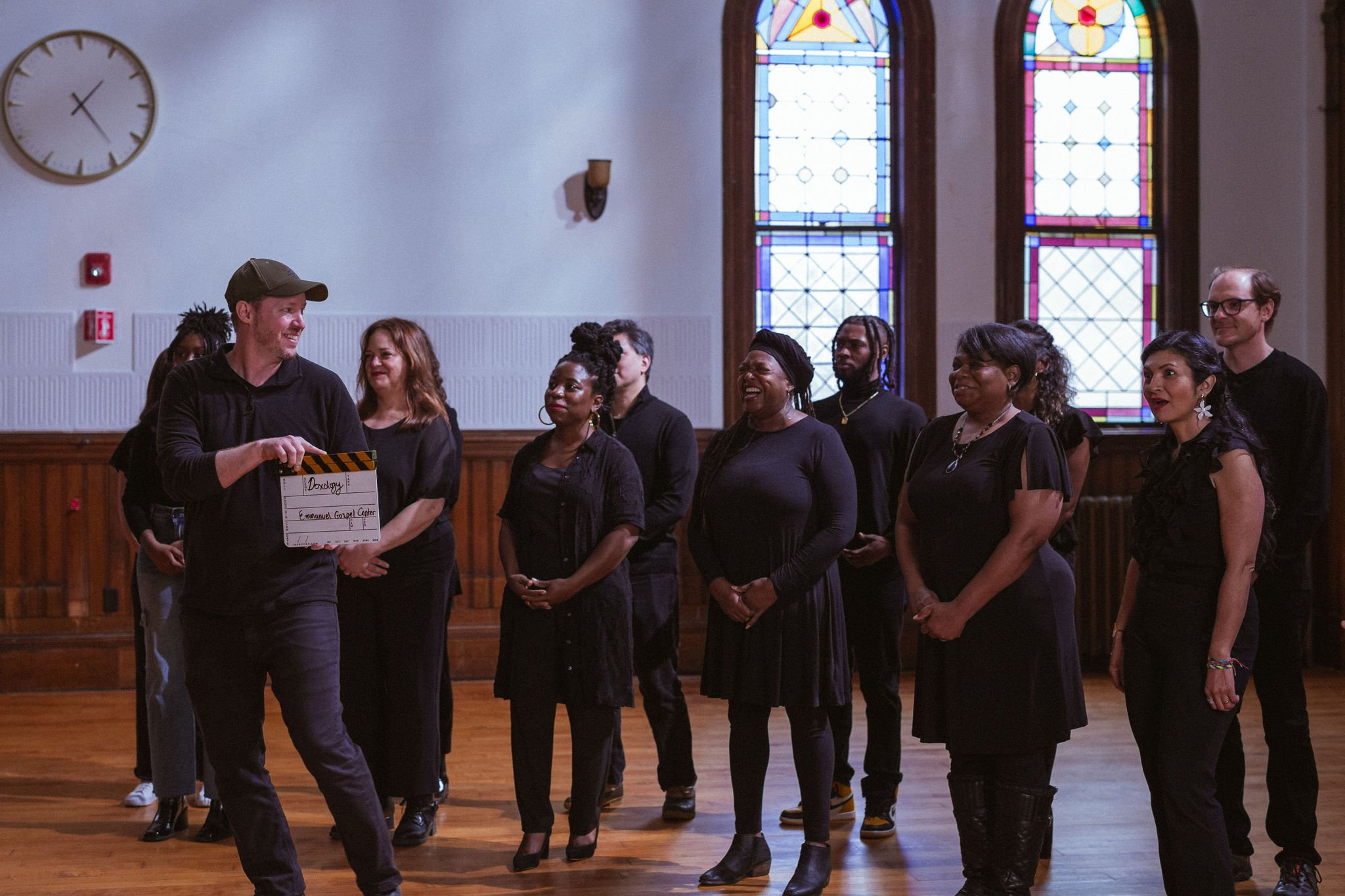
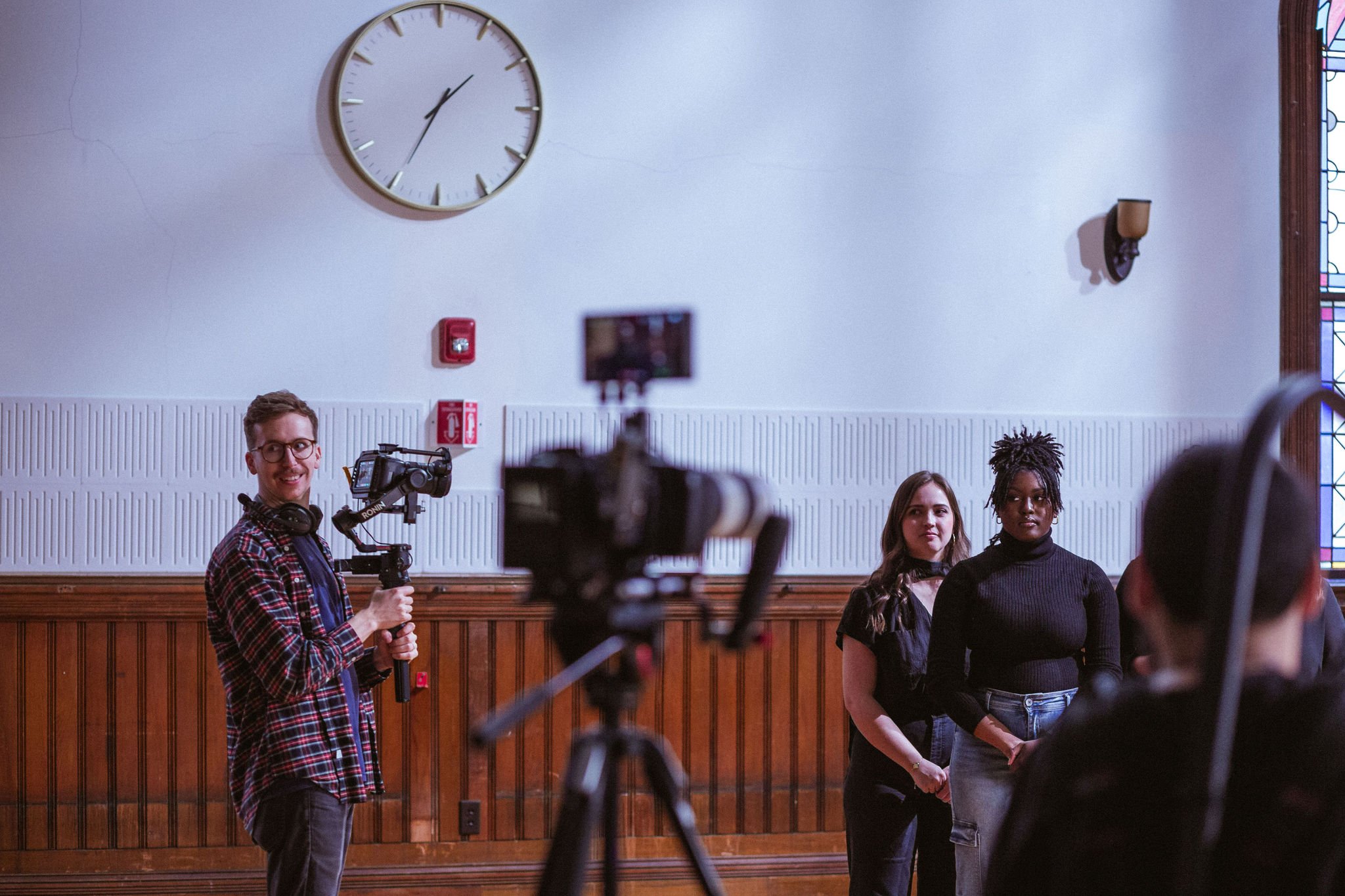
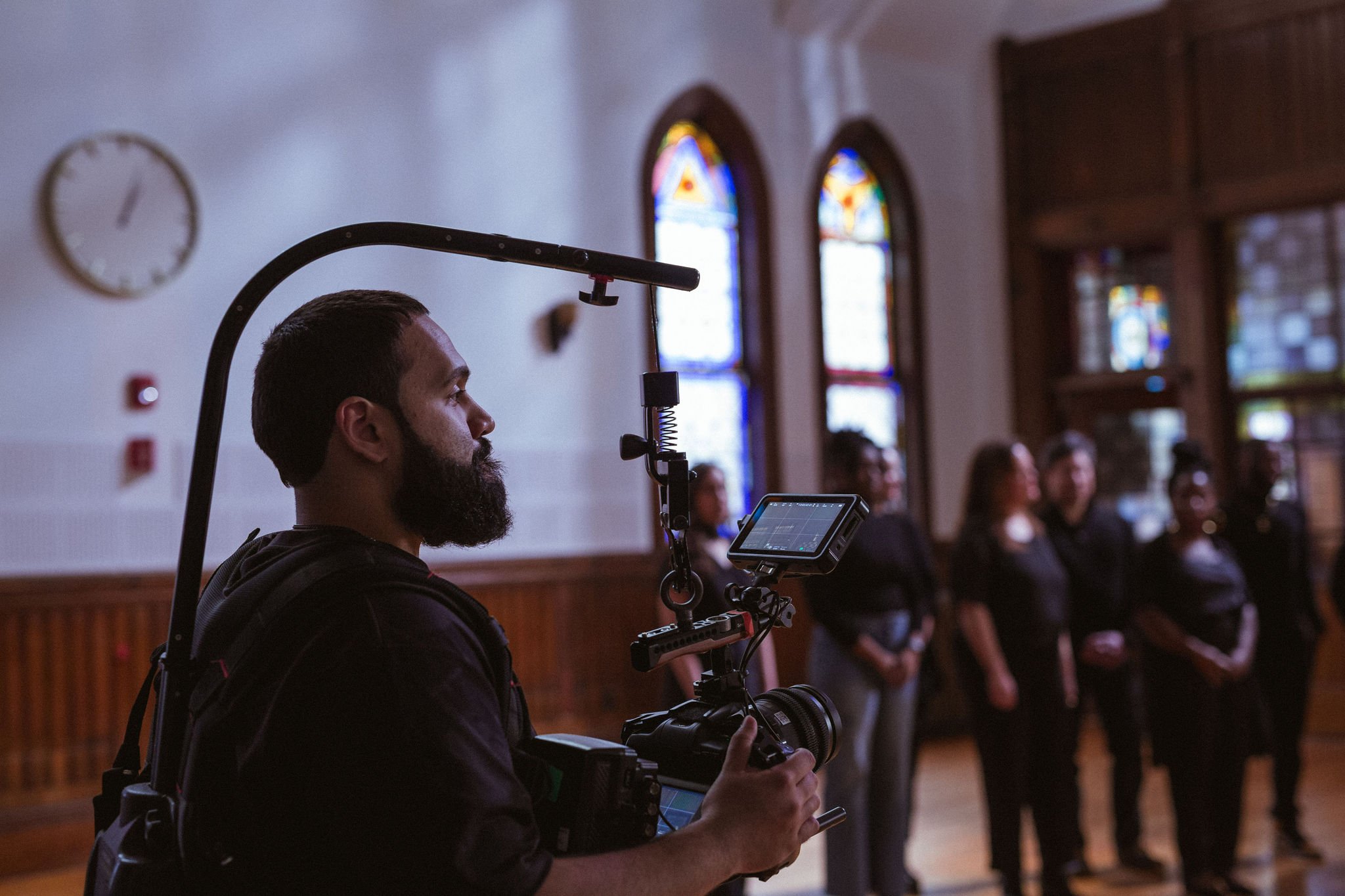
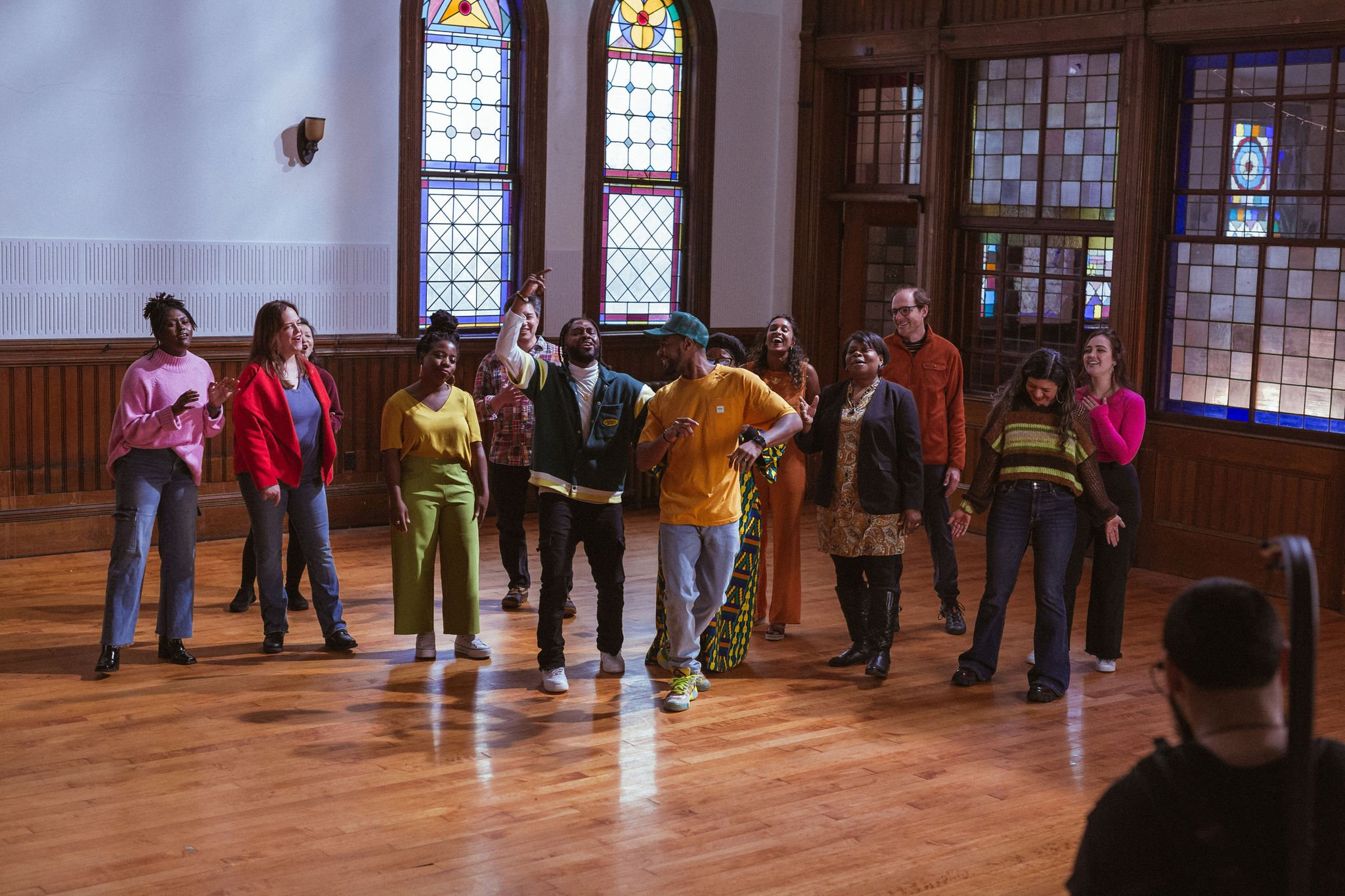
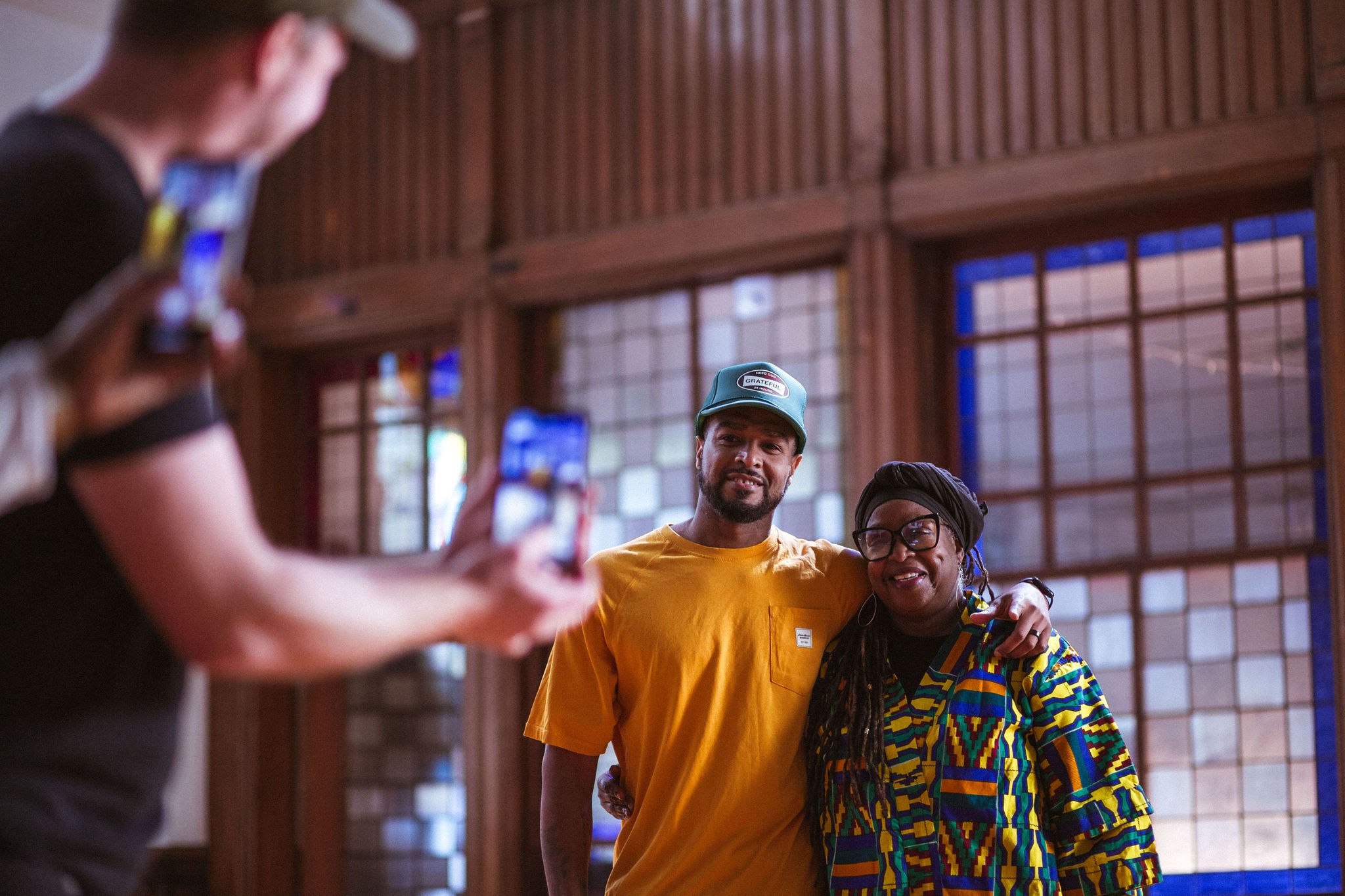
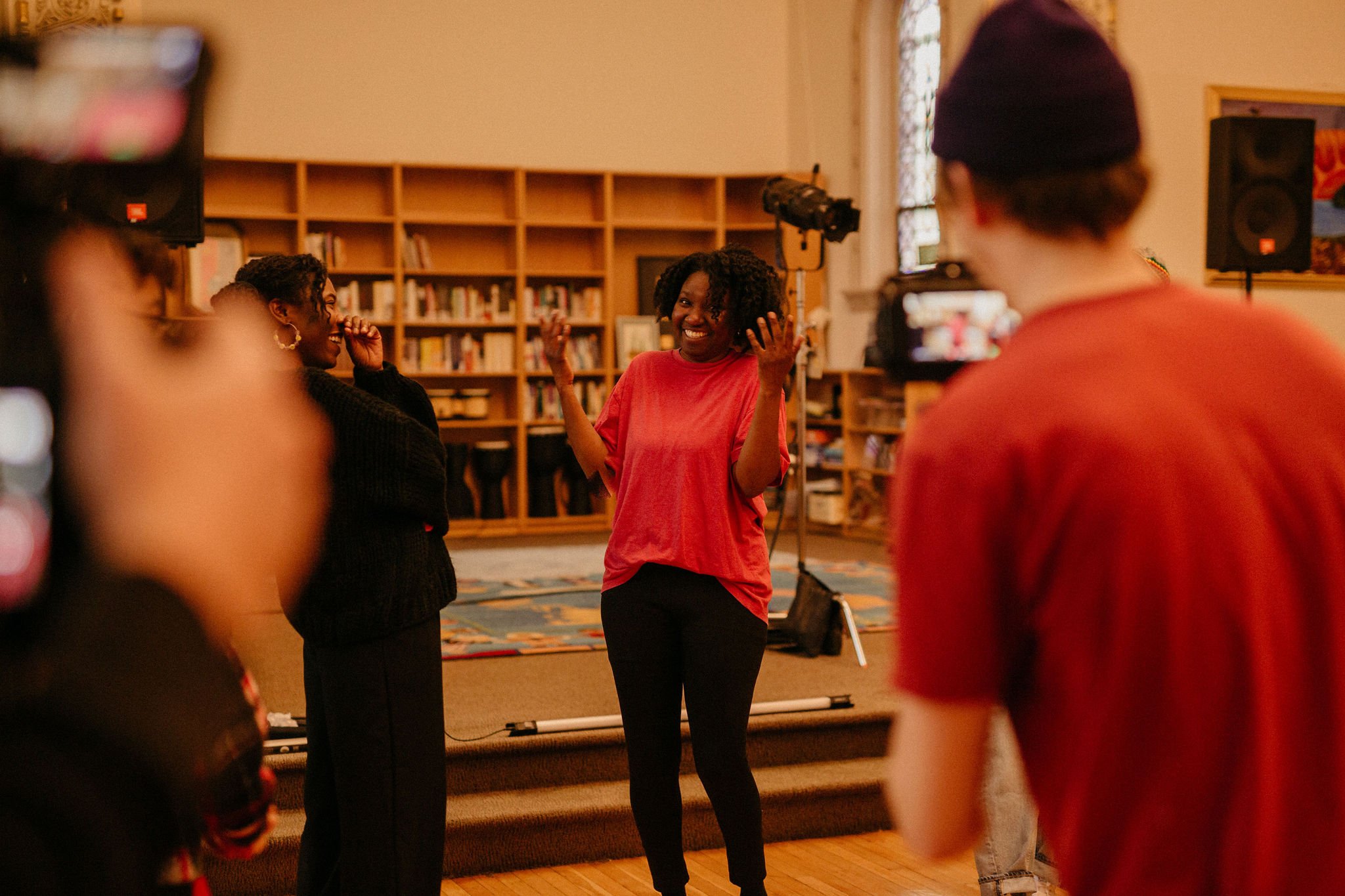
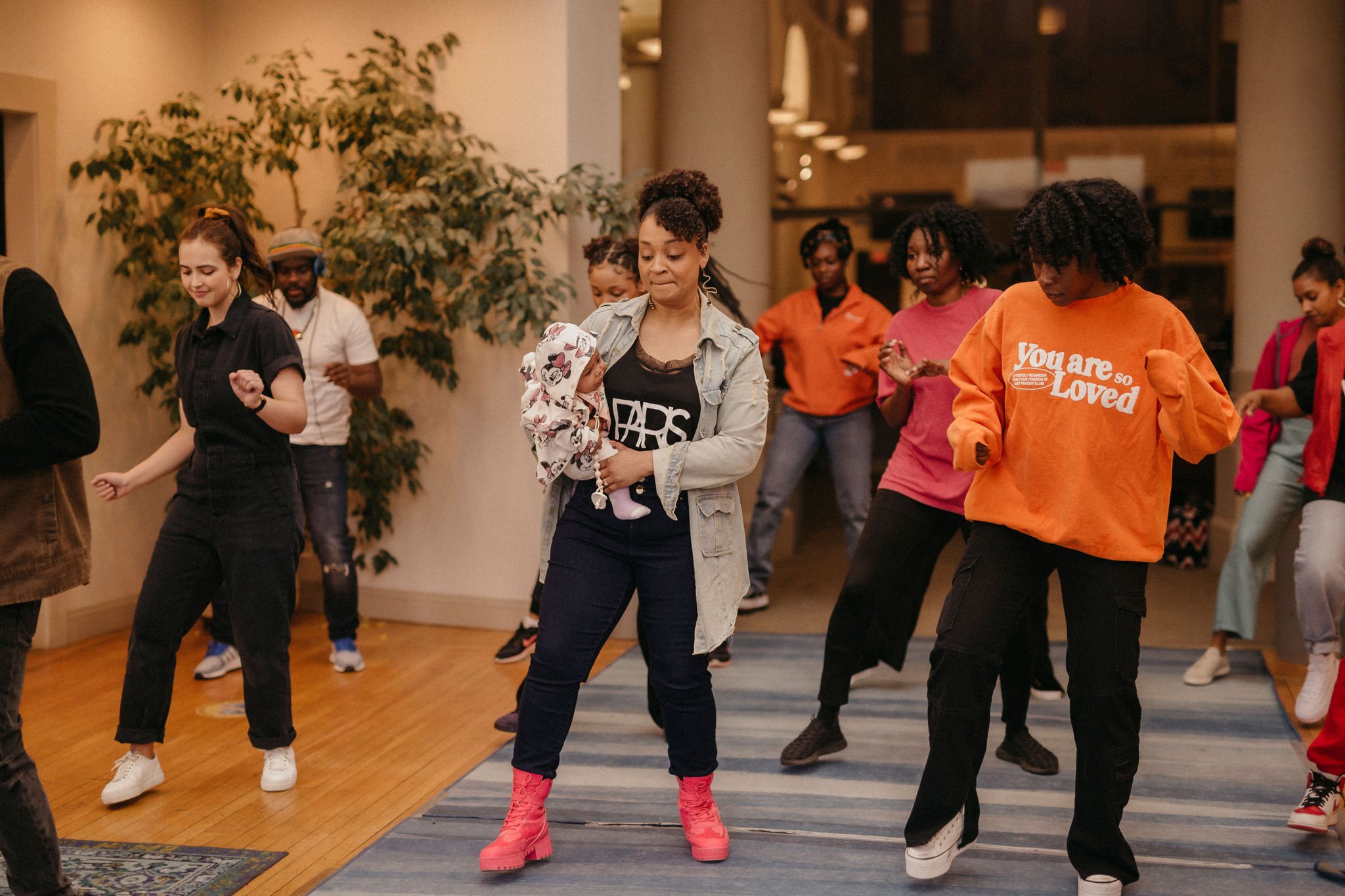
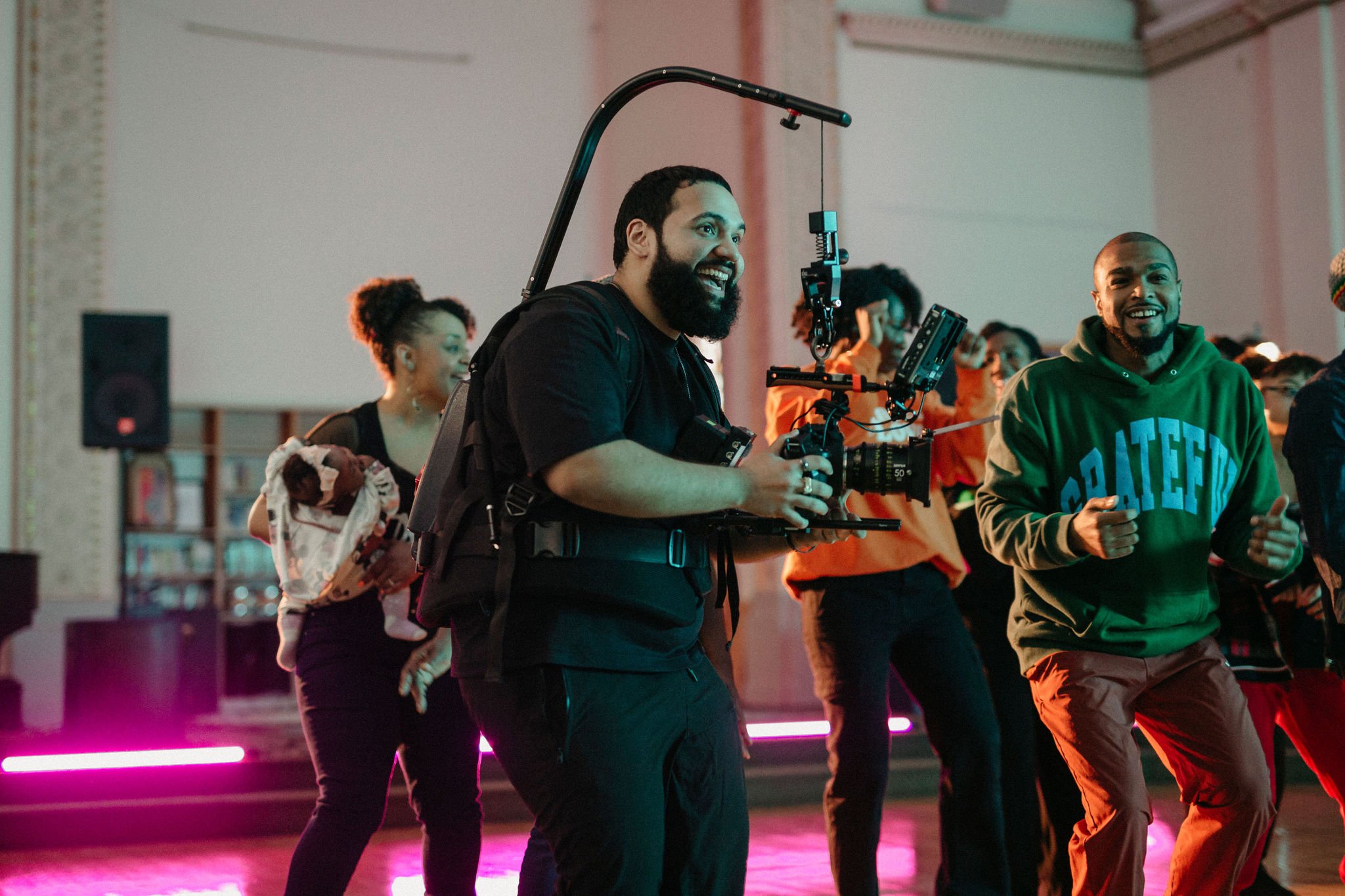
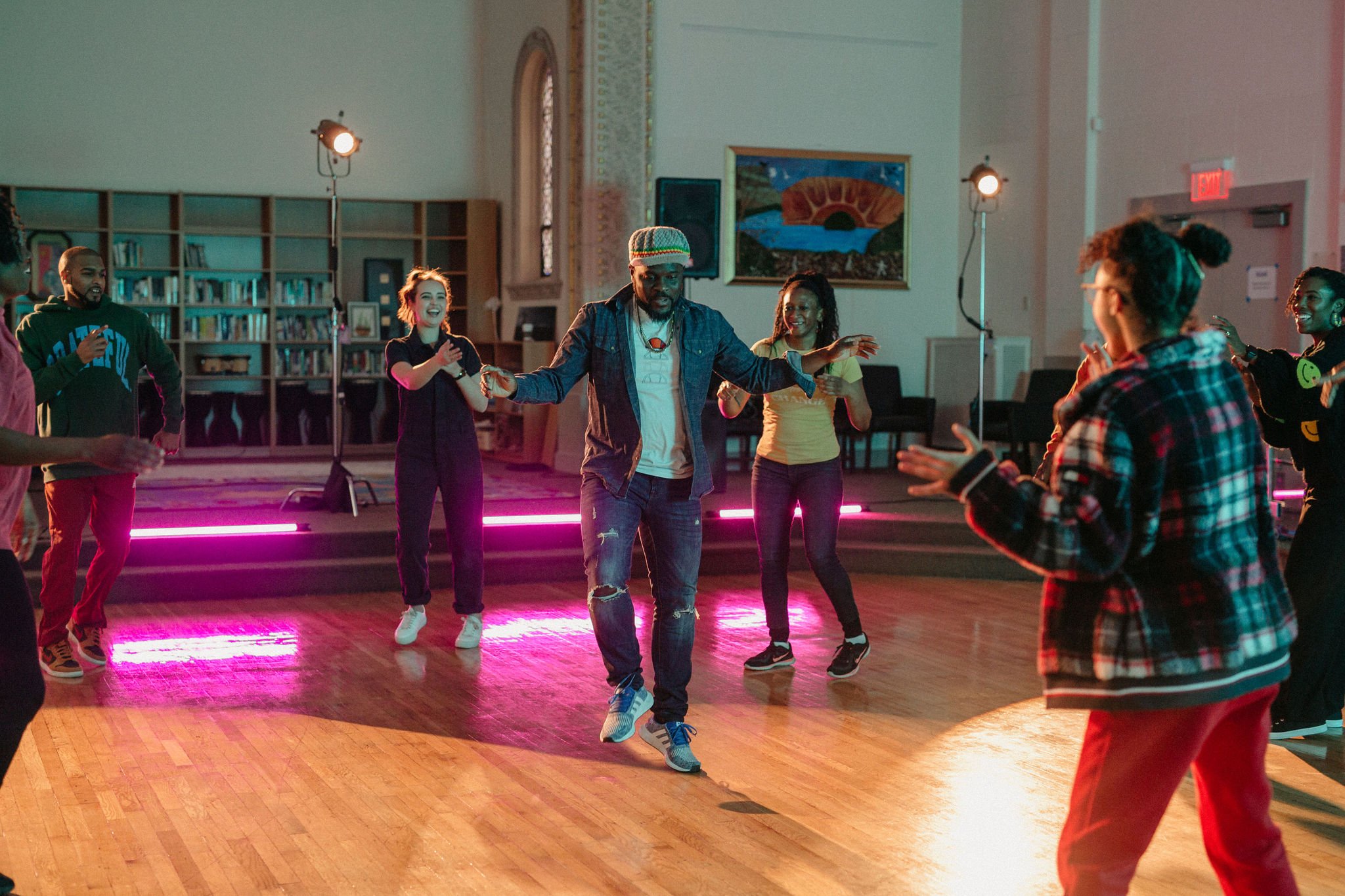
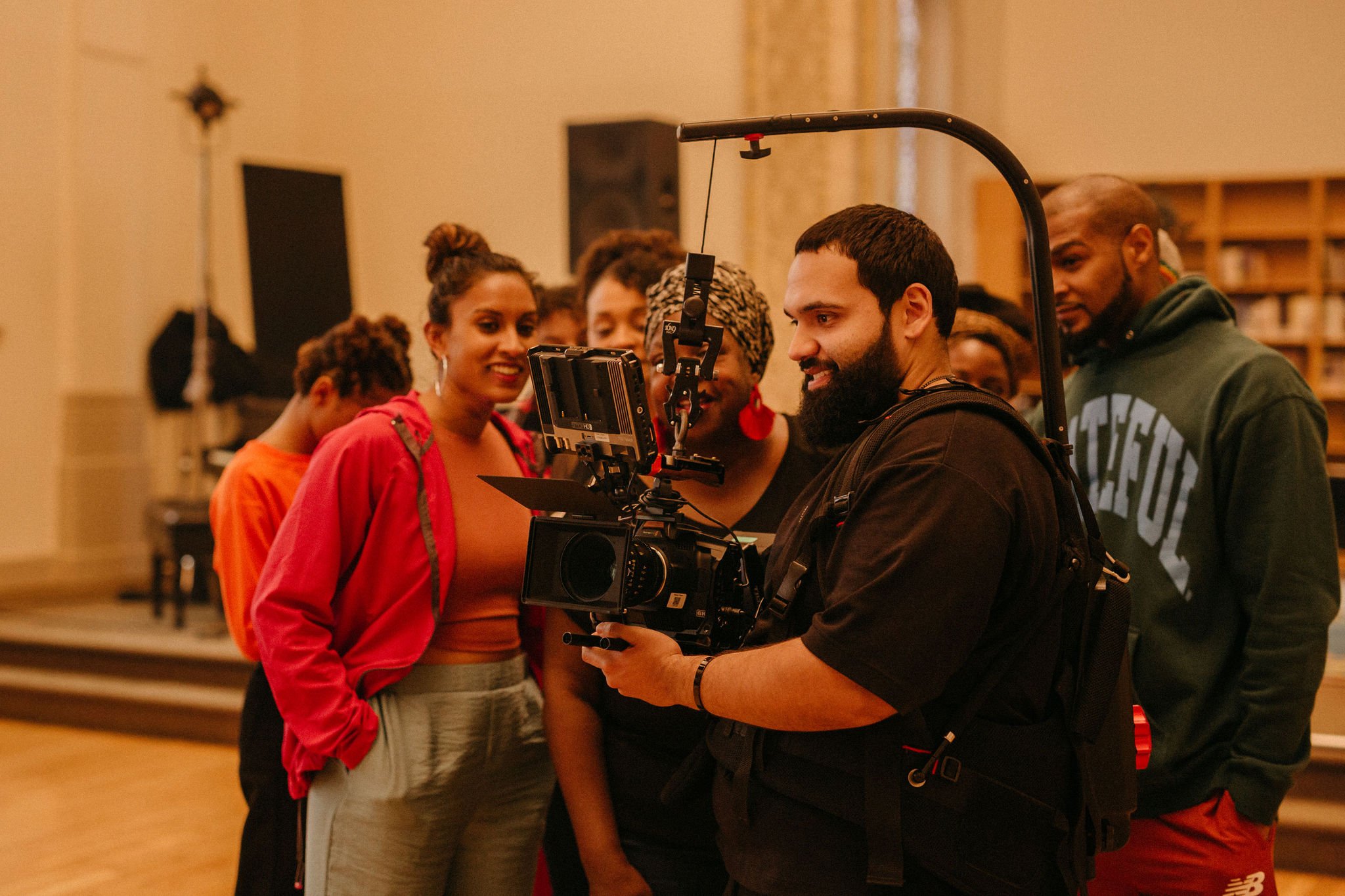
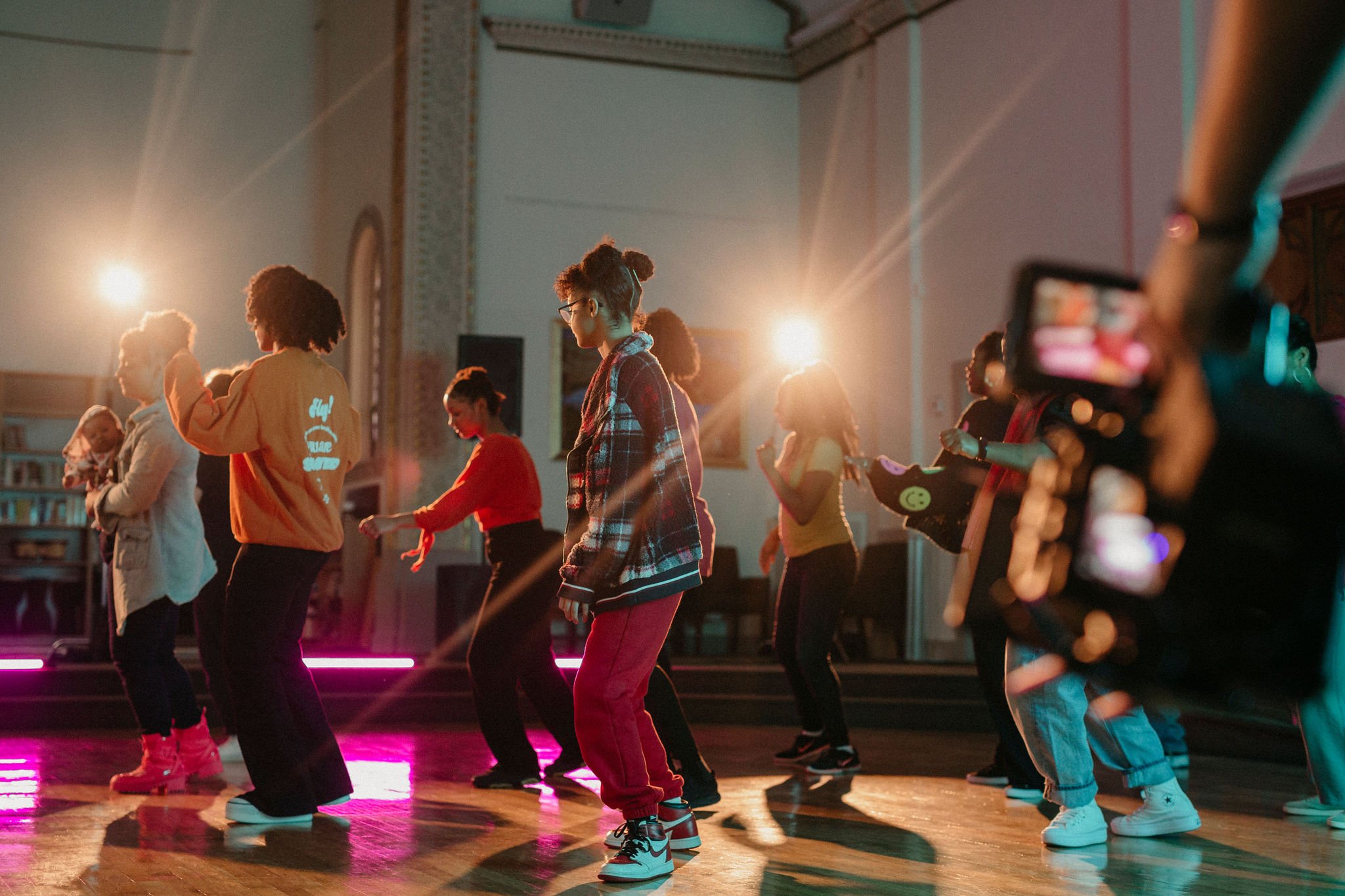



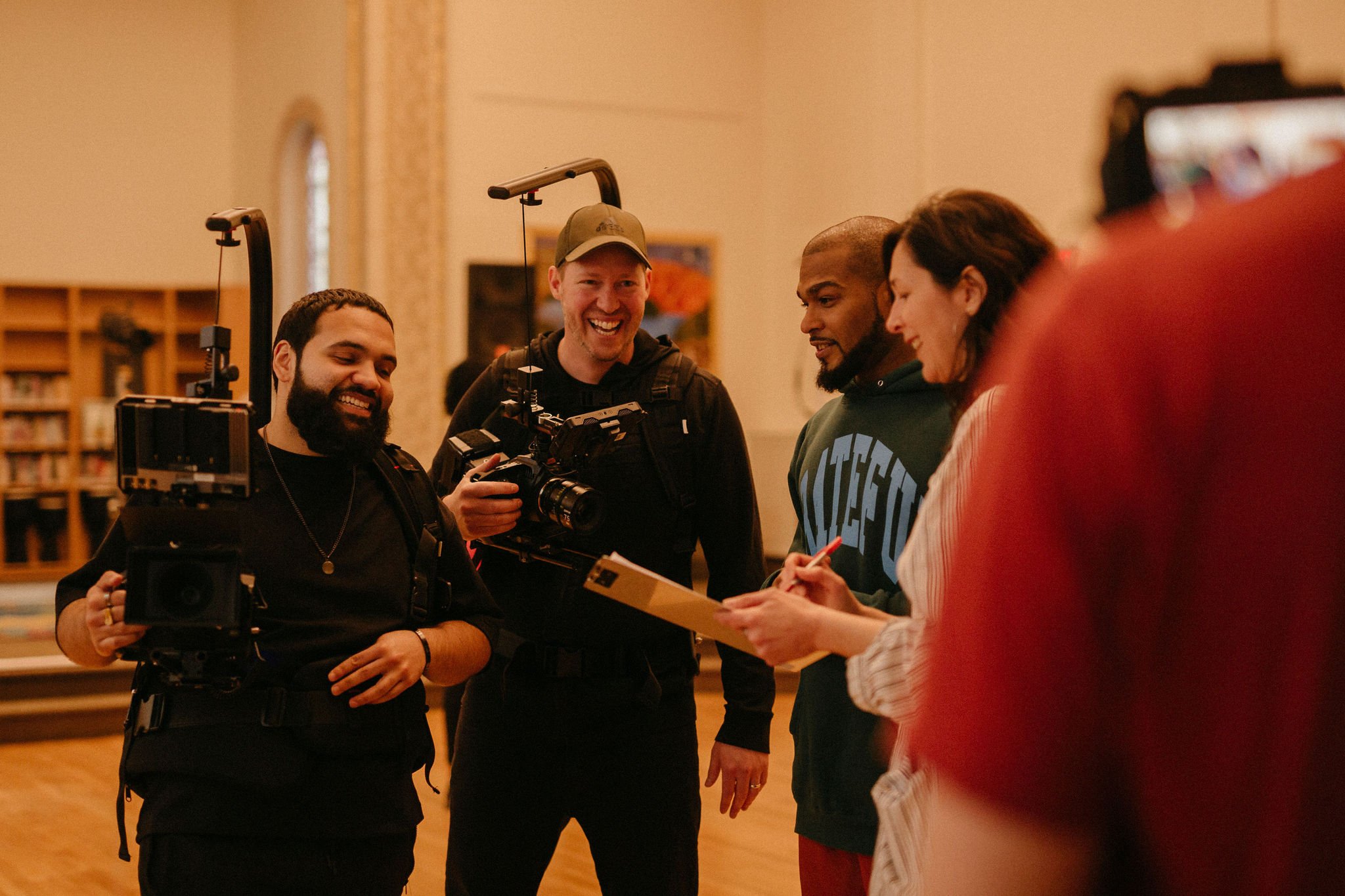
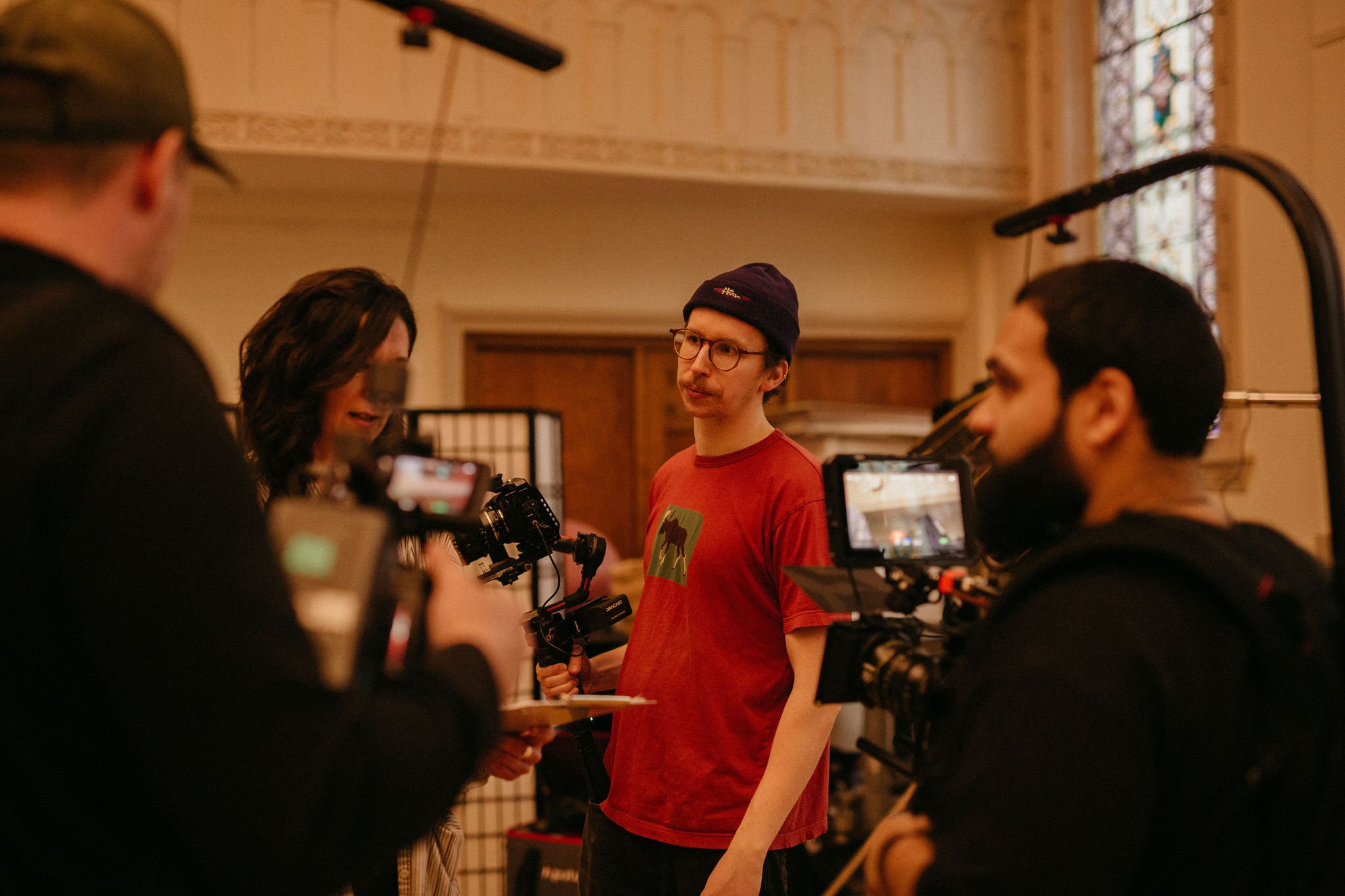
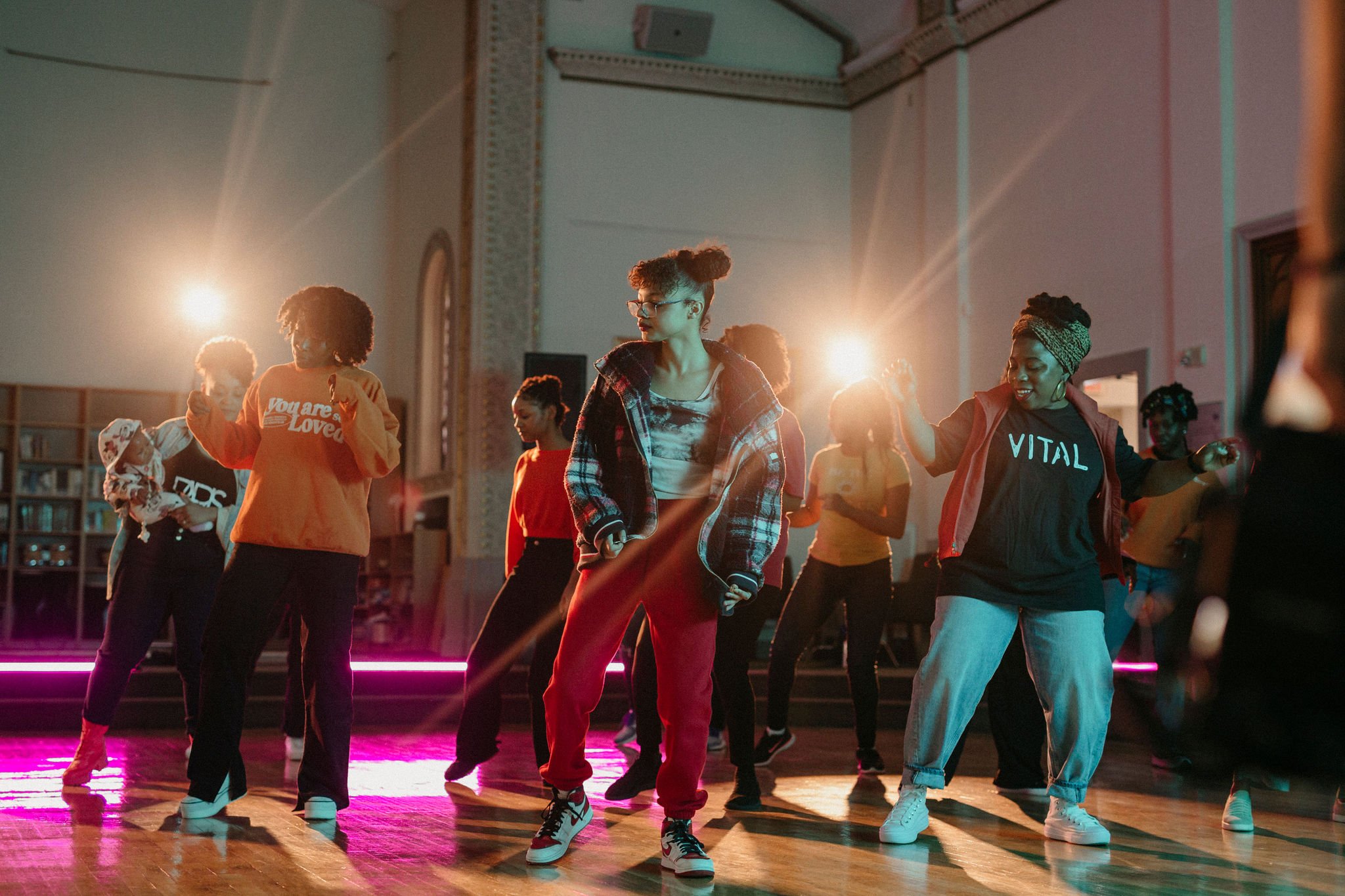

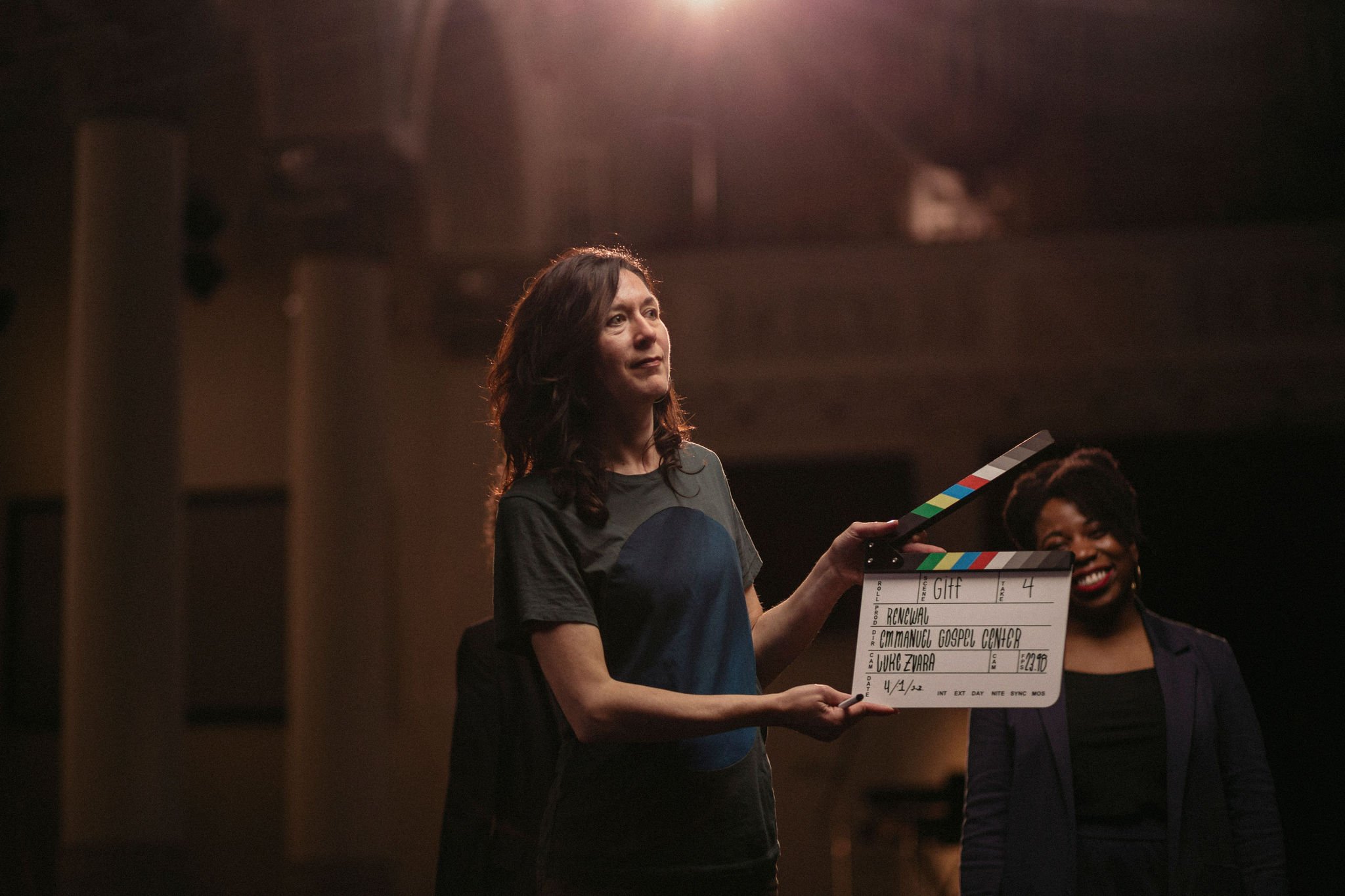

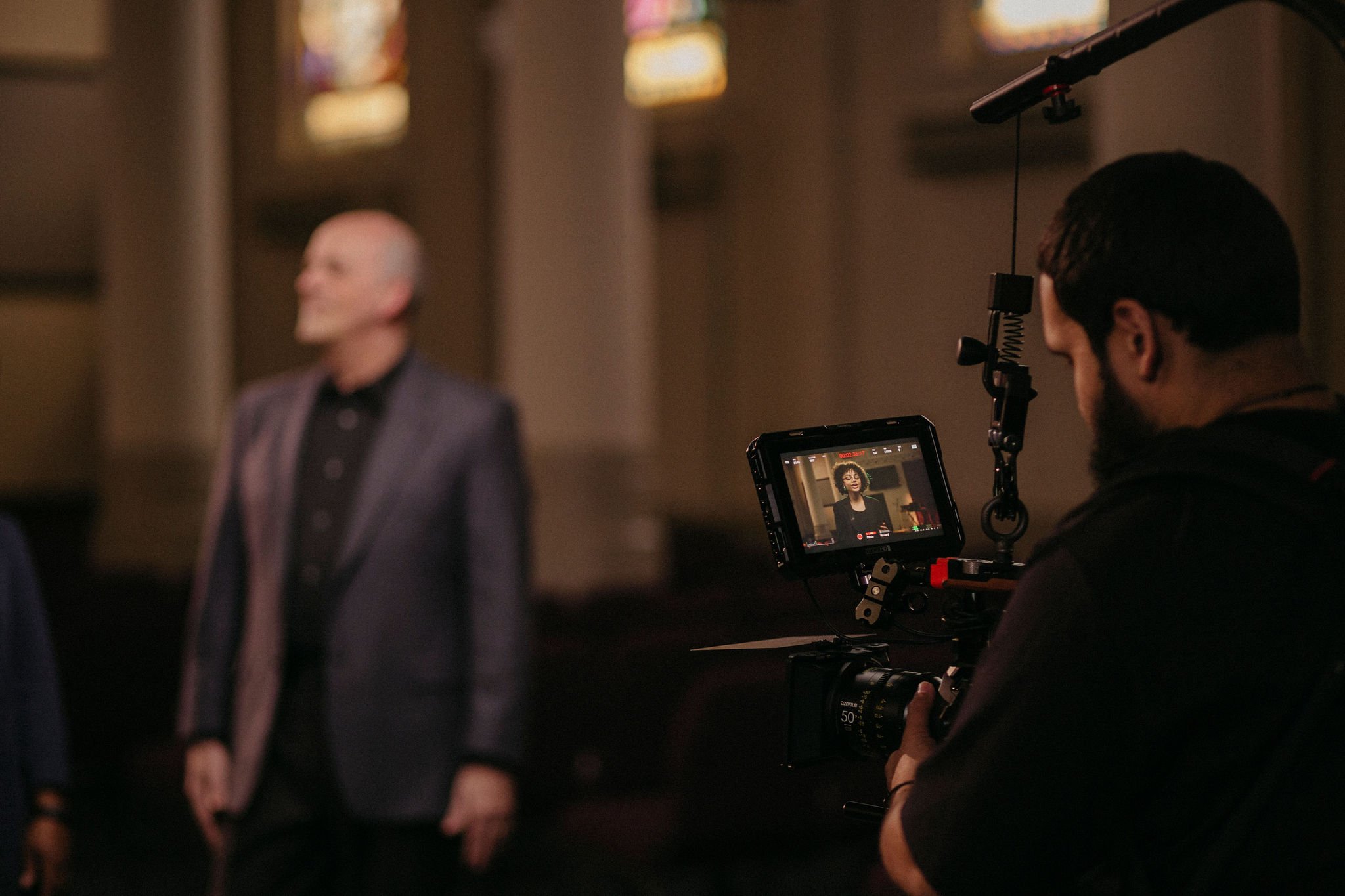
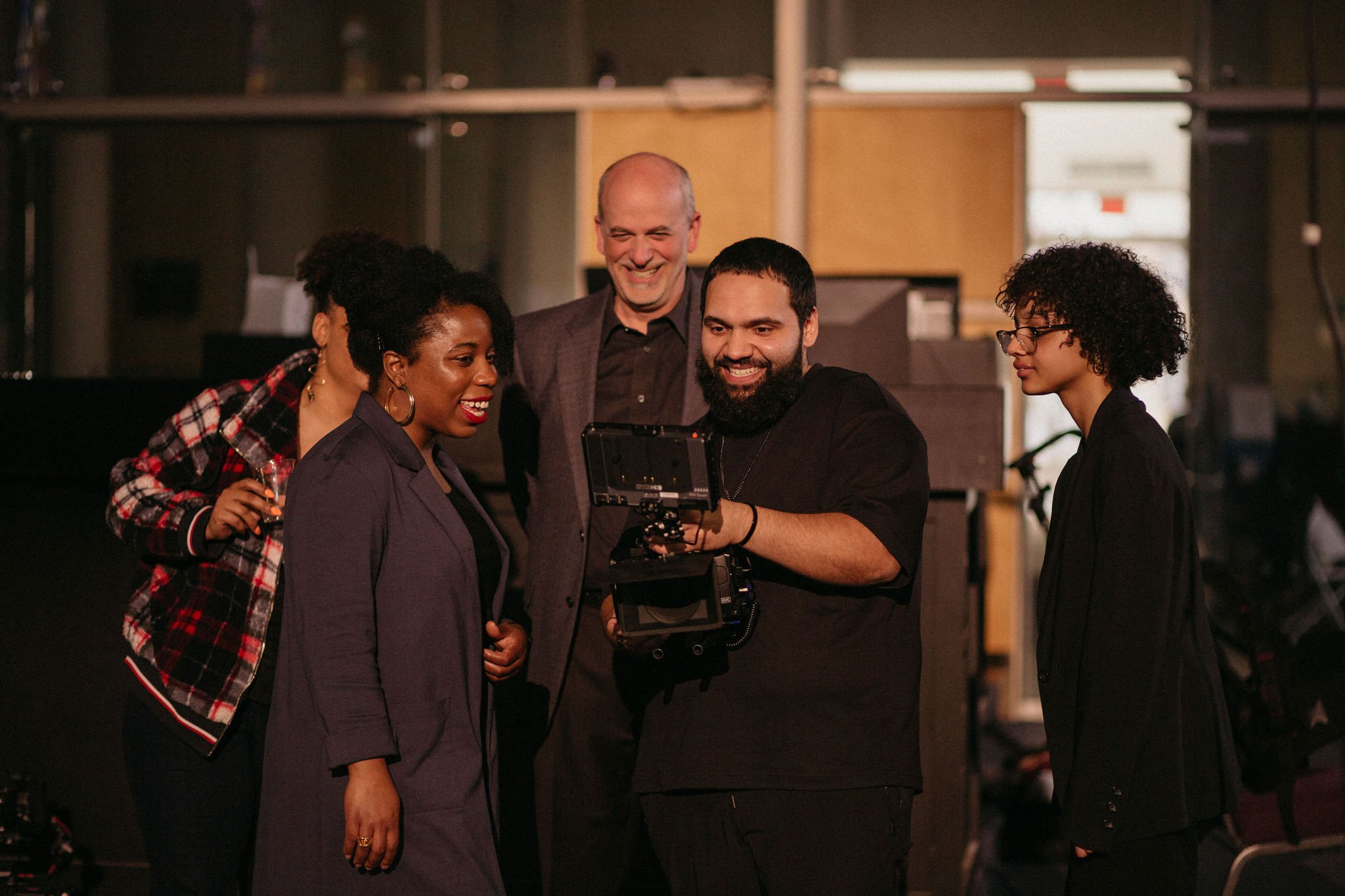
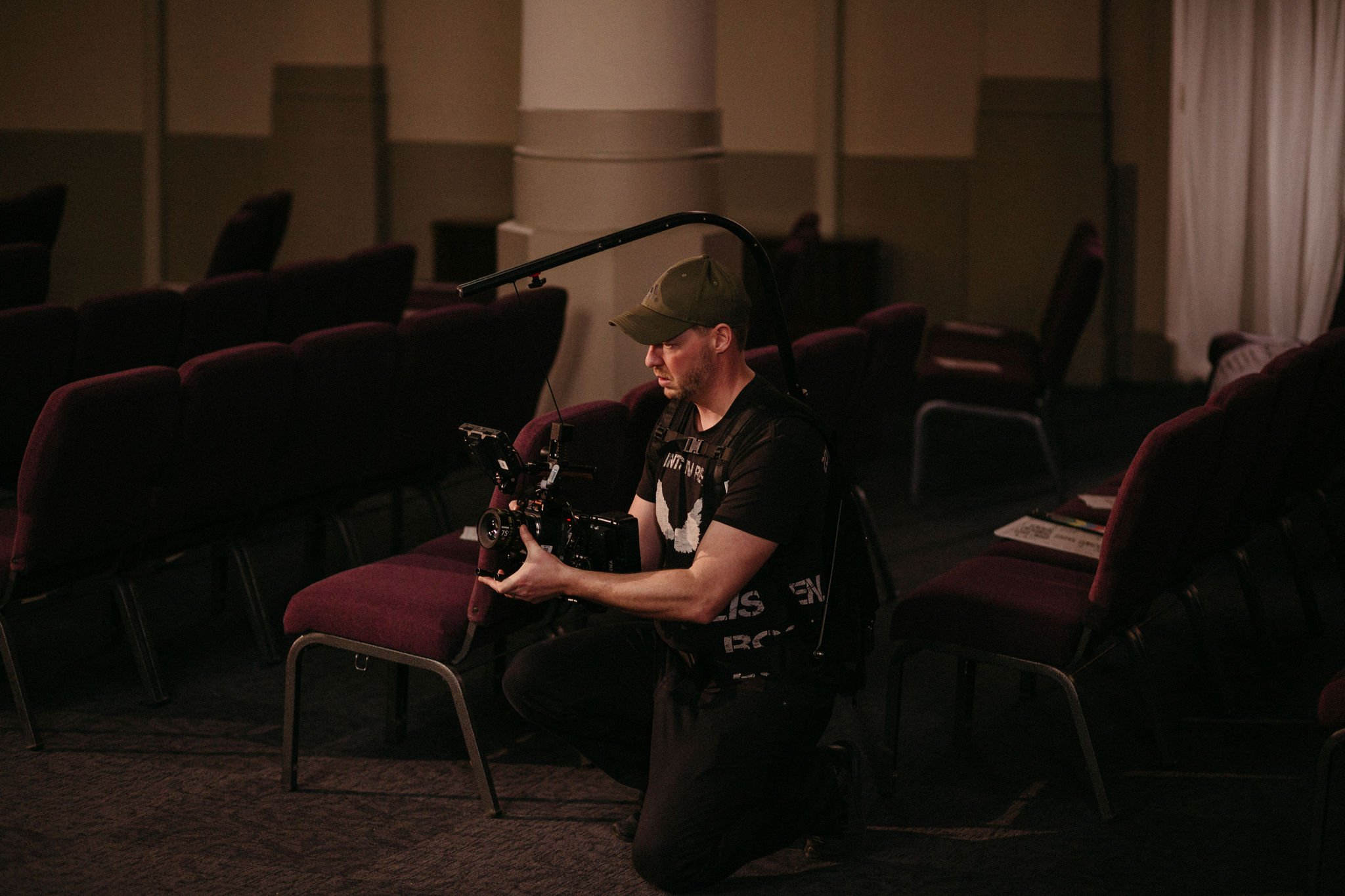
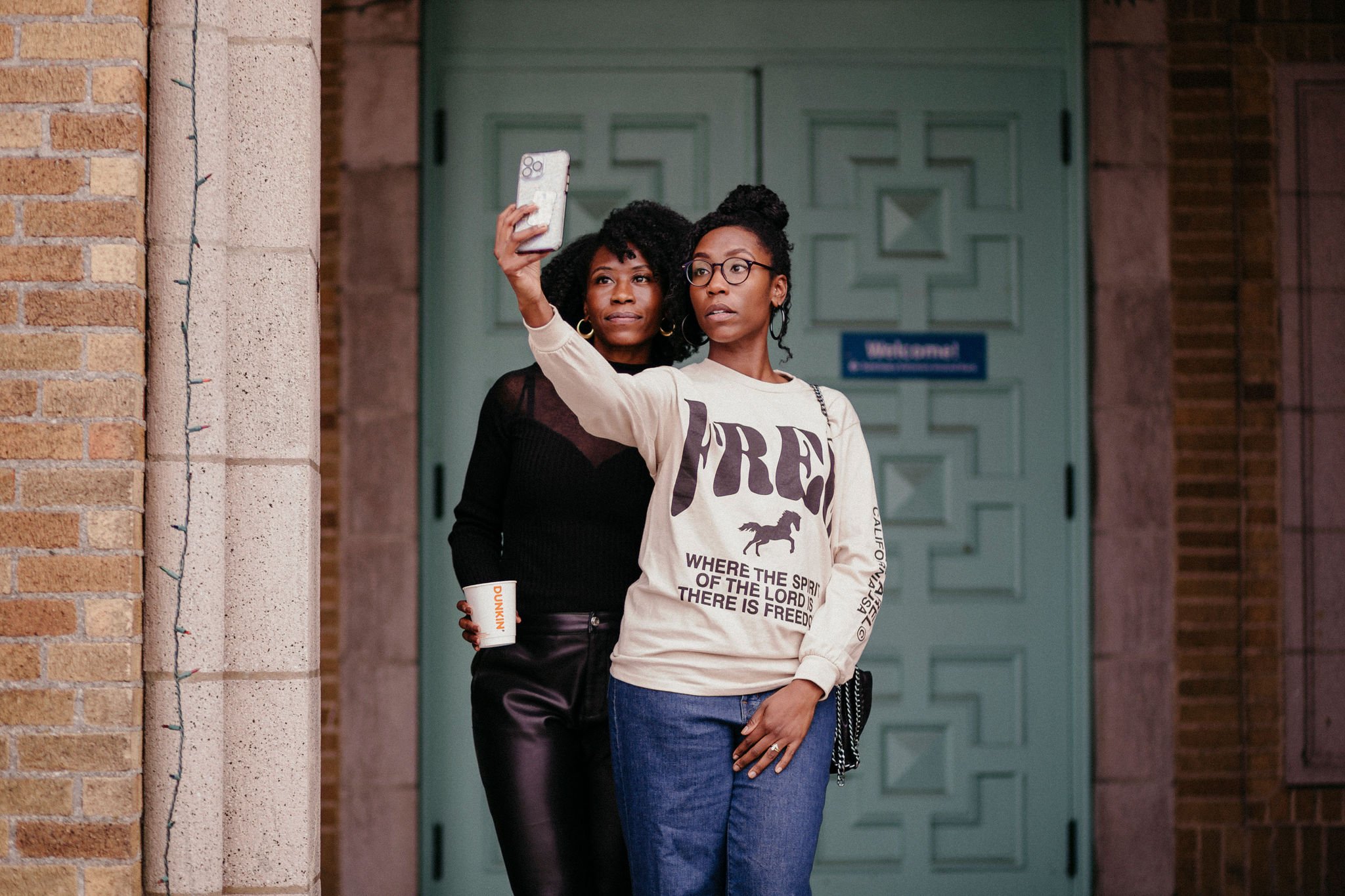
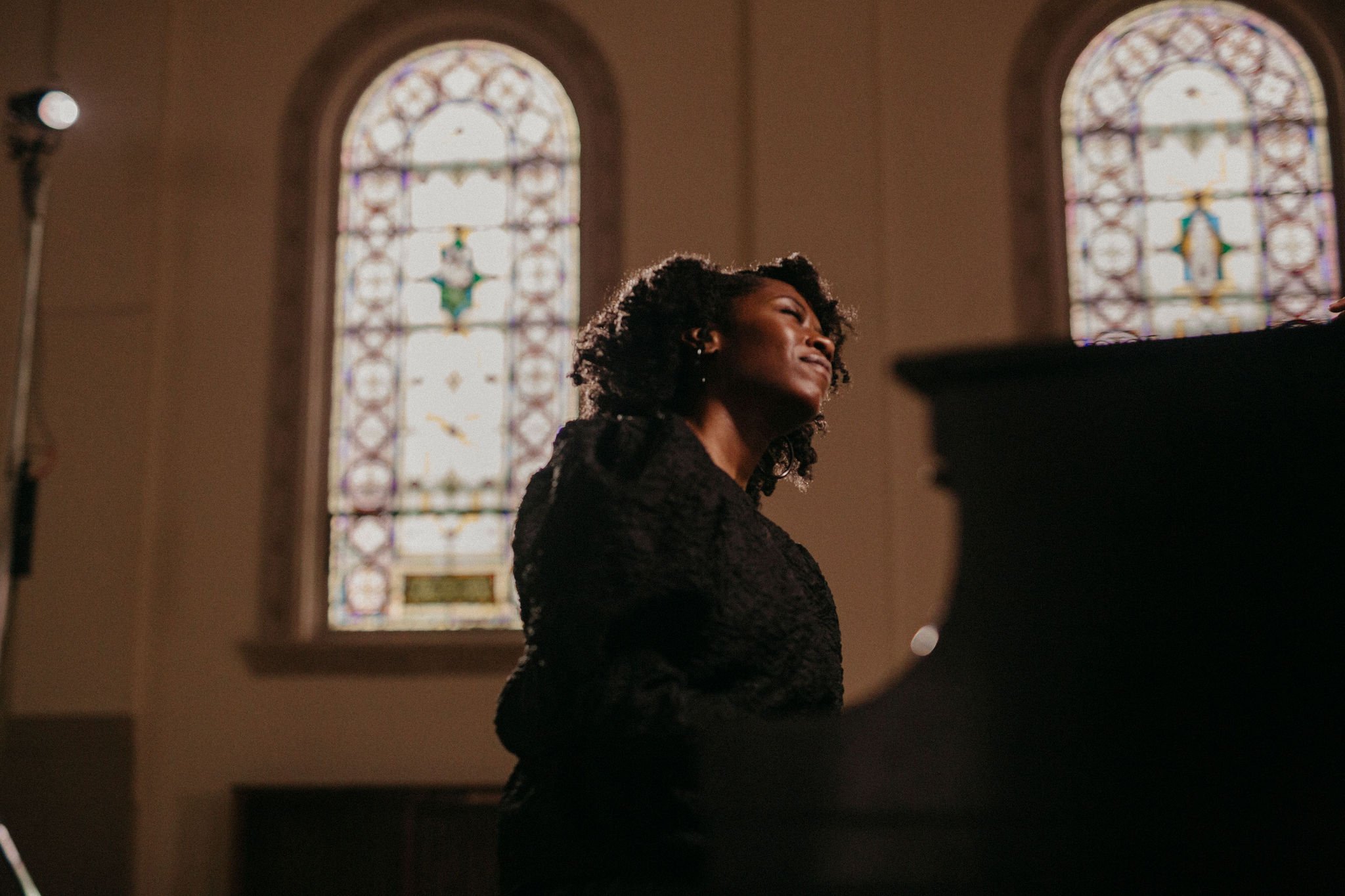

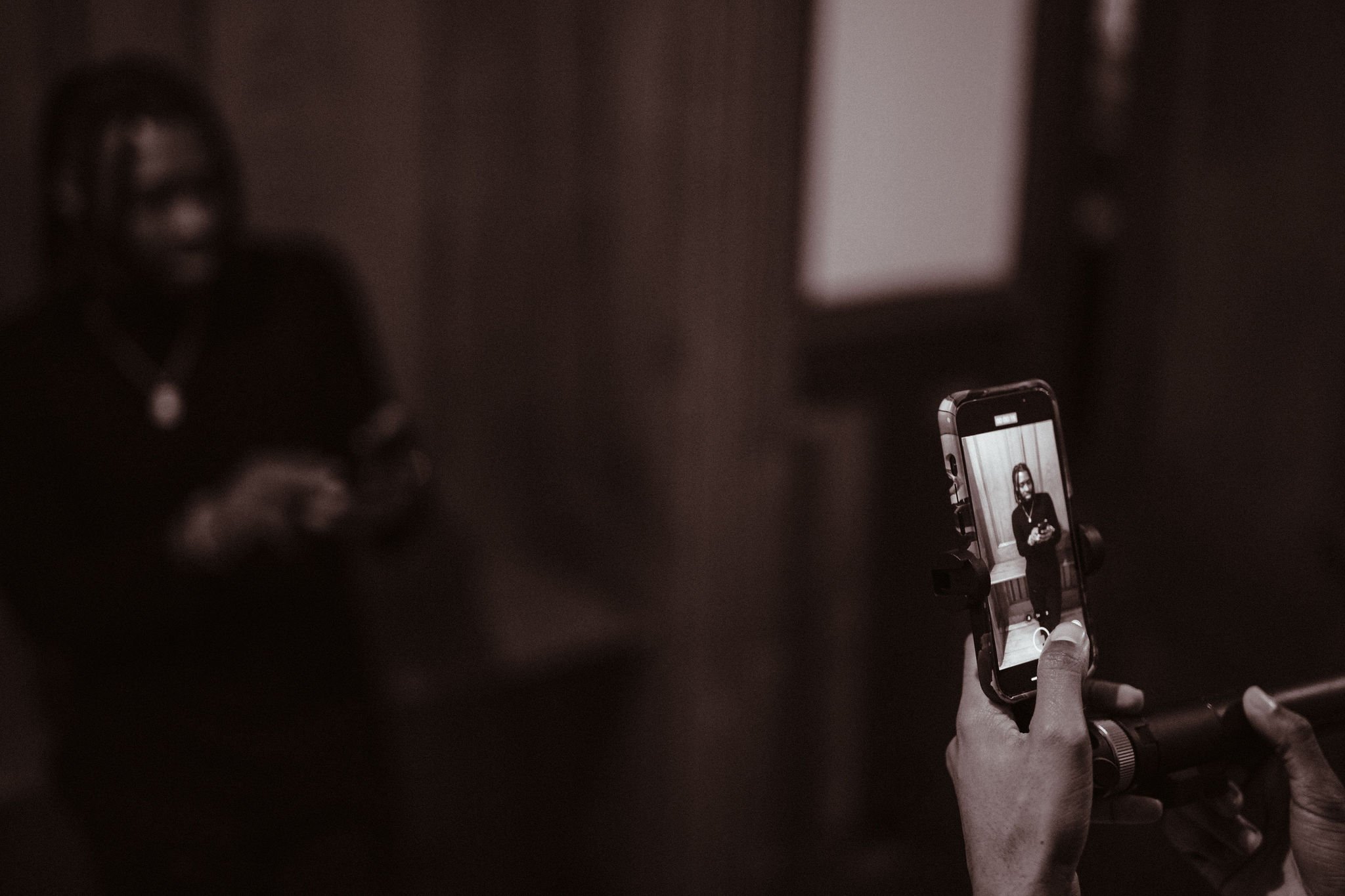
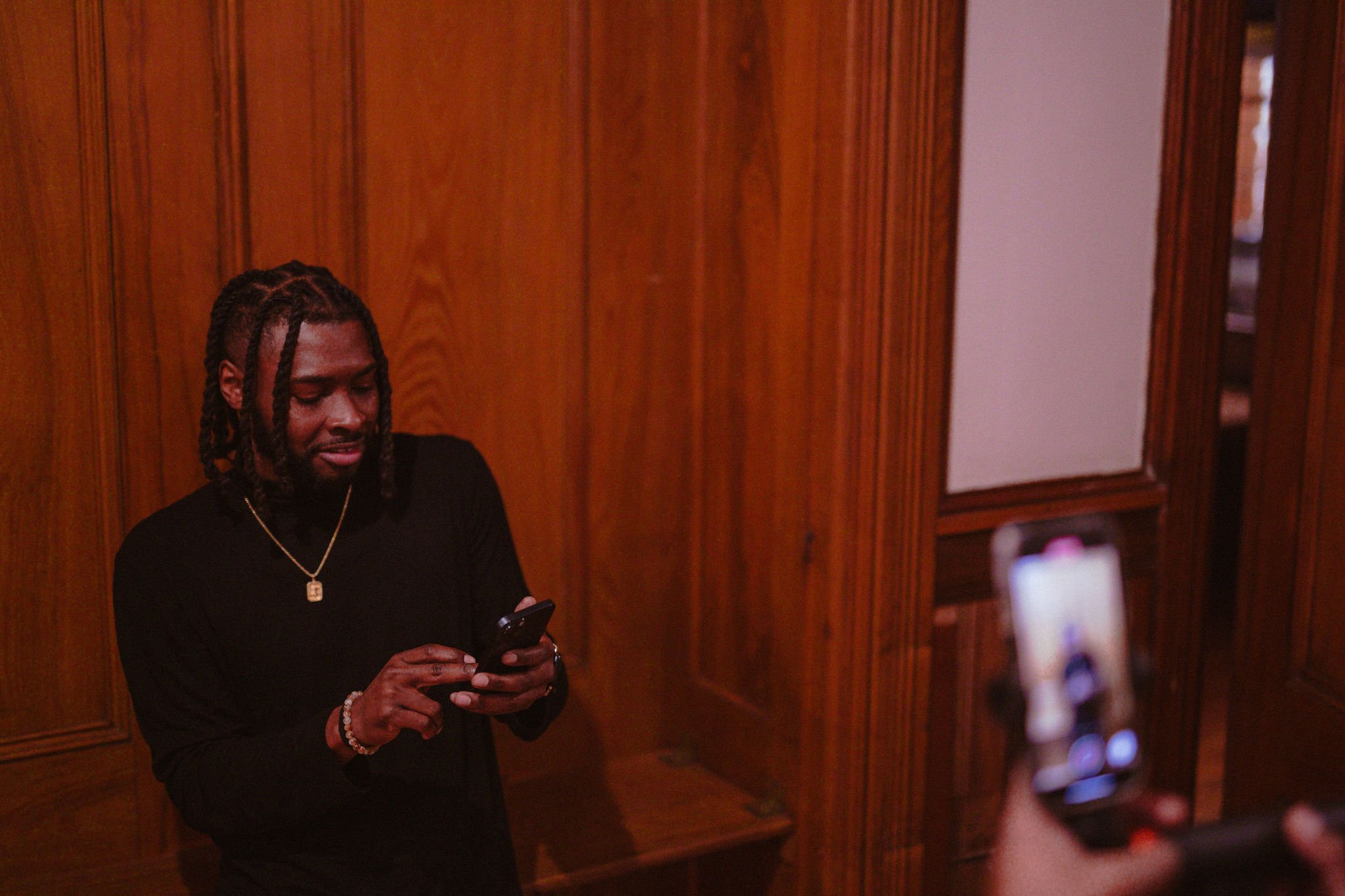

EGC film day in preparation for our annual fundraisers. Photography by Rosa Cabán at R9Foto.
Each year, we partner with different churches, which generously host us as we film content for our next fundraiser.
“It’s yet another point of connection and relationship-building that happens, where these relationships are leveraged and strengthened in the process to create something that will be a blessing beyond that moment,” says Saranya Sathananthan, researcher in residence at EGC. “Every church we’ve filmed in is aesthetically unique, and I do think that being in God’s house contributes to the quality and essence of his presence with us in the moment and in the feel of the final piece.”
Central Square Church’s historic building underwent a renovation in 2020, much like EGC’s fundraisers were remade for the pandemic era.
“Some sayin’ it’s the ending — I think it’s a new beginning.”
Originally the brainchild of Jeff Bass, EGC’s executive director, our annual fundraisers began as dinners hosted by multiple partner churches around the region.
(l-r) Hanna Garcia, Elijah Mickelson, Jalen Williams, Caleb McCoy. Photo credit: Rosa Cabán at R9Foto.
It was important to Jeff that the fundraiser not just raise funds but also advance the Center’s mission in multiple ways.
“I love that EGC’s fundraiser is missional for us,” he says. “It raises money for our work, yes, but it also invests in Christian creatives, provides a significant connecting opportunity for Christians throughout Greater Boston, and worships God by celebrating some of the ways we see Jesus at work in our city.”
Over time, we consolidated the fundraiser to one location. For several years, we held the event at Florian Hall in Dorchester or Jubilee Christian Church in Mattapan. (EGC staff members still have flashbacks of cleaning the expansive sanctuary with a household vacuum cleaner before resetting all the chairs for the next Sunday’s worship services.)
Then came the pandemic, and like everyone else, we had to pivot. Our 2020 fundraiser consisted of a single video, “Cry Out,” which included Caleb McCoy’s prophetic line, “Some sayin’ it’s the ending — I think it’s a new beginning.”
That meant rethinking our approach to content and gathering as a community.
“God has made us as individuals with different gifts that come to make up and culminate in the whole body. When we collab, we truly honor ourselves, we honor God, and we also bless others.”
Even before the pandemic, we had been moving away from presentations to embrace the diverse gifts of our staff members and ministry partners, adopting more creative content expressions.
But our next fundraiser marked a clear separation from the past. The pandemic was the first time we began working with local artists in a consistent, professional capacity, and we created a hybrid in-person and virtual concert event that resembled a drive-in movie theater experience.
Caleb, EGC’s marketing manager who wrote and performed “Cry Out,” says it’s a beautiful thing to collaborate with talented artists, dancers, filmmakers, musicians, poets, photographers, and singers.
“This has strengthened relationships among the Christian creative community, and continues to be a blessing in the city,” he says. “And to think, this largely came out of the chaos of COVID, when many artists shared the same uncertainty with their vocation and expression. It just shows how God continues to make beauty from ashes.”
Jen Aldana, singer, songwriter, and worship leader. Photo credit: Rosa Cabán at R9Foto.
For EGC staff, friends, and ministry partners, it’s a deeply meaningful experience.
“I am inspired by this unique space where filmmaking, art, and church community blend together to create something beautiful and sacred,” says Hanna Garcia, development manager at EGC.
“God has made us as individuals with different gifts that come to make up and culminate in the whole body,” says Giovanni Acevedo, poet, photographer, and filmmaker. “When we collab, we truly honor ourselves, we honor God, and we also bless others.”
“Performing and participating in EGC’s fundraiser event was an incredible blessing!” says Jen Aldana. “As a Boston-based artist, it was special to see my work come to life in a new way by creating an acoustic version of my song ‘Trust in You’ — a song about trusting in God through every season, with EGC’s vision. They stand true to their mission by incorporating the arts and empowering and uplifting others. . . It was truly a blessing to take part in.”
“As a Boston-based artist, it was special to see my work come to life in a new way.”
Each film day is a unique opportunity to connect with these artists. Saranya says she was blessed to catch up with them and hear about the latest in their lives.
Saranya Sathananthan. Photo credit: Rosa Cabán at R9Foto.
“It’s beautiful to see believers with different skills and active expressions of faith come together and contribute to something that uniquely demonstrates those talents and heartfelt stories while also reflecting a bigger picture of our amazing God and all he can do through those whose lives are surrendered to his purposes,” she says. “I left the time feeling full of joy.”
That joy sees the team through what can sometimes be a messy process of making the sausage.
“There’s a bit of chaos and feeling that spike of adrenaline, especially for those who are keeping track of the schedule, managing the equipment, and helping with all the logistics that are involved in making it happen,” Saranya says. “All these are things that you don’t really get a grasp of in seeing the final piece.”
Saranya says she’s wrestled with the filming process. It doesn’t always feel like a natural worship experience with all the bright lights and lidless, one-eyed cameras staring you down.
“But I’ve been surprised at how the Spirit often moves even in the constrained settings we often film under,” she says. “There was definitely a moment when our EGC choir was singing the Doxology together, hearing our voices magnified through the acoustics in the room, with Pastor Larry [Kim] and Laura [Mitchell] watching and singing along, that I felt like this was my sincere thanksgiving and worship to the Lord. I was grateful to be there with everyone amidst the non-stop laughter and great energy that was created together.”
As Saranya says, we hope this joyful creation and artistic expression “speak truth and encouragement to people in our collective moment and are also often timeless for those moments of needed encouragement.”
You can watch the concert anytime by subscribing to our YouTube channel.
The EGC board, staff, and friends choir at our 2024 film-day shoot. Photo credit: Rosa Cabán at R9Foto.
EGC’s (Inaugural) Shalom-Seekers Book List
Which books help you pursue the shalom of the city and the glory of God? Here are some titles that have contributed meaningfully to our shalom-seeking in Boston.
EGC’s (Inaugural) Shalom-Seekers Book List
Liza Cagua-McAllister for EGC staff
The Emmanuel Gospel Center (EGC) exists to catalyze kingdom-centered, systemic change for the shalom of the city and the glory of God. If you are also on this amazing mission, our staff recently put together a list of books that have influenced and helped us along this challenging journey!
We asked our team: What books from diverse authors have you read that have contributed meaningfully to your shalom-seeking in the urban context? Why were these books significant to you?
Submissions ranged from systems thinking primers to books on racial healing, from urban ministry classics to challenging new works less than a year old. From the 28 books mentioned by our team, we selected about a dozen to display in our EGC breakroom. Here are a few of those noteworthy titles, with staff comments.
“I find this book important for shalom-seeking in the urban context because... ”
A Multitude of All Peoples
A Multitude of All Peoples: Engaging Ancient Christianity's Global Identity by Vince L. Bantu (2020)
In order to know where we are headed, we need to know where we’ve been. Dr. Bantu — a former EGC staff member — brilliantly challenges Western mental models and makes the case for how the Church’s very foundation is multicultural.
Buried Seeds
Buried Seeds: Learning from the Vibrant Resilience of Marginalized Christian Communities by Alexia Salvatierra and Brandon Wrencher (2022)
Rev. Dr. Salvatierra and Rev. Wrencher glean powerful learnings from faith communities facing brutal challenges and evidencing tremendous power and imagination! From these historic movements, they offer present-day applications to different audiences, which is very helpful given urban shalom-seekers’ diverse experiences and social locations.
The Color of Compromise
The Color of Compromise: The Truth about the American Church’s Complicity in Racism by Jemar Tisby (2020)
Dr. Tisby offers an eye-opening and thoughtful account of how the Church has been complicit in creating and maintaining the unjust structures of systemic racism in America. This is an important book for understanding one of the key issues of our times.
Ecosystems of Jubilee
Ecosystems of Jubilee: Economic Ethics for the Neighborhood by Adam Gustine and José Humphreys III (2023)
The authors richly engage Scripture to address the relationship between justice and economics, which is so central to making things right in our world. We can’t really live out the gospel without having it reshape our economic ethics, and this is a great beginning!
Seek the Peace of the City
Seek the Peace of the City: Reflections on Urban Ministry by Dr. Eldin Villafañe (1995)
Dr. Villafañe applies the “Jeremiah paradigm” for ministry in the city, laying the biblical and theological groundwork for engaging issues such as violence and reconciliation in the city with the wisdom and truth of God’s word.
Thinking in Systems
Thinking in Systems: A Primer by Donella H. Meadows (2008)
We work in a complex web of interrelated living systems. Understanding systems is fundamental to our work, and this is the classic primer on what systems are and why they matter. It’s a great starting point or great refresher for your systems journey.
Other titles you can find in the EGC breakroom:
Beholding Beauty: Worshiping God through the Arts by Jason McConnell (2022)
Beyond Welcome: Centering Immigrants in our Christian Approach to Immigration by Karen González (2022)
First Nations Version: An Indigenous Translation of the New Testament trans. by Terry M. Wildman with consultant editor First Nations Version Translation Council (2021)
Healing Racial Trauma: The Road to Resilience Paperback by Sheila Wise Rowe (2020)
I Bring the Voices of My People: A Womanist Vision for Racial Reconciliation by Chanequa Walker-Barnes (2019)
The Alternative: Most of What You Believe About Poverty is Wrong by Mauricio Miller (2017)
The Anatomy of Peace: Resolving the Heart of Conflict by The Arbinger Institute (2006)
Come by EGC to borrow one of these copies, check them out at your local library, or purchase them at your local, independent bookstore through bookshop.org!
These books help us pursue the shalom of the city for the glory of God. How about you?
College Ministries and Churches Serving University Students
This guide includes Boston-area Christian campus ministries and a sample of churches serving college students.
Skyler via Lightstock
College Ministries and Churches Serving University Students in Boston
by Rudy Mitchell, Senior Researcher
With its 150,000 students and 35 colleges and universities, Boston has long been known as one of the leading college towns in America. The greater Boston area has about 50 colleges and universities and over 250,000 students. Known as the Athens of America, Boston also hosts many thousands of international students, scholars, and researchers.
Here is a selective guide to some Boston-area Christian campus ministries and a sample of churches serving college students.
If you are a prospective student, parent, youth worker, or advisor, this information can help you find a Christian group or staff worker. If you believe God is calling you into campus ministry, Boston is a strategic area with many opportunities for ministry. If you have a concern to pray for Boston-area campuses, students, and ministries, this guide provides an overview and some information to start with. Current students with questions about God or the Christian faith can use this guide to find fellow students or campus workers to talk to or meet with.
General Campus Ministries
InterVarsity Christian Fellowship (IVCF)
"The purpose of InterVarsity Christian Fellowship is to establish and advance at colleges and universities witnessing communities of students and faculty who follow Jesus as Savior and Lord: growing in love for God, God’s Word, God’s people of every ethnicity and culture, and God’s purposes in the world." — IVCF, Our Purpose
Leadership: Susan Park, Area Director
Contact: newengland@intervarsity.org
InterVarsity has ministries, groups, or staff covering the following campuses: Babson College, Berklee College of Music (including Boston Conservatory), Boston College, Boston University, Brandeis University, Bunker Hill Community College, Harvard University, Massachusetts Institute of Technology (MIT), Massachusetts College of Pharmacy and Health Sciences (MCPHS), New England Conservatory, Northeastern University, Radcliffe College, Tufts University, and the University of Massachusetts Boston.
Some ministries on various campuses are focused on serving specific undergraduate or graduate groups. For example, Harvard Graduate School Christian Fellowship serves Harvard graduate students in the Law School, Business School, and others.
For contacts and information on staff or groups, visit intervarsity.org/chapters.
Cru Boston
“Cru is a caring community passionate about connecting people to Jesus Christ. Our purpose is helping to fulfill the Great Commission in the power of the Holy Spirit by winning people to faith in Jesus Christ, building them in their faith and sending them to win and build others. We help the body of Christ to do evangelism and discipleship in a variety of creative ways. We are committed to the centrality of the Cross, the truth of the Word, the power of the Holy Spirit and the global scope of the Great Commission. … Cru offers spiritual guidance, resources and programs tailored to people from all cultures in every walk of life.” — Cru, What We Do
Website: cruboston.com
Leadership: Sharon Kumar, Cru Team leader in Boston
Staff contacts: cruboston.com/contact
Cru has groups, ministries, or staff covering the following campuses: Babson College, Berklee College of Music (including Boston Conservatory), Boston College, Boston University, Brandeis University, Bunker Hill Community College, Emerson College, Emmanuel College, Harvard University, Lesley University, Massachusetts College of Art and Design (MassArt), Massachusetts College of Pharmacy and Health Sciences (MCPHS), Massachusetts Institute of Technology (MIT), New England Conservatory of Music, Northeastern University, Roxbury Community College, Simmons University, University of Massachusetts Boston, Wellesley College, and Wentworth Institute of Technology.
Navigators
“The Navigators Christian Fellowship at Boston University is a community of students and friends who want to know God and Jesus Christ and who want to love and encourage each other while walking through life together in Boston.” — The Navigators Christian Fellowship at Boston University
The ministry has weekly small-group Bible studies and large-group meetings.
Navigators is a 90-year-old international, interdenominational Christian ministry known for its emphasis on discipleship and its motto, “to know Christ and to make him known.”
Website: bunavs.org
Craig Parker, City Leader
Rich Brzoska, Campus Director
Chi Alpha
Chi Alpha is a campus ministry that seeks to reconcile students to Christ and build a strong foundation for a lifelong relationship with Him. It is affiliated with the Assemblies of God denomination.
In Boston, there are Chi Alpha Christian Fellowships at Boston College, Boston University, and Massachusetts Institute of Technology (MIT).
Website: chialpha.com
Christian Union
Christian Union seeks to “bring spiritual transformation and renewal to campus by seeking the Lord, growing in knowledge and love of His Word.” Staff teach “intellectually rigorous Bible courses, disciple students one-on-one, and coach students to develop as Christian leaders.” — Christian Union
Christian Union ministers at Harvard University and Harvard Law School.
Website: cuglorialaw.org
Leadership
Don Weis, Christian Union Director of Undergraduate Ministry at Harvard
Justin Yim, Christian Union Ministry Director at Harvard Law
Contact: glorialaw@christianunion.org
Coalition for Christian Outreach
Coalition for Christian Outreach is a national student ministry partnering with local churches. Its vision is to see students empowered by the Holy Spirit to live out the public implications of their personal transformation in every sphere of life. They love Jesus intimately, view the world Biblically, live obediently, join in Christ’s restoration of all things, and invite others to do the same.
Locally, the ministry serves students at Boston College and Berklee College of Music and partners with the Church of the Cross.
Leadership: Garrett Rice, Campus Minister, Boston College
International Students Inc. (ISI)
“International Students, Inc. exists to share Christ’s love with international students and to equip them for effective service in cooperation with the local church and others.” — International Students, About Us
Leadership: Steve Hope, ISI Boston City Director
Boston International Student Ministry
“Our mission is to collectively serve international students, scholars, and their families by providing valuable services and activities. … The services we offer consist primarily of friendship partners, holiday host families, seminars, tourism, and ESL classes (conversational and academic). Spiritual activities such as Bible studies and church participation are also offered for those who are interested.” — Boston International Student Ministry, About Us
Website: ismbostonwest.org
Contact: Michael Dean
For more information on international student ministry in Boston, see the Emmanuel Gospel Center’s New England’s Book of Acts, Section 2, pp. 103-113.
Reformed University Fellowship (RUF)
“Reformed University Fellowship - (RUF) is a campus ministry that reaches college students from all backgrounds with the hope of Jesus Christ. College is a time when beliefs are explored, decisions are made, and lives are changed. We invite students into authentic relationships and the study of God’s Word.” — Reformed University Fellowship
Boston University
Website: rufbu.com
Campus minister: Nathan Dicks
Harvard University
Website: ruf.org/ministry/harvard-university
Campus minister: Michael Whitham
Massachusetts Institute of Technology
Website: ruf.org/ministry/massachusetts-institute-of-technology
Campus minister: Solomon Kim
Sojourn Collegiate Ministry
Sojourn is a New England campus ministry with a focus on community, justice, and faith. Serving Northeastern University, Boston University, University of Massachusetts, Boston and Tufts University (Bread Coffeehouse).
Website: sojourncollegiate.com
Leadership
Boston Lead: Linsey Field
Executive Director: Tim Hawkins
The Archdiocese of Boston has a Campus Ministry Office with links and information about its many Catholic campus ministries: bostoncatholic.org/chaplaincy-programs/college-campus-ministry.
Athena Grace via Lightstock
Churches with college student ministries or serving college students
Abundant Life Church, Cambridge
A number of college students attend this church led by Pastor Larry Ward. Associate Pastor Kadeem Massiah is experienced in campus ministry.
Website: alccambridge.org
Phone: (617) 864-2826
Bethel AME Church
College Corner is Bethel AME’s college ministry.
Website: bethelame.org/church-school
Facilitators: Sis. Shironda White & Rev. Carrington
Phone: (617) 524-7900
Boston Chinese Evangelical Church (BCEC)
BCEC has a long history of serving college students.
Website: bcec.net
College ministry staff
Ryan So, Director Young Adult & College Ministries, (617) 426-5711, x219
Chris Horte, Director of Student Ministries, Newton Campus, (617) 243-0100 x207
Central Square Church, Cambridge
The conveniently located congregation tends to have many college students attending.
Website: centralsquare.church/youngadults
College ministry staff
Jean Shim, Pastor of Young Adults & Ministries
Phone: 617-420-2232
Email: info@centralsquare.church
Christ the King Church, Cambridge
Christ the King is centrally located between Harvard and MIT at 99 Prospect St. in Cambridge and supports several Reformed University Fellowship groups on campuses.
Website: ctkcambridge.org/college
Phone: (617) 864-5464
Church of the Cross
The campus ministry is a partner with Coalition for Christian Outreach, which is a national student ministry partnering with local churches: ccojubilee.org/about-us.
Website: cotcboston.org/staffandclergy
College ministry staff
Garrett Rice, Director for Collegiate and Young Adult Ministry
City Life Church
City Life Church serves students from many campuses with community groups, monthly city-wide meetings, and retreats.
Website: citylifeboston.org/university
Hyunjo Park and Jamie Lee, University Ministry Interns
Cornerstone Church of Boston
Cornerstone has both young adults and students in its congregation. Its campus ministry contact person is Danny Yoon.
Jubilee Christian Church
Jubilee’s College & Young Adult Ministry is called “Influence.”
Website: jubileeboston.org/influence
Phone: (617) 296-5683
Email: connect@jubileeboston.org
Park Street Church (PSC)
PSC partners with Cru Boston to reach undergraduates and InterVarsity to reach graduate students on campus, but college students involved at Park Street Church also participate in other on-campus ministries.
Ministries
College community: parkstreet.org/ministries/college/
Internationals: parkstreet.org/ministries/internationals
Boston Healthcare Fellowship: healthcarefellowship.org
Staff
Tammy McLeod, Director of College Ministry
Tim Leary, Director of Grad Student Ministries
Dr. Raymond Kam, Minister to Internationals
Symphony Church
The Symphony College Congregation meets at 967 Commonwealth Ave. in Boston.
Website: symphonychurch.com/college
Email: admin@symphonychurch.com
Staff
Michael Oh, College Pastor
*For more complete information on churches, see our online Church Directory and map.
Aimee Whitmire via Lightstock
College Campuses & Christian Ministries Serving Them
Babson College
Cru, IVCF
Berklee College of Music
Cru, IVCF, Coalition for Christian Outreach, Berklee House of Prayer
Boston College
Cru, IVCF, Coalition for Christian Outreach, Chi Alpha, Asian Baptist Student Koinonia (ABSK)
Boston University
Cru, IVCF, Navigators, Reformed University Fellowship, Sojourn Collegiate Ministry, Chi Alpha, Asian Baptist Student Koinonia (ABSK)
Brandeis University
Cru, IVCF, Asian Baptist Student Koinonia (ABSK)
Bunker Hill Community College
Cru, IVCF (Christian Fellowship)
Curry College
IVCF - Crossroads, JAM, Office of Spiritual Life
Emerson College
See nearby Park Street Church, City Life Church, & Cornerstone Church
Center for Spiritual Life: emconnect.emerson.edu/organization/spirituallife
Emmanuel College
Cru, IVCF, Mission and Ministry (including Community Service)
Harvard University
Cru, IVCF, Christian Union Gloria, Southern Baptist Chaplaincy, Foursquare Church Chaplain, Reformed University Fellowship (PCA), Asian Baptist Student Koinonia (ABSK), and other denominational chaplaincies. Radcliffe also has an IVCF group.
Lesley University
Massachusetts College of Art and Design (MassArt)
Cru, IVCF
Massachusetts College of Pharmacy and Health Sciences (MCPHS)
Cru, IVCF
Massachusetts Institute of Technology (MIT)
Cru, IVCF, Reformed University Fellowship, Chi Alpha (Baptist Student Fellowship), Asian Baptist Student Koinonia, Octet Collaborative-Christian Study Center, Cambridge Roundtable on Science and Religion (for faculty, contact: dyamash@mit.edu)
New England Conservatory of Music
Cru, IVCF (NEC Christian Fellowship)
Northeastern University
Agape Christian Fellowship (CRU), InterVarsity Christian Fellowship, Asian Baptist Graduate Student Koinonia, Chinese Christian Fellowship, Open Table (Lutheran-Episcopal Campus Ministry), Sojourn Collegiate Ministry, Youth Empowerment Ministry, and YWAM Friends (International Students)
Roxbury Community College
Cru
Simmons College
Cru
Suffolk University
Youth Empowerment Ministry
See nearby Park Street Church, City Life Church, and Cornerstone Church
Tufts University
C. Stacey Woods Programming Board (Partnering with IVCF), University Chaplaincy, Sojourn Collegiate Ministry (Bread Coffee House)
University of Massachusetts, Boston
Cru, IVCF, Sojourn Collegiate Ministry, UMB Christians On Campus, First Love UMass, and Life On Campus
Wellesley College
Cru, IVCF, Asian Baptist Student Koinonia (ABSK), Wellesley Symphony Church group, Awaken the Dawn (Christian Acapella Group), Wellesley CityLife Church group
Wentworth Institute of Technology
Cru, Alpha Omega
To find further information about specific campuses and groups, you can typically use a search with the following pattern: “name of school” and “student organizations” (category: religious & spiritual).
Christian Creatives and the Church
The arts are an important opportunity for spiritual formation. How can churches reach unbelievers through the arts while caring for the creatives in their pews at the same time?
Photography by R9 Foto for The Emmanuel Gospel Center
Christian Creatives and the Church
It’s time for the two to support each other.
by Hanno van der Bijl, Managing Editor, Applied Research & Consulting
Armani Alexis Acevedo is an artist, designer, entrepreneur, and hip hop artist. Everything he does is to glorify God, but at one point in his life, he just could not see a home inside the Church for his creative passion.
He is thankful for the spiritual foundation he received from his church growing up but he didn’t feel fully supported in his calling until recently. A lot of that has to do with the buy-in of his pastors, including Davie Hernandez, co-senior pastor of Restoration City Church.
“It definitely is an encouragement to know that your pastors support you in that way, from the little things, even sharing my posts, or my songs, or our collections — he's probably wearing one of our tees right now,” Armani said. “Those things really mean a lot.”
But Armani still hears parishioners voicing their disapproval: “I don’t think this glorifies God” or “This art is too loud.” These moments don’t come without pain as Armani invests hours and heart into his creative projects.
“As artists, I feel like we do see things a little differently and appreciate detail more and the commitment behind it,” he said.
Christian creatives like Armani intentionally pursue their vocations as believers and artists, actively integrating their faith and work.
They live in the tension of a Church trying to stay faithful in a changing world. They’re caught between competing visions of what the Church should look like and how it should operate.
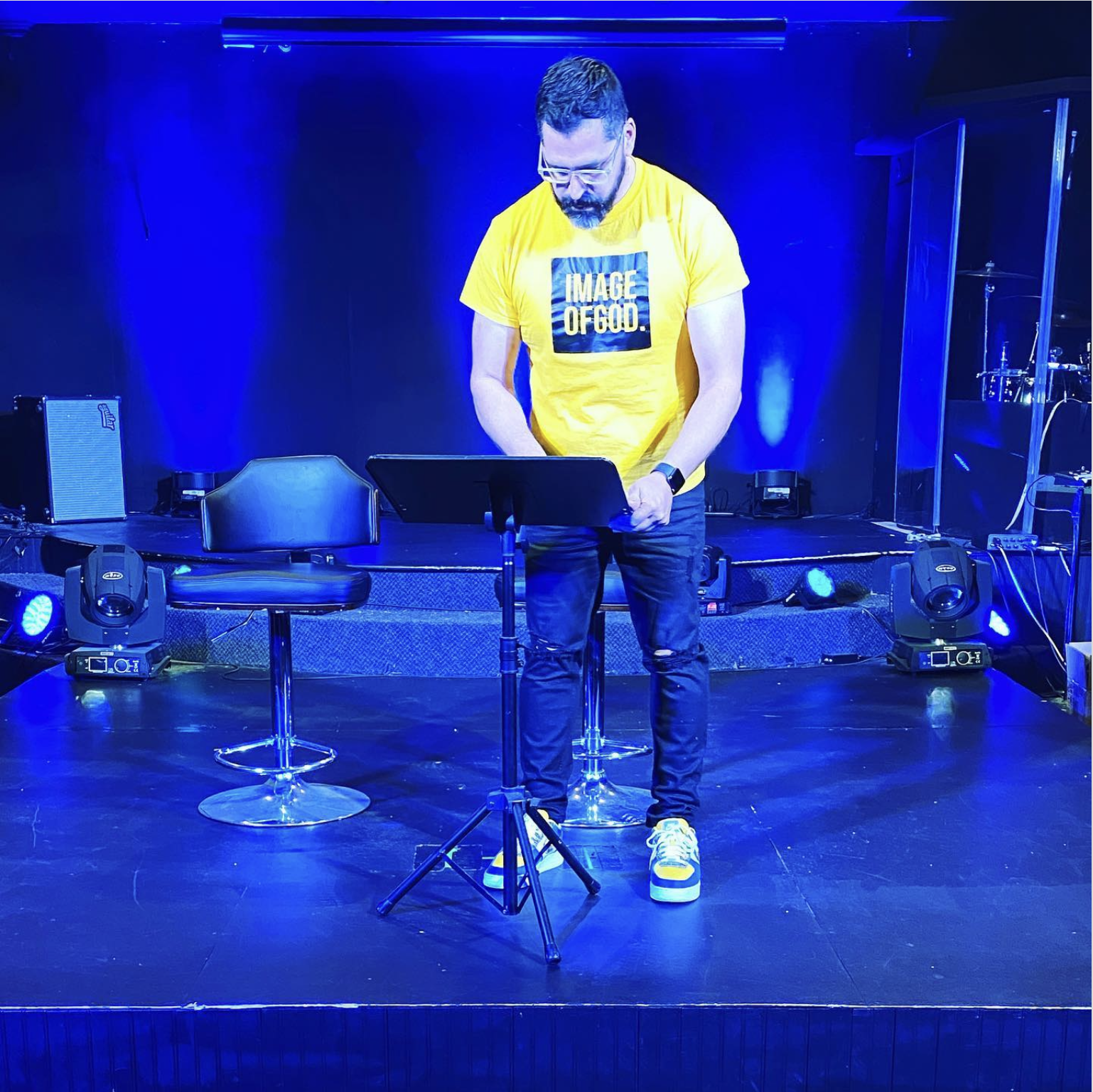

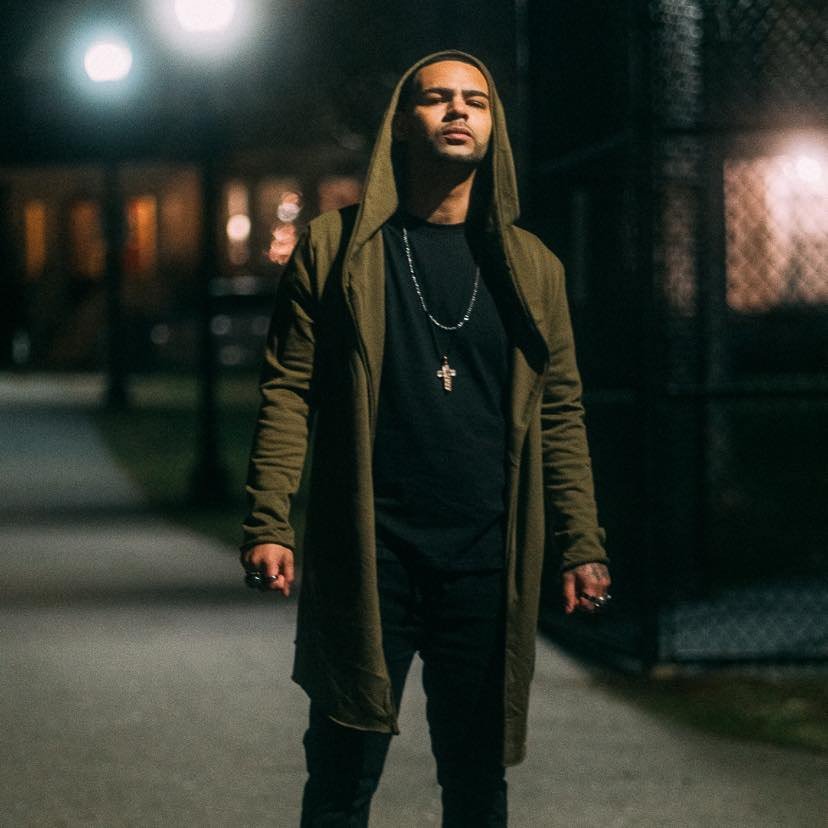

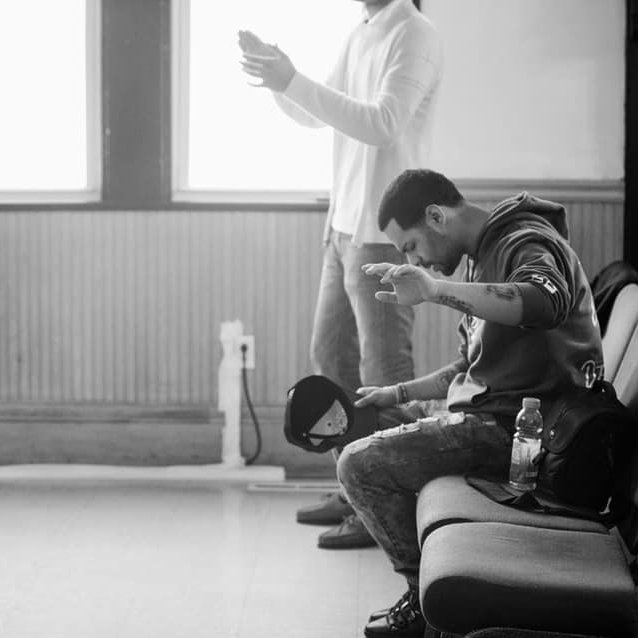
They don’t always feel seen. Many feel like spiritual orphans in a world that neither understands nor values their faith and a Church that neither acknowledges nor appreciates their gifts.
Some church leaders do see them. They say Christian artists are an untapped resource.
Pastor Valerie “Val” Copeland, pastor of Neighborhood Church of Dorchester, said God has given every Christian gifts and skills for a reason.
“Christian creatives sit in church without their gifts being used, without space being made for their gifts, while they sort of dry up on the vine,” she said. “If we need a singer or guitarist or drummer, we'll search them out. But where's the imagination to say if they are gifts that God has given you, then it's incumbent upon us to figure out how to make room for them?”
“Christian creatives sit in church without their gifts being used, without space being made for their gifts, while they sort of dry up on the vine.”
It hasn’t always been this way. Historically the Church has been a driving force for the arts, integrating it in its worship, teaching, and architecture. In some places marked by post-Christianity, the churches may be empty but their beauty continues to bear witness.
The arts have the power to speak to people in ways that sermons can’t. The Christian creatives sitting in the pews could help address some of the biggest challenges facing churches today. This is an opportunity for churches to support creatives while at the same time mobilizing them for mission.
In an effort to help churches do that, we connected with Christian creatives and pastors to learn from them how churches can support and equip the artists sitting in the pews.
A creative God
Christian creatives say they draw inspiration from the Creator — and that churches should too.
“God is the first artist,” Pastor Val said. “The beauty of art and the drama of art calls our hearts to something greater than ourselves and reminds us that God’s design is intentional: the way that he uses color, the way that he uses the drama of thunder and lightning, the way that he calls us to be creative in how we love the world.”
God’s creation is not only beautiful, it's also unique. He made humans in his image to reflect his creativity. For Michael “Mike Mack” McPherson, founder of Elevation Conference, the rich diversity of God’s created order is the “essence of creativity.”
“God is the first artist. The beauty of art and the drama of art calls our hearts to something greater than ourselves and reminds us that God’s design is intentional.”
“He could have easily made every single bug the same — every single ladybug could have the same amount of spots, and he decided that he would splatter and make them all look so different and so unique,” Mike Mack said. “But then we come into the Christian world and we look at art and music and we're like ‘It's supposed to sound like this.’”
Creatives embrace the call to “sing a new song.” They thrive on expressing themselves through their work, improvising to bring something new out of the old.
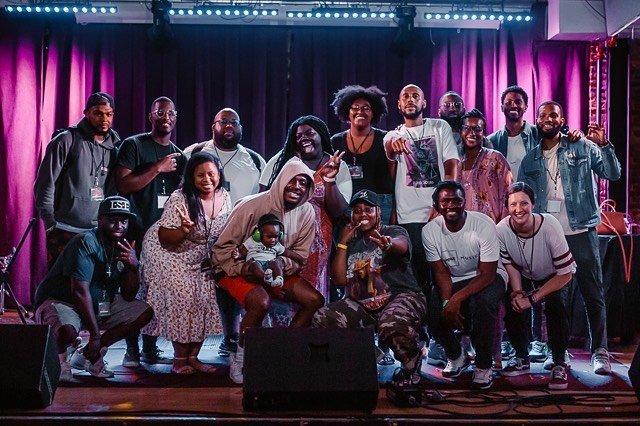
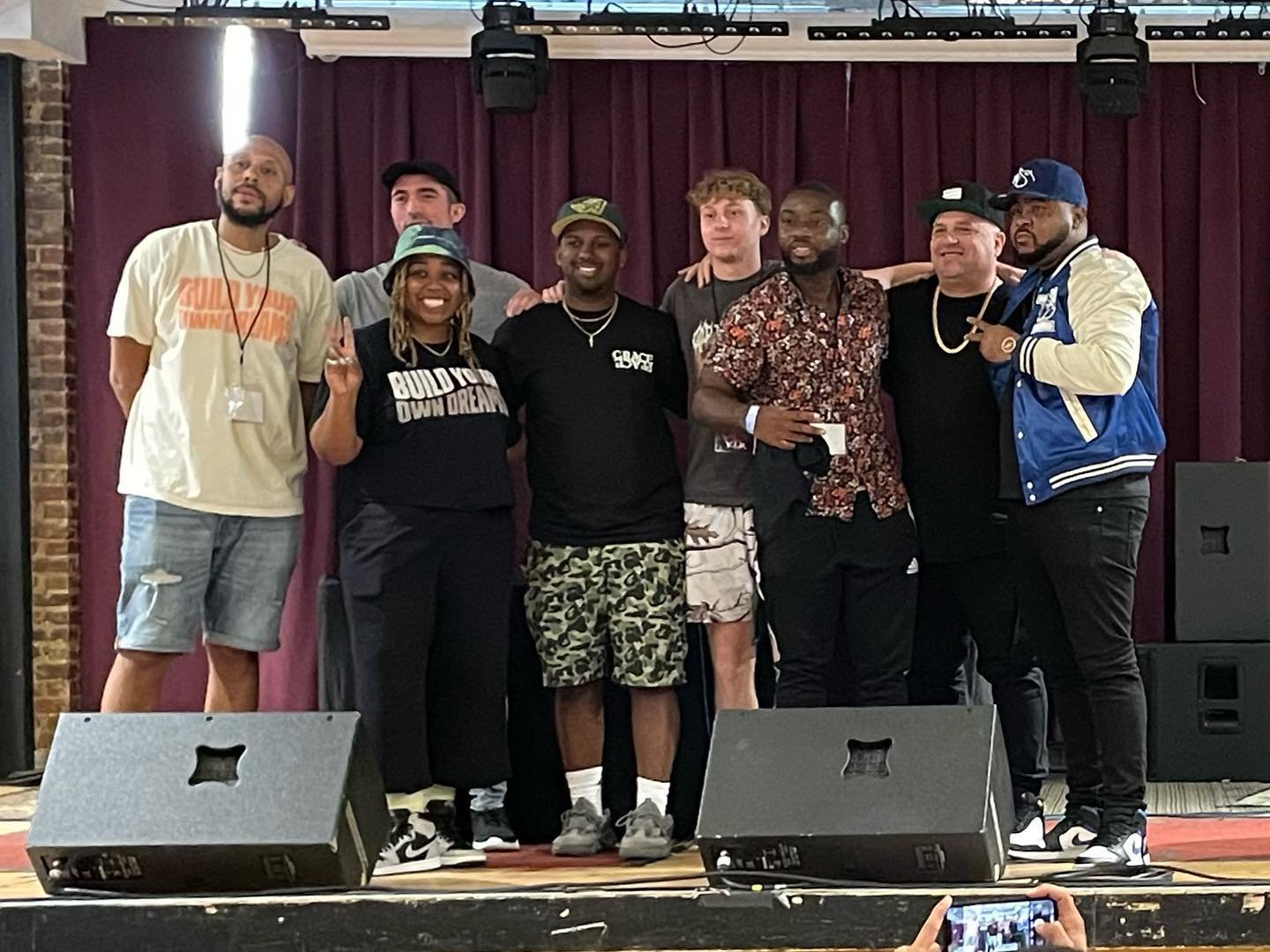
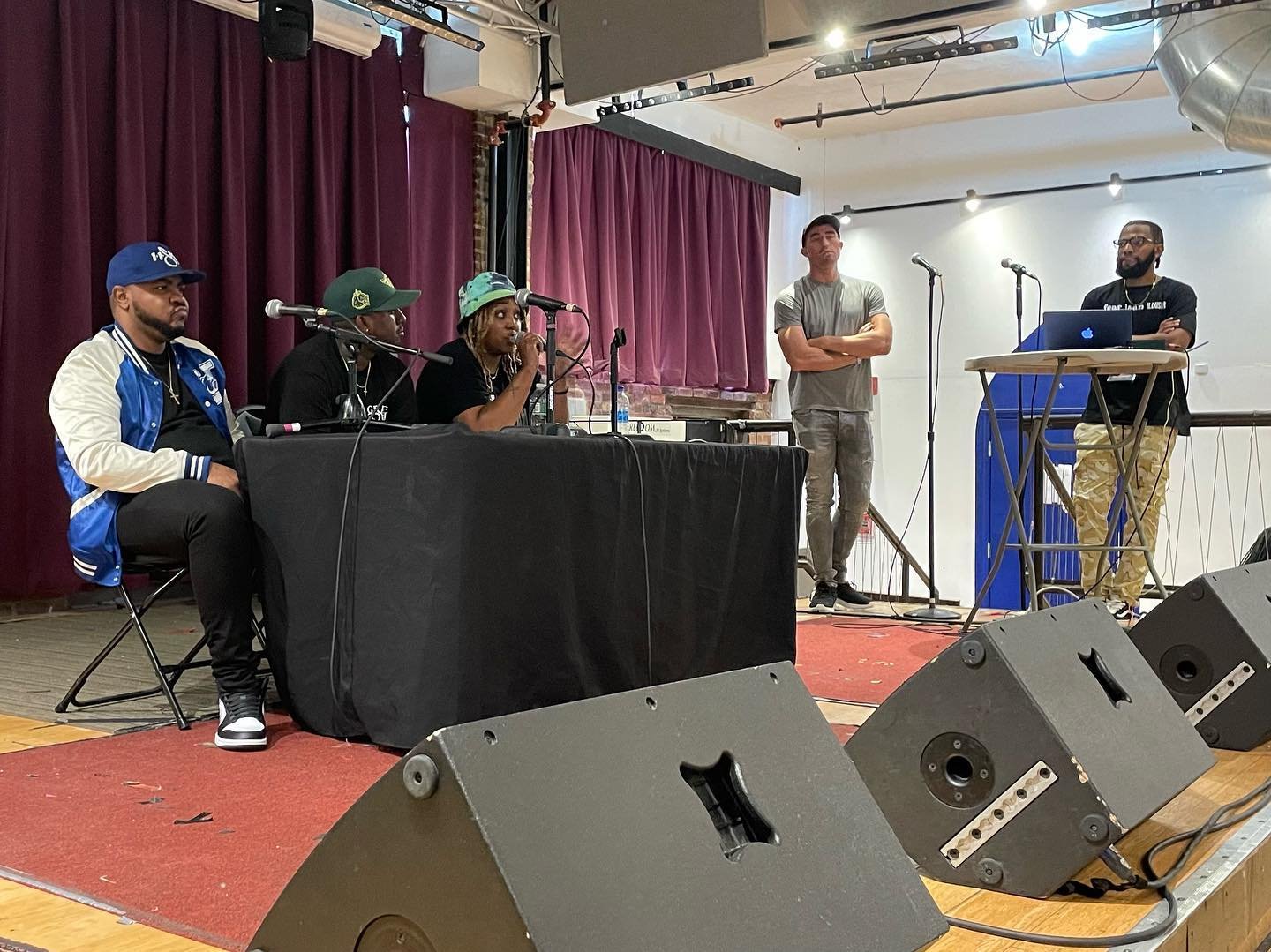
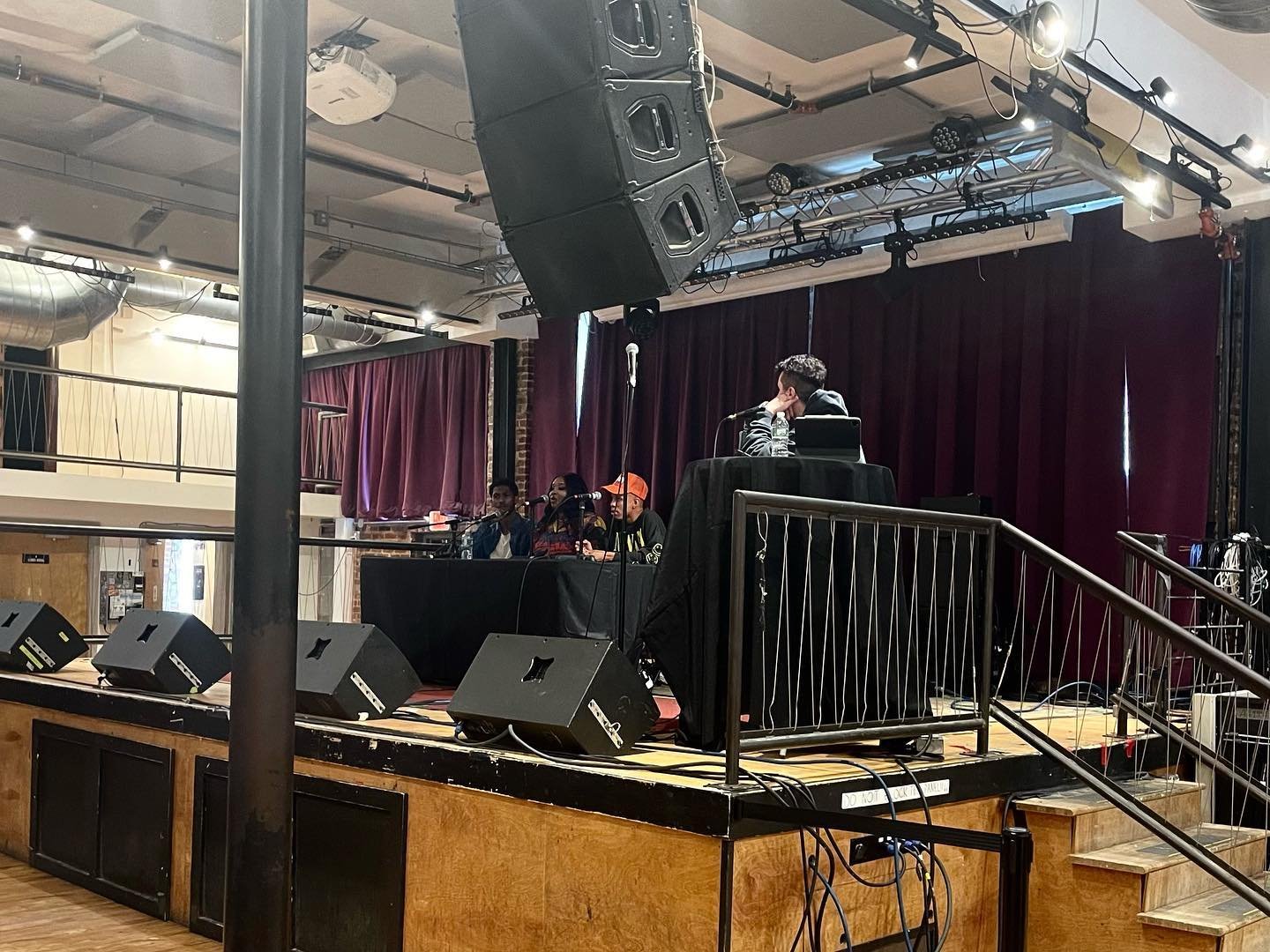
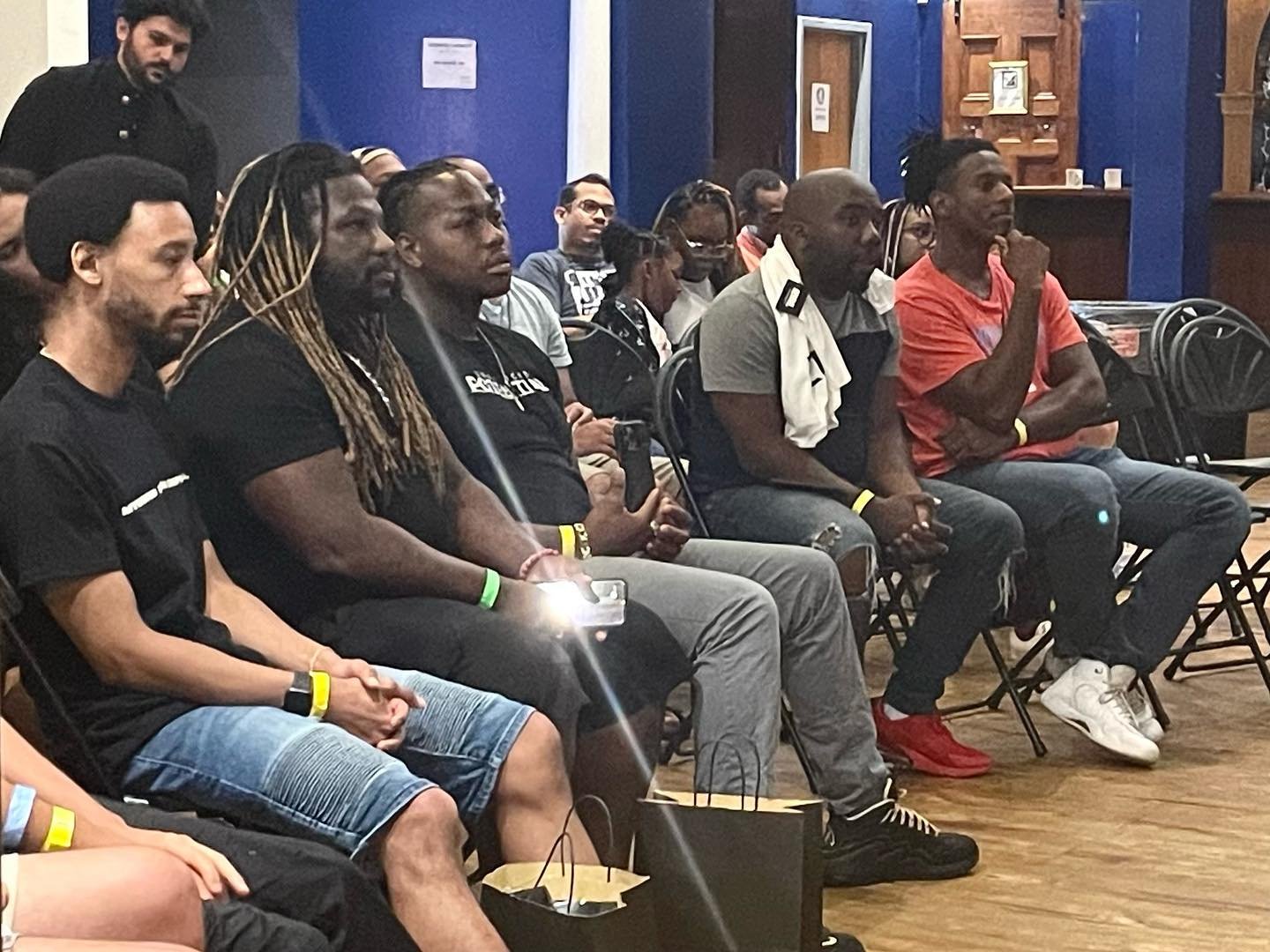
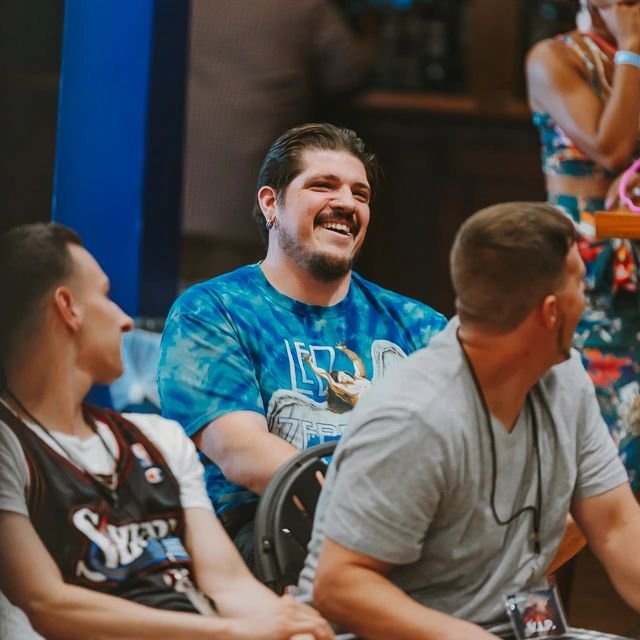
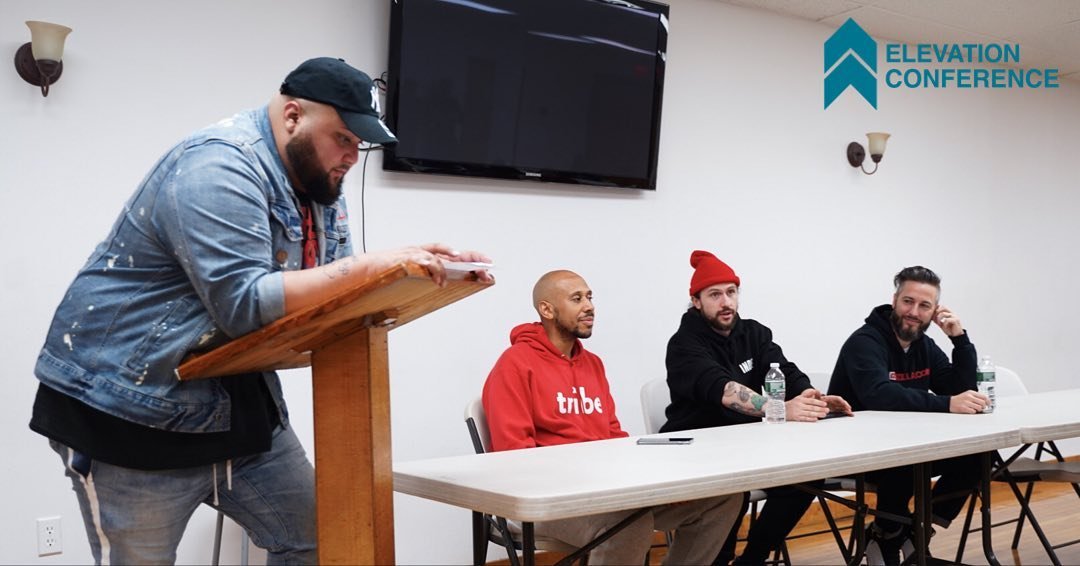
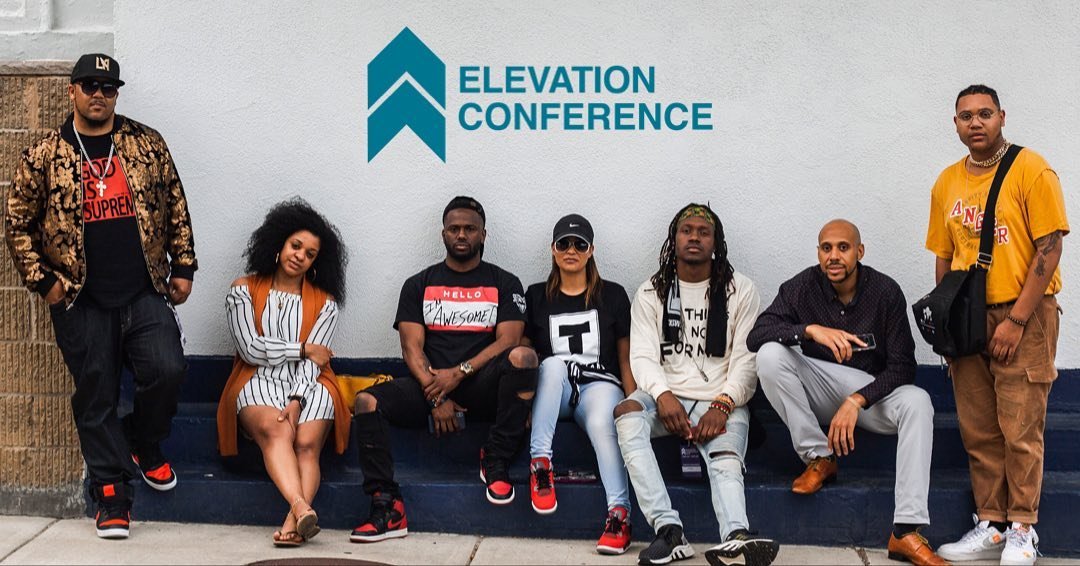
Many creatives feel that a lot of churches function exactly the opposite way. The familiarity of traditions provide safety and stability; however, if churches hold them too tightly there can be little room for something new. The tension between creative expression and commitment to tradition can often be at odds.
“The overarching problem is that the Church is terrified of so much. The Church creeps around so much,” Mike Mack said. “The Church still has — despite what Paul said — a 'taste not, touch not' mentality (Col. 2:20-23) about almost everything that could be considered sin and is probably not actually sin.”
Christian creatives often face the impossible task of producing art that checks all the boxes for churches theologically and for the world aesthetically. Placing restrictions on artists that don’t concern the core message of the gospel chokes creativity.
A creative Church
The COVID-19 pandemic forced churches to get creative. The crisis compounded the new challenges with long-standing issues that surfaced and threatened division. Many people did not return to worship services after lockdown measures were lifted, and increasingly younger generations don’t want anything to do with the institutional church.
To minister in this new reality, Pastor Val said “our missiology has to shift.”
“I talk to a lot of folks who are just really hanging onto the Church by a string,” she said.
Christian ministry is often geared to preaching that appeals to the head, but it is missing out on the power of the arts to reach the heart.
“This is definitely an area that the Christian Church has fallen asleep on,” Pastor Val said. “We've sort of limited God to the area of our brain: think about it, write about it, talk about it.”
Pastor Valerie Copeland
But with the state of the broader culture, this will not be enough to communicate the gospel effectively to many people. The call of Jesus’ Great Commission is to “go” to people instead of telling them to “come” to the Church.
“I think too often we're waiting for people to meet our criteria — and it's completely backwards,” Pastor Val said. “This idea — I'm willing to do whatever it takes to tell you about God: a God that loves you, a God that inspired all of this beauty, and a God that finds beauty in you — I'm willing to do whatever it takes. You've got to be willing to do whatever it takes.”
Pastor Val said Grace Chapel’s passion week display was a moving example of how God can use the arts to “preach” the message of the gospel. The display included beautiful art installations with quiet spaces for reflection.
“The last installation is just an empty tomb, and I can't tell you how that thing just brought me to my knees,” she said. “I've heard many sermons about the empty tomb that didn't bring me to my knees. Seeing that empty tomb brought me to my knees.”
In addition to proclaiming the Good News in different ways, Pastor Val said Christian creatives have the opportunity to help heal the fallout from broken or false views of God. Images have power, and when they’re not created to look like the people they’re meant for, it can have a lasting negative impact. Creatives can step in to redirect the image and narrative that disaffected people have of God.
“Give them platform, stop hiding them, stop discouraging them, be more encouraging, give them opportunities to present — especially on Sunday mornings. If you look around your congregation, there’s probably people who do all sorts of really cool, really unique things.”
“One of the ways that Christian creatives can be helpful is in bringing these important issues to light but also in correcting the narratives that have been associated with these images, and redirecting the narrative towards what is true and who we are as Christian believers,” Pastor Val said.
For churches that want to take the risk and change their approach to ministry, it will likely mean a painful period of adjustment, she said. But church leaders who worry about how to reach the unbelievers in their community may not realize that God has already provided them with the answer right there in the pews.
God has equipped Christian creatives in their congregations with gifts to preach the beauty of the gospel. But they must be empowered, not exploited.
“Give them platform, stop hiding them, stop discouraging them, be more encouraging, give them opportunities to present — especially on Sunday mornings,” Mike Mack said. “If you look around your congregation, there's probably people who do all sorts of really cool, really unique things.”
Creatives have their own ideas for how churches can begin to support them as they live out their calling to glorify God. They stress that this will mean a change in the usual mindset and approach to ministry. Of the many ways they can help, churches can start praying and thinking creatively about how they approach their finances, building space, and ministry staff.
Creative with support
One of the basic ways churches can begin to think creatively about equipping the artists in their pews is by supporting them financially.
An economy shaped by modern technology and social media has conditioned us to expect things to be free. Coupled with the tendency in churches to spiritualize volunteerism as Christian service, this dynamic puts Christian creatives in a difficult spot. They’re often expected to use their gifts and skills for free. And not complain about it.
“One of the things that does concern me is the inability for creatives, in general, particularly Christian creatives — particularly Christian creatives of color — to make a living,” Pastor Val said.
“We’ve got to start seeing people as an investment in the kingdom versus their output as the investment.”
It’s not fair the way churches impoverish Christian artists as they pursue their ministries, Pastor Val said.
“Christian creators contribute so much more to our economy than they get back,” she said. “They contribute so much more to the economy of the Church than they get back.”
When churches exploit the work of their people, it compromises the Church’s witness to the world.
“Justice starts in the house of the Lord. We cannot be out there fighting for justice and defending the rights of the poor and the exploited and then be exploiting people within the house of the Lord,” Pastor Val said. “We've got to start seeing people as an investment in the kingdom versus their output as the investment.”


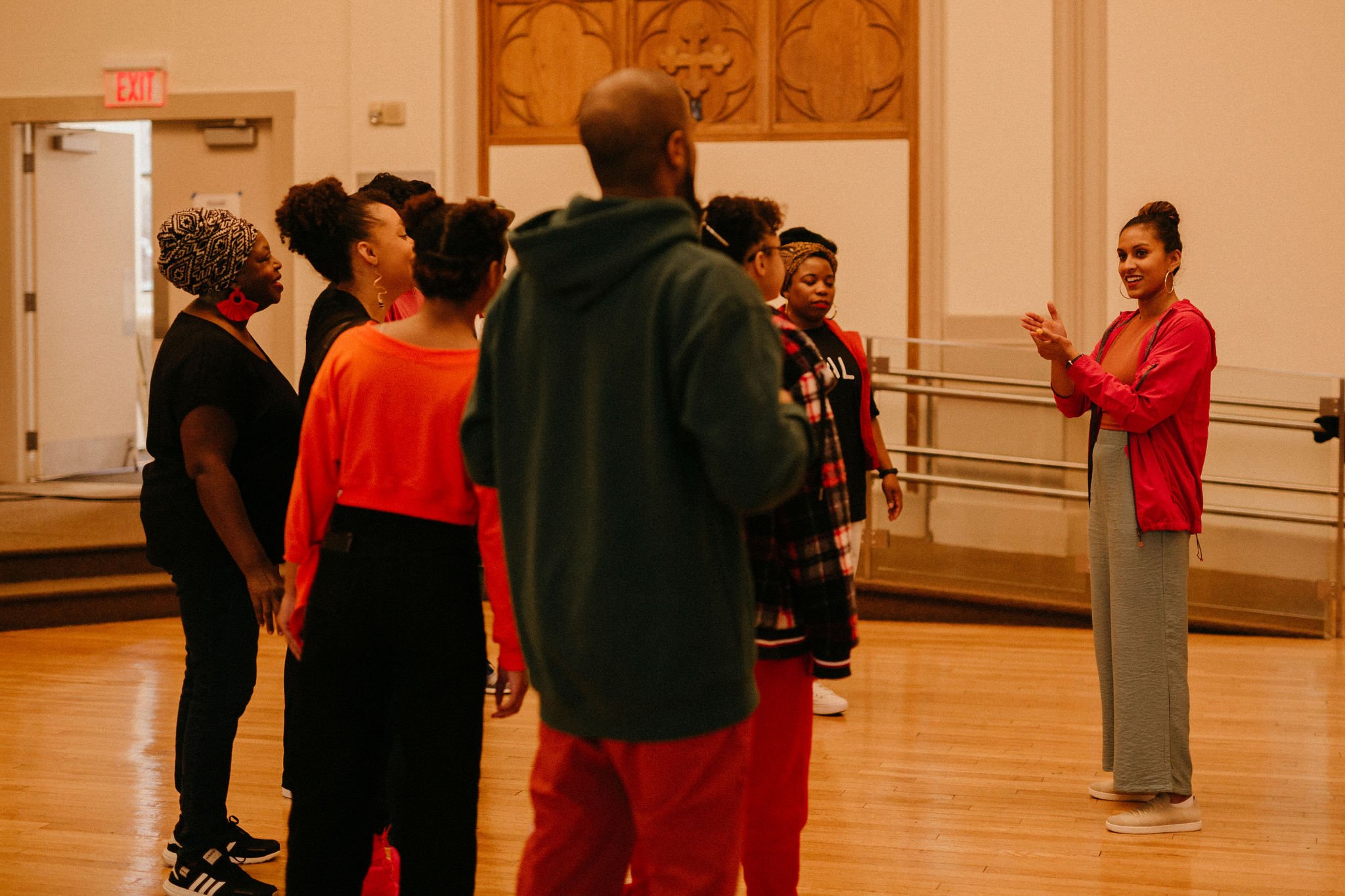
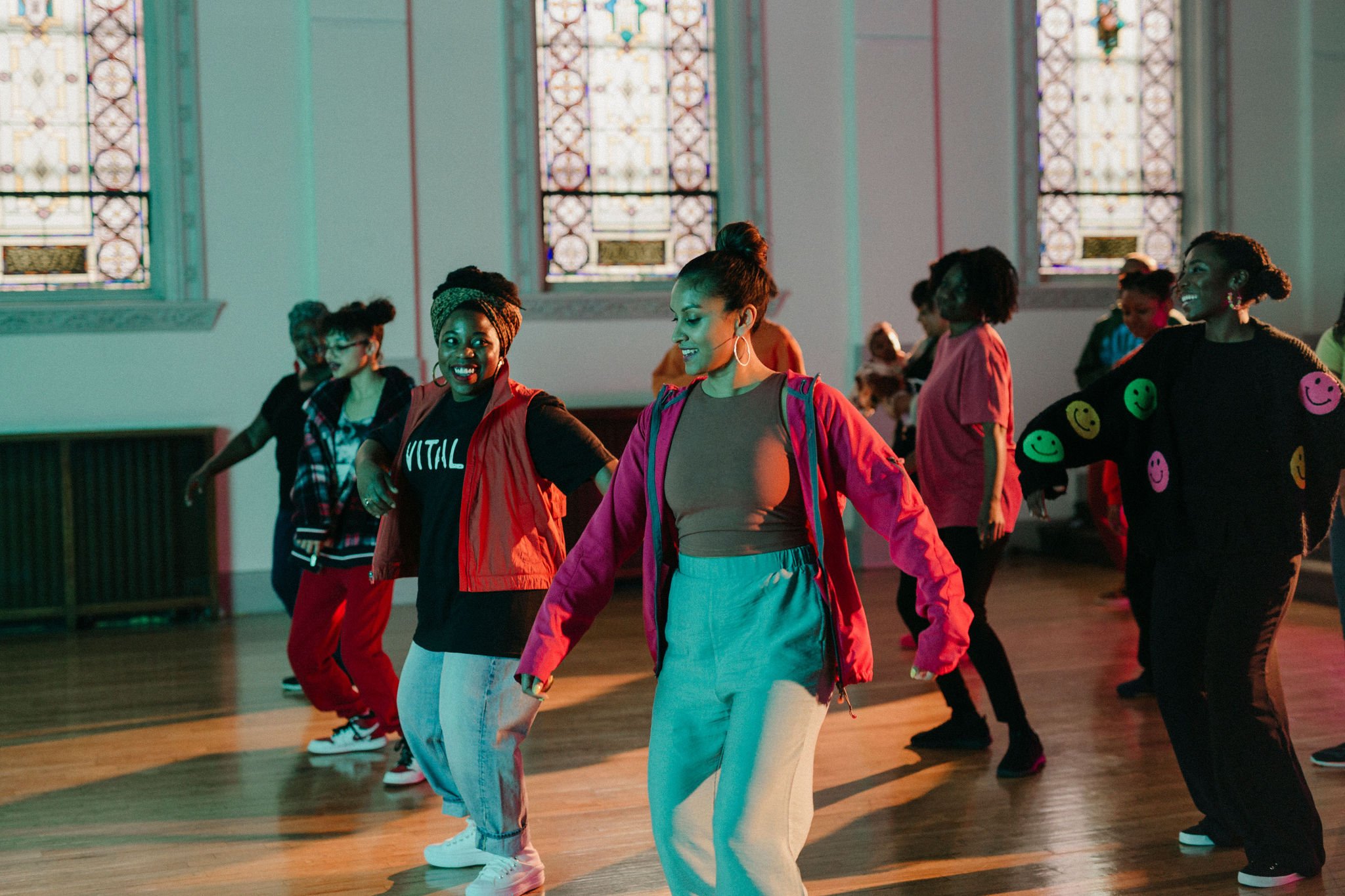



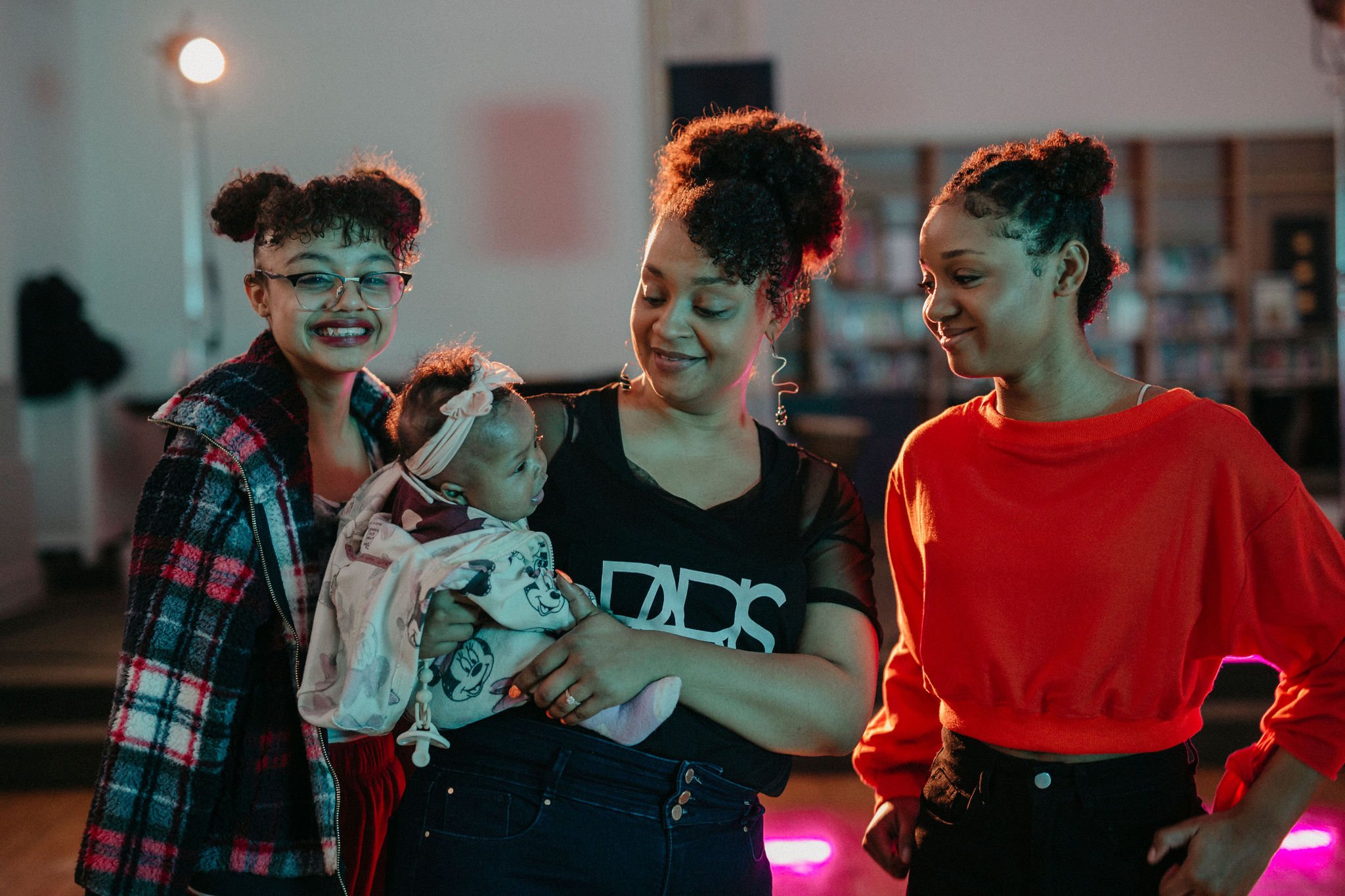
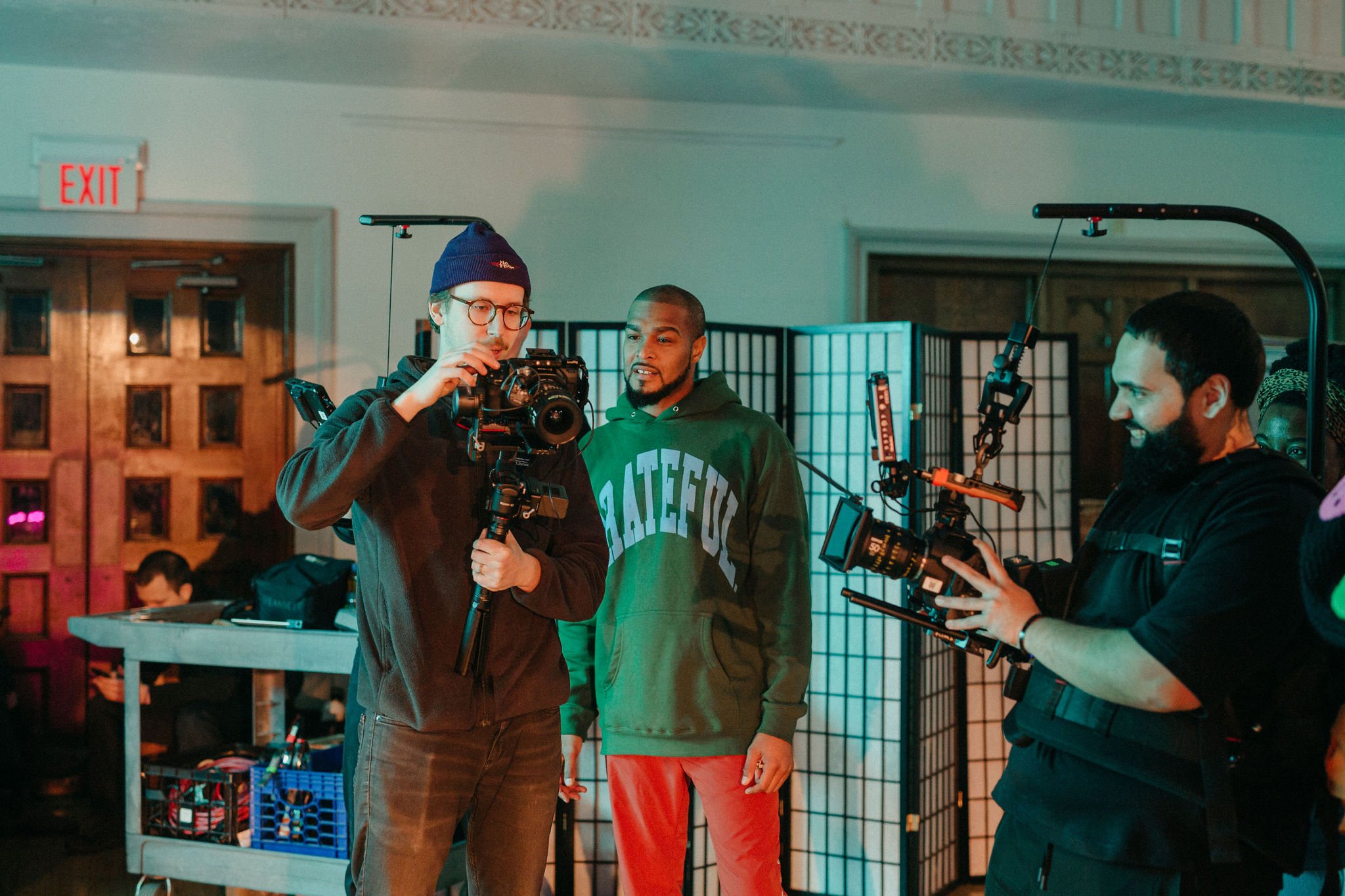
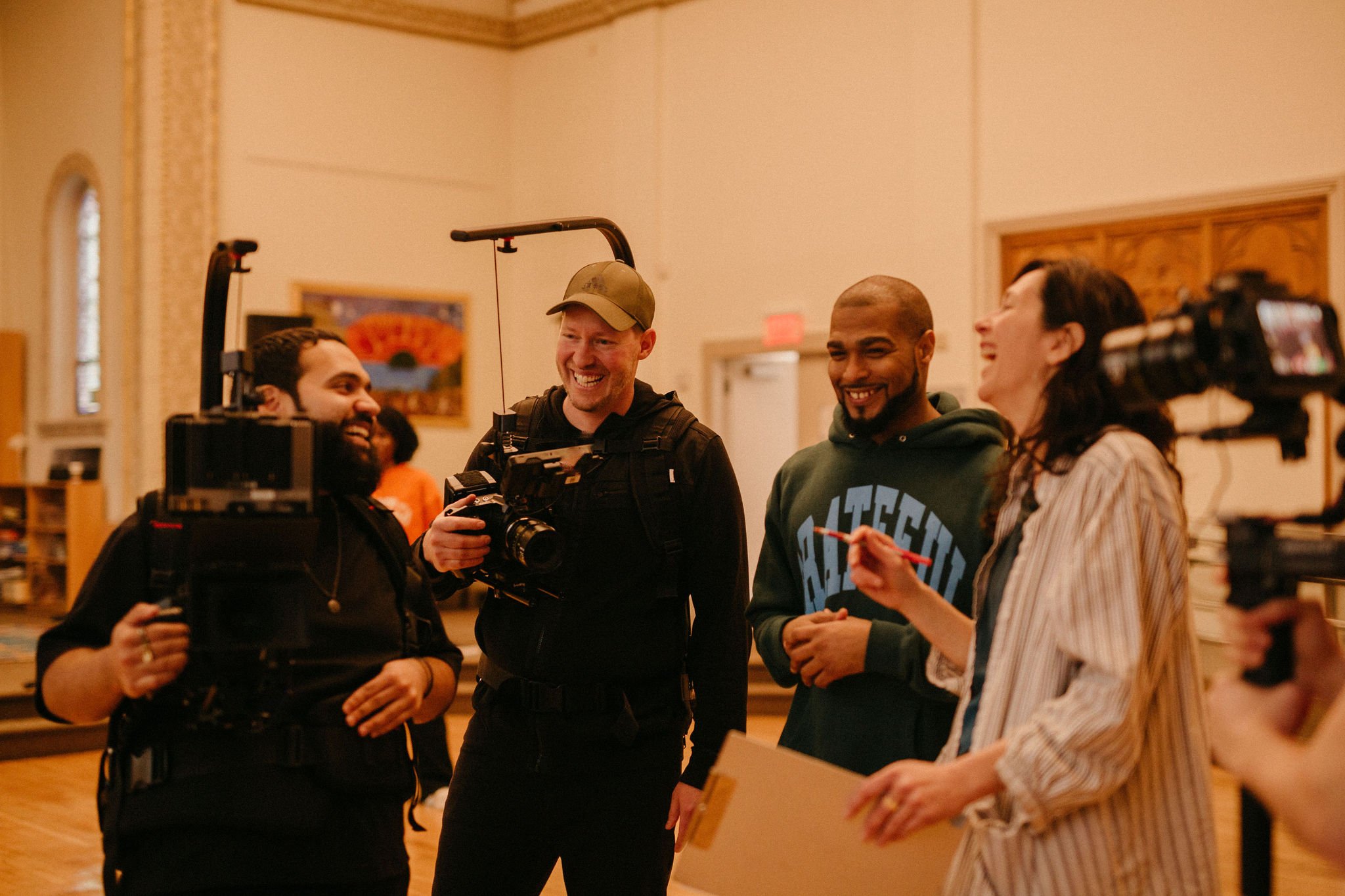

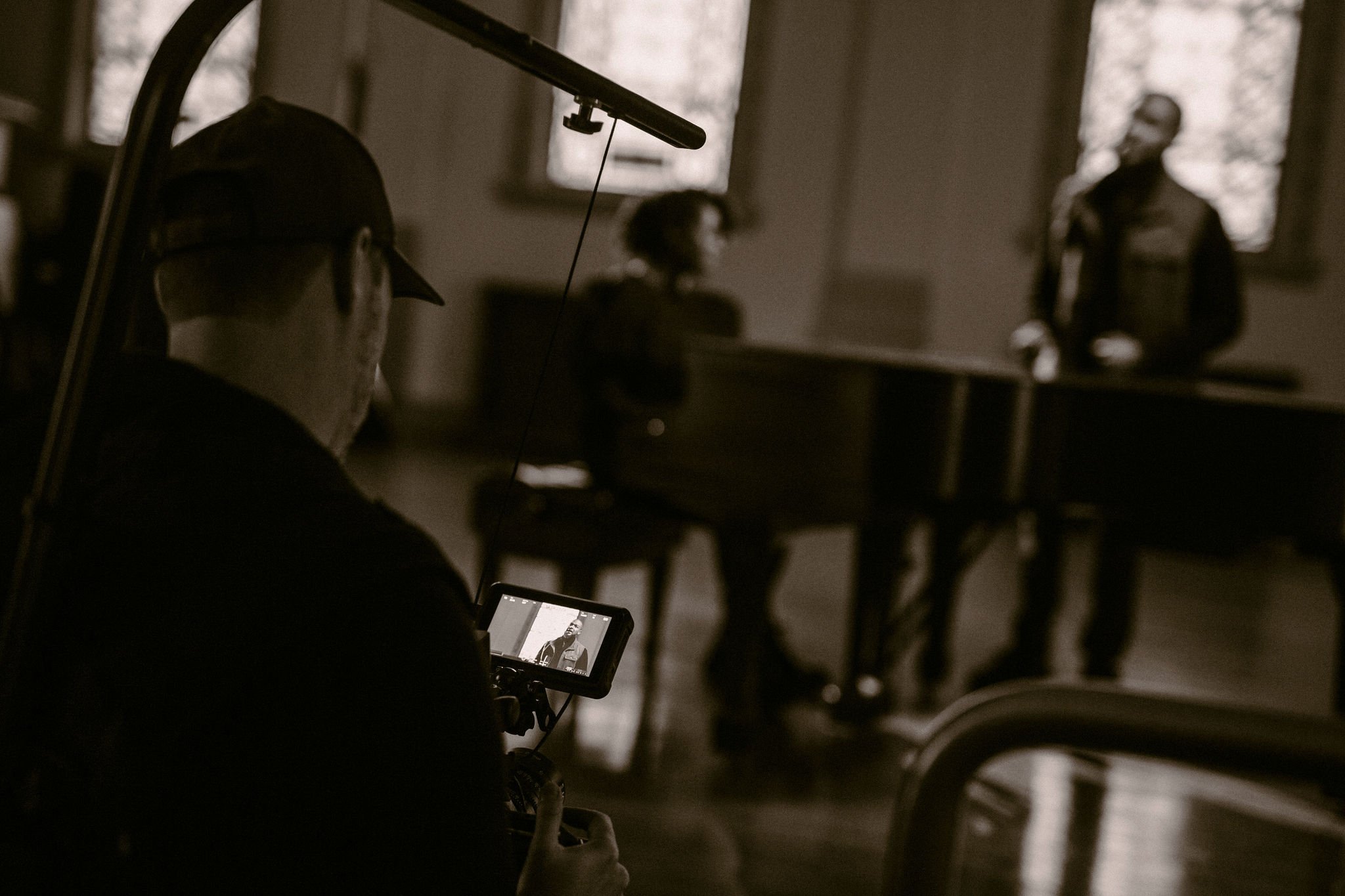

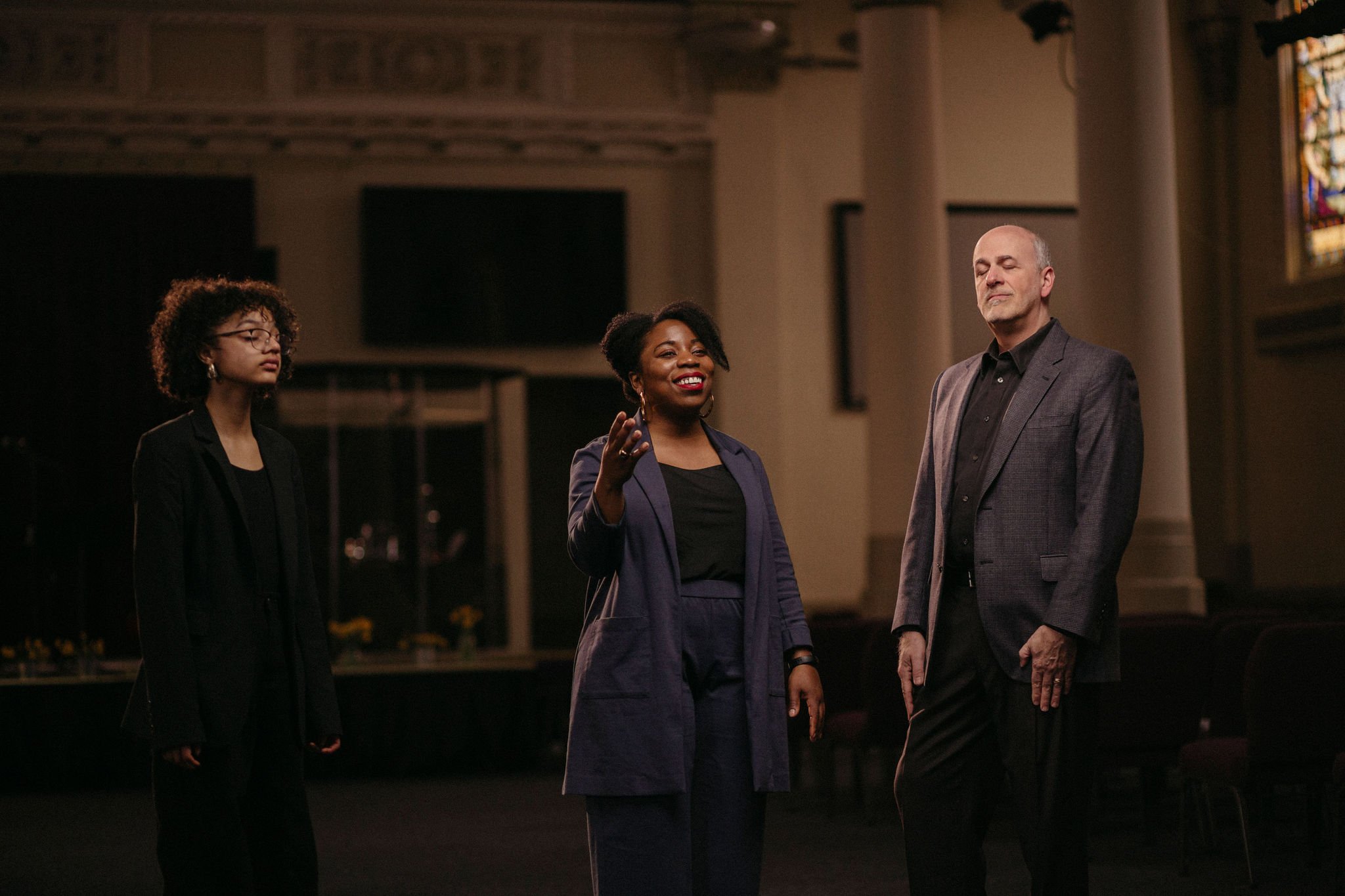

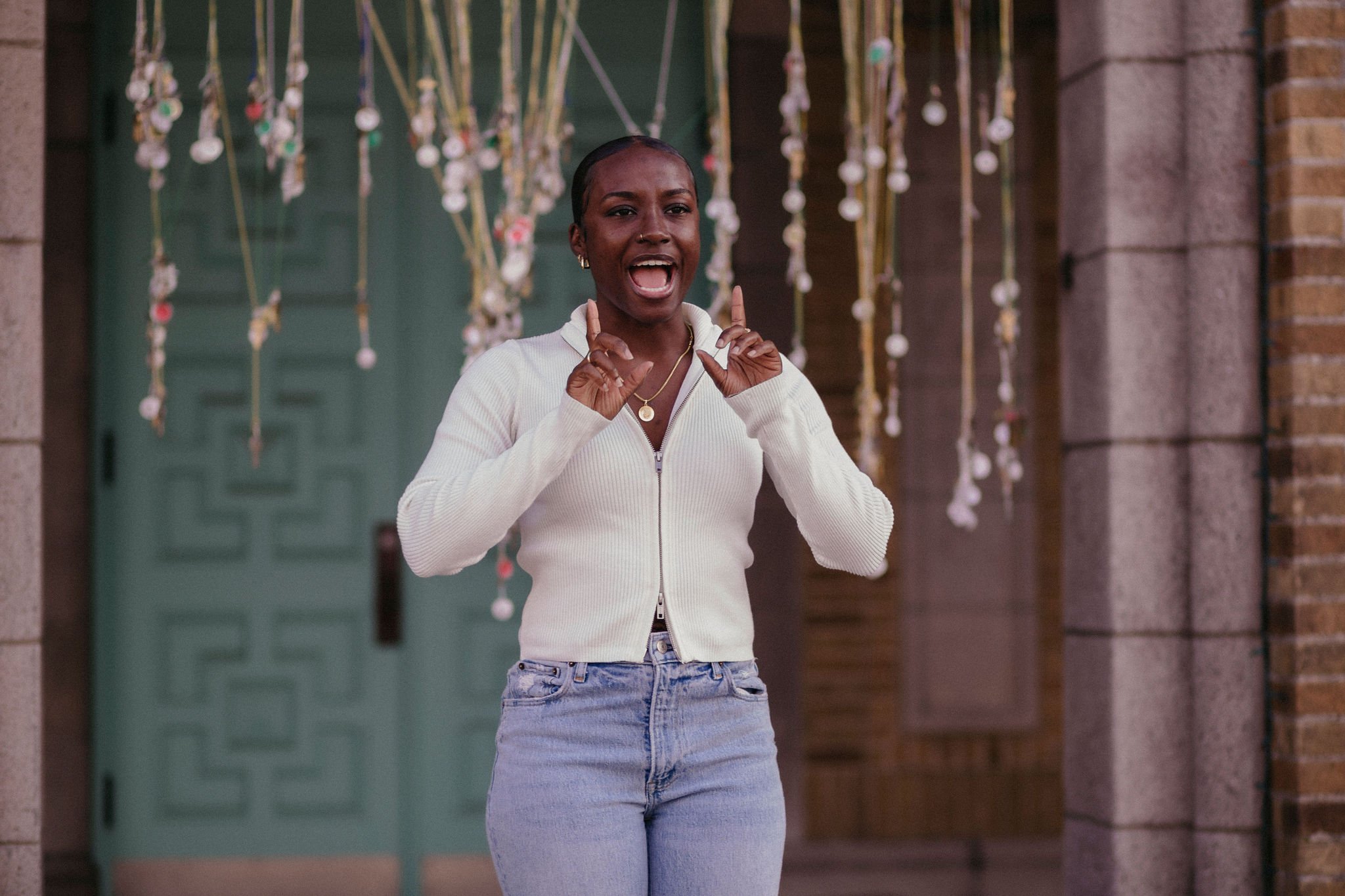
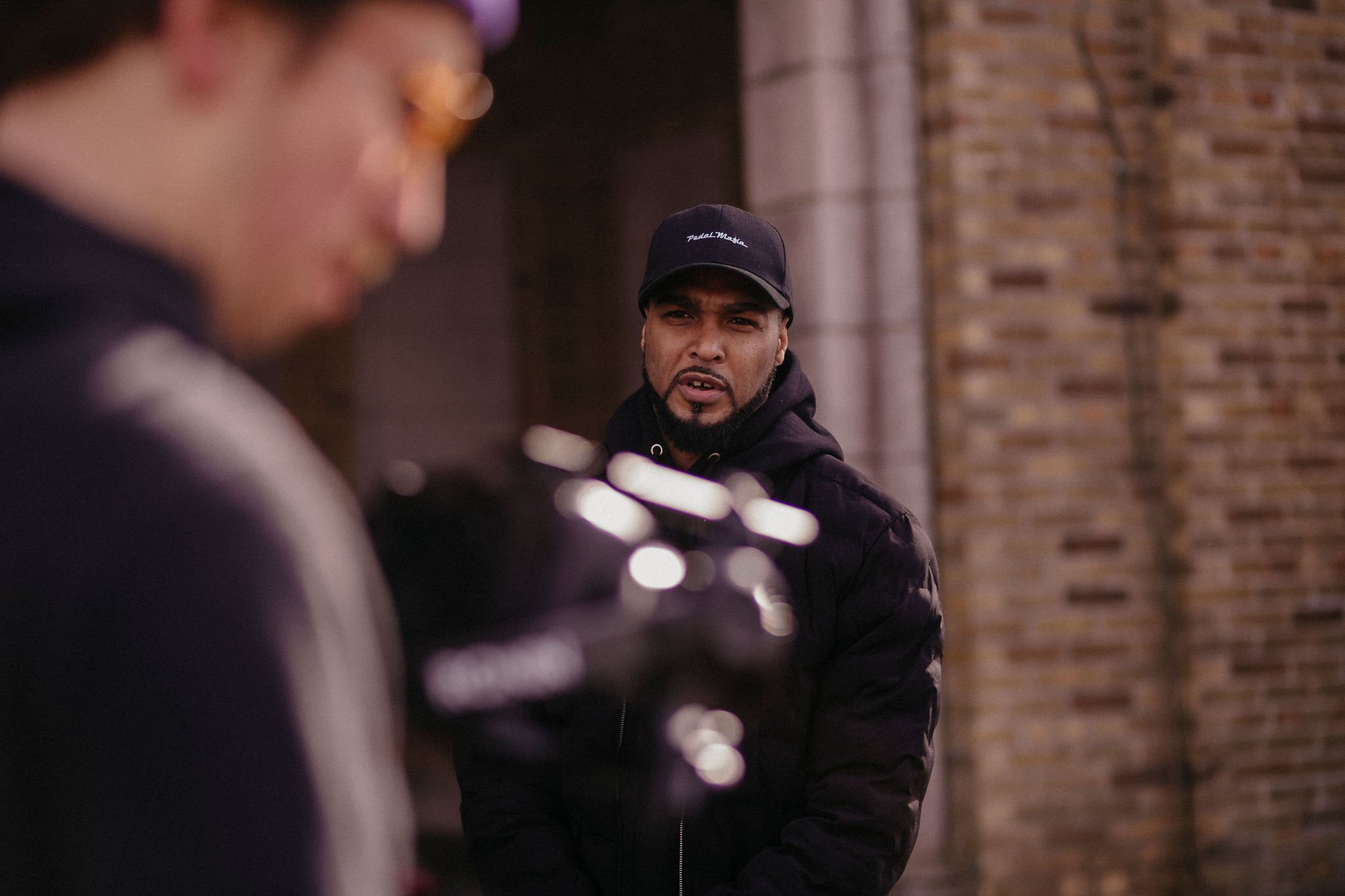

Individual Christians can also think creatively about their tithing and giving. Mike Mack is confident that there are believers in the area who want to “make sure that New England’s a hub for artistry” and that Christian creatives have the tools and access they need to thrive.
“Somebody out there has that heart, but they've probably been told that the only way that you can give is to give it directly into the Church,” he said.
Being open to think creatively when it comes to finances is an opportunity to walk in step with the Spirit and partner with what God is doing on the ground.
“Are you listening to the voice of God? Do you ever wake up in the morning and say, ‘What does my city need? What do I gotta do?’” Mike Mack said. “Do you ever see somebody who's a creative and just think to yourself, ‘Wow, this person could really use assistance. I believe in what they're doing — let me help them out’?”
Creative with space
Boston is not kind to Christian artists and creatives looking for event space. They can have a tough time finding venues that will meet their needs at an affordable rate.
Many churches have significant real estate footprints with resources that could be used to support the work of creatives. Stewarding those resources well has kingdom implications.
Mike Mack said that along with everyone else, church leaders will one day have to give an account for what they received and what they did with it — “especially the stuff that we prayed for.”
“You look around and it’s like, what resources is the church sitting on? What young, up-and-coming rapper is actually the greatest preacher in your church, and you’re just not utilizing him because you don’t like the way that he does it?”
“‘Lord, I need this, please give me this.’ And he's like: ‘You just want it for yourself, you wicked servant. You just want it so you can hoard it. Why should I give it to you?’” Mike Mack said. “Somebody's praying for their building fund right now — got money coming in from everywhere — and have no plans of using it for the people who gave to it.”
Churches can use their spaces to host concerts, exhibits, and other artistic events. They can work collaboratively with creatives to further the kingdom in their local communities with the use of their building space.
Creative with staff
Beyond physical assets and resources, churches can build out their ministry staff with Christian creatives who feel called to serve in the church.
“Put the creatives in your church on staff. Pay for their position,” Pastor Val said. “Put people on staff so that they're actually able to do what they need to do and also support the life that they need to live.”
Bringing creatives on staff may not come intuitively to some church leaders. It may mean interrogating our ideas of what a church staffer looks like.
“You look around and it's like, what resources is the church sitting on?” Mike Mack said. “What young, up-and-coming rapper is actually the greatest preacher in your church, and you're just not utilizing him because you don't like the way that he does it?”
“Church” may not look exactly the same anymore. Christian creatives may have interests that don’t naturally align with the way many churches usually approach the arts. They might not play a musical instrument or want to lead the children’s Christmas play.
“It’s glorifying God just in a different approach. I think once people can realize that, they’ll definitely leave more space for more opportunity for creatives like myself and others.”
“We have to start — and I'm hoping even at my church — making room for the ministries — no matter how unique they are — so that this is a place where they can flourish,” Pastor Val said. “This is a place where we will financially invest in that ministry just like we're going to invest in the summer camp, the food pantry, the marriage retreat.”
Pastor Val said church leaders should recognize that creatives are also theologians. They should invite creatives to look for ways they can visually bring to life what is being taught or preached from the pulpit.
“One of my dreams is that someone would do a dramatic piece of the encounter between Jesus and Satan in the desert, where they have this word battle, and Jesus literally drops the mic at the end. It is done. It's a wrap,” she said. “It's so dramatic. This interaction between Jesus and Satan is intense, it's high stakes. And I'm like, why hasn't this been made into a dramatic piece yet?”
Creatives like Acevdeo are confident churches can make use of them and support them at the same time. He encourages creatives to be plugged into a local church community, rooted and grounded in Christ alone. He believes this spiritual vitality will help shift hearts and minds within congregations to make room for artists with unique gifts who relate in different ways.
“It's glorifying God just in a different approach,” Armani said. “I think once people can realize that, they'll definitely leave more space for more opportunity for creatives like myself and others.”
WATCH: Church & Creatives
Have you ever experienced music or art that has helped you feel closer and more connected to God? For many people, creativity and artistic expression have become an important part of their faith. The Emmanuel Gospel Center connected with Christian creatives and pastors to learn from them how churches can support and equip the artists sitting in the pews. Watch this video that dives into this world of faith and creativity while highlighting opportunities for support and collaboration.
Why I Love CUME
After almost 50 years of providing theological education to urban ministry practitioners, CUME’s vision and mission are still being turned into a beautiful reality each semester.
Why I Love CUME
by Jeff Bass, Executive Director
On January 21, I attended the opening convocation day at Gordon-Conwell Theological Seminary’s Boston campus, more commonly known as CUME, or the Campus for Urban Ministerial Education. I am an adjunct professor at CUME, and each spring, I teach one of their core urban ministry courses, Living Systems in the Urban Context.
Attending the convocation is one of the obligations of teaching at CUME. But even though I went out of duty, it didn’t take long to reconnect with my sense of why CUME is so important and to remember why I make teaching there one of my priorities. Throughout the day, I was reminded why I love CUME, and I went home with a renewed appreciation for and commitment to CUME’s vital ministry in urban Boston.
I love CUME because it is a genuinely diverse expression of the church in Boston. The Bible is clear that we are heading for a multiethnic reality, with people “from every nation, tribe, people and language” standing before the throne (Rev. 7:9). The CUME community is the best representation of this that I have experienced. The room has no majority and is a glorious mix of Black, white, Asian, and Latino; men and women; people from different countries and backgrounds; and a range of ages from young adults to seniors. It’s a joy to worship, pray, interact, teach, and learn in this beautiful expression of the kingdom of God in Boston.
Jeff Bass teaching a class in the Living Systems in the Urban Context course in Spring 2023. Emmanuel Gospel Center.
I love CUME because of the passion and commitment of the students. The vast majority of CUME students have jobs as well as active ministries. In one small group session, we heard from a student who has a full-time job, is a senior pastor and a grandfather, and is, of course, taking classes at CUME. His energy for his life and learning was palpable, as was the energy from all the students I interacted with that day. It’s inspiring to be with so many people who expressively love the Lord, invest in their learning and growth, and put their faith into action in their whole lives.
I love CUME because of the real difference it makes in the lives and ministries of its students and graduates. CUME students are urban ministry practitioners. They are not there just for academics but also to deepen their knowledge and practical skill sets so they can engage in effective ministry now and in the future. While I was eating my lunch, a student came over and spoke to me for five minutes about how he is applying what he learned in my systems class and how it is positively impacting his ministry. CUME undergirds the active ministries of its students with theological understanding and tools for practical ministry, and it is fun to see the enormous impact this has had across the church in urban Boston over decades.
“CUME undergirds the active ministries of its students with theological understanding and tools for practical ministry, and it is fun to see the enormous impact this has had across the church in urban Boston over decades.”
I love CUME because of its strong and dedicated leadership. I’ve known CUME’s dean, the Rev. Dr. Virginia Ward, for many years now. She is a gifted and passionate leader who is building a solid team around her. The feeling at the convocation that day was one of confident team leadership, with all the parts working together to create an excellent experience for the students. Despite its many challenges, CUME is well led and is moving forward with strength and competence.
I love CUME because its mission is critical to the health of the church in urban Boston. CUME’s mission dovetails beautifully with EGC’s mission, and this dovetail is intentional. CUME was founded in the 1970s to provide theological education to urban ministry practitioners. At the same time, EGC was re-envisioned as a center for applied research and ministry development, all in the service of Christian leaders. As we approach the 50th anniversary of CUME’s founding, I love seeing CUME’s vision and mission still being turned into a beautiful reality each semester as we continue to work together to strengthen Christian leaders and seek the peace and prosperity of this city to which we have been called.
Snapshot of CUME
Gordon-Conwell Theological Seminary—Boston
Campus for Urban Ministerial Education (CUME)
1976
CUME was founded in September 1976 at Twelfth Baptist Church in Roxbury, Massachusetts.
Student Body*
For the 2021 to 2022 academic year, total enrollment at CUME stood at 138 students, including 86 men and 52 women. 72% of the enrolled students are ethnic minorities, not including international students. The students represent 28 denominations and come from 19 different countries. Like other theological schools, CUME’s enrollment has been negatively impacted by the COVID pandemic.
African American: 46 students (33%)
Asian: 25 students (18%)
Hispanic or Latino: 26 students (19%)
White: 12 students (9%)
Two or more races: 2 students (1%)
Unknown/Unavailable: 19 students (14%)
International Students: 8 students (6%)
Faculty
CUME has two full-time and 14 adjunct professors.
African American: 10 (63%)
Asian: 1 (6%)
Hispanic or Latino: 1 (6%)
White: 4 (25%)
Certificate and Degree Programs
Urban Ministry Graduate Certificate
MA in Christian Ministries
Master of Divinity, including the Urban Ministry Track
Languages
Classes are taught in English as well as some in Spanish and Portuguese.
*The data is based on Gordon-Conwell Theological Seminary’s ATS Enrollment Reports for Fall 2021. The numbers are based on fall census data from September 27, 2021, and not on full-year totals.
Keywords
- #ChurchToo
- 365 Campaign
- ARC Highlights
- ARC Services
- AbNet
- Abolition Network
- Action Guides
- Administration
- Adoption
- Aggressive Procedures
- Andrew Tsou
- Annual Report
- Anti-Gun
- Anti-racism education
- Applied Research
- Applied Research and Consulting
- Ayn DuVoisin
- Balance
- Battered Women
- Berlin
- Bianca Duemling
- Bias
- Biblical Leadership
- Biblical leadership
- Black Church
- Black Church Vitality Project
- Book Recommendations
- Book Reviews
- Book reviews
- Books
- Boston
- Boston 2030
- Boston Church Directory
- Boston Churches
- Boston Education Collaborative
- Boston General
- Boston Globe
- Boston History
- Boston Islamic Center
- Boston Neighborhoods
- Boston Public Schools
- Boston-Berlin
- Brainstorming
- Brazil
- Brazilian
- COVID-19
- CUME
- Cambodian
- Cambodian Church
- Cambridge





![Christian Leadership Web Sites [Resource List]](https://images.squarespace-cdn.com/content/v1/57ff1c7ae58c62d6f84ba841/1505489399837-OVLHG7QQ7TJ6K8RIJBG7/pexels-photo-209151-website.jpeg)
![Biblical Theology Of Leadership [Resource List]](https://images.squarespace-cdn.com/content/v1/57ff1c7ae58c62d6f84ba841/1503082312592-NX21D7QBK2IYCYEPM32I/pexels-church_Theology.jpg)
![Inner Life Of A Leader [Resource List]](https://images.squarespace-cdn.com/content/v1/57ff1c7ae58c62d6f84ba841/1503082360379-C5ZBYKU7T85I40JH5WMS/pexels-inner-life-airballoon.jpg)
![Intercultural Leadership [Resource List]](https://images.squarespace-cdn.com/content/v1/57ff1c7ae58c62d6f84ba841/1503082407845-5YCT4DLA93VIGHBSAN1R/pexels-intercultural.jpeg)
![Modern Classics on Leadership [Resource List]](https://images.squarespace-cdn.com/content/v1/57ff1c7ae58c62d6f84ba841/1503082448262-DU5B4OH1ZP625DKJRZHH/pexels-modernclassics.jpeg)
![Women In Christian Leadership [Resource List]](https://images.squarespace-cdn.com/content/v1/57ff1c7ae58c62d6f84ba841/1503082489913-T7DT6XUHEQE5DLCQ91UP/pexels-womanleader.jpeg)
![Pastoral Leadership [Resource List]](https://images.squarespace-cdn.com/content/v1/57ff1c7ae58c62d6f84ba841/1505489535138-EG2UJ0K00MI0BXPQTNZ5/pexels-pastor.jpg)
![Leadership Strategies & Models [Resource List]](https://images.squarespace-cdn.com/content/v1/57ff1c7ae58c62d6f84ba841/1505489580322-W3YPVU5W1AKQXXNOLFUM/pexels-strategyleadership.jpeg)








































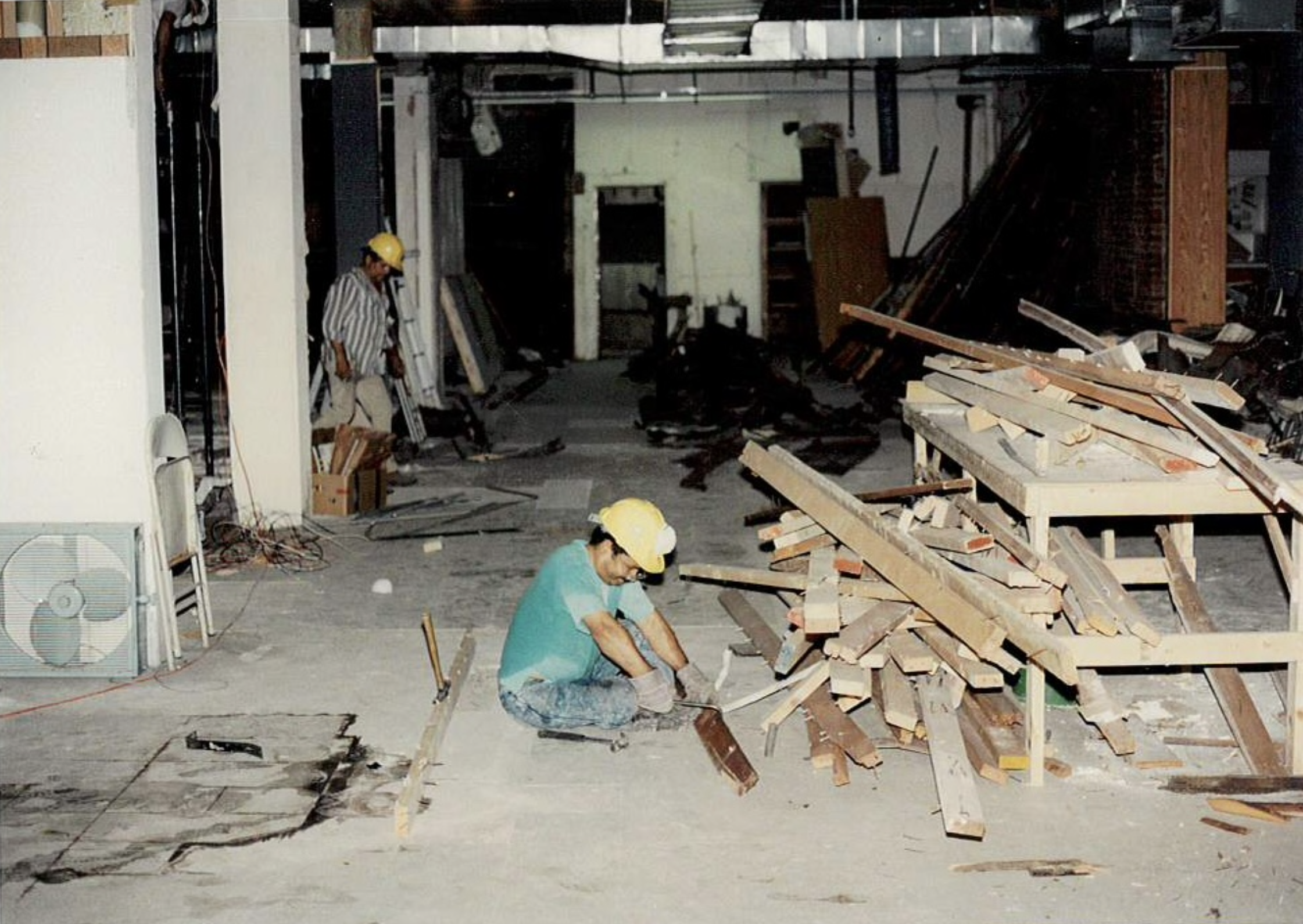
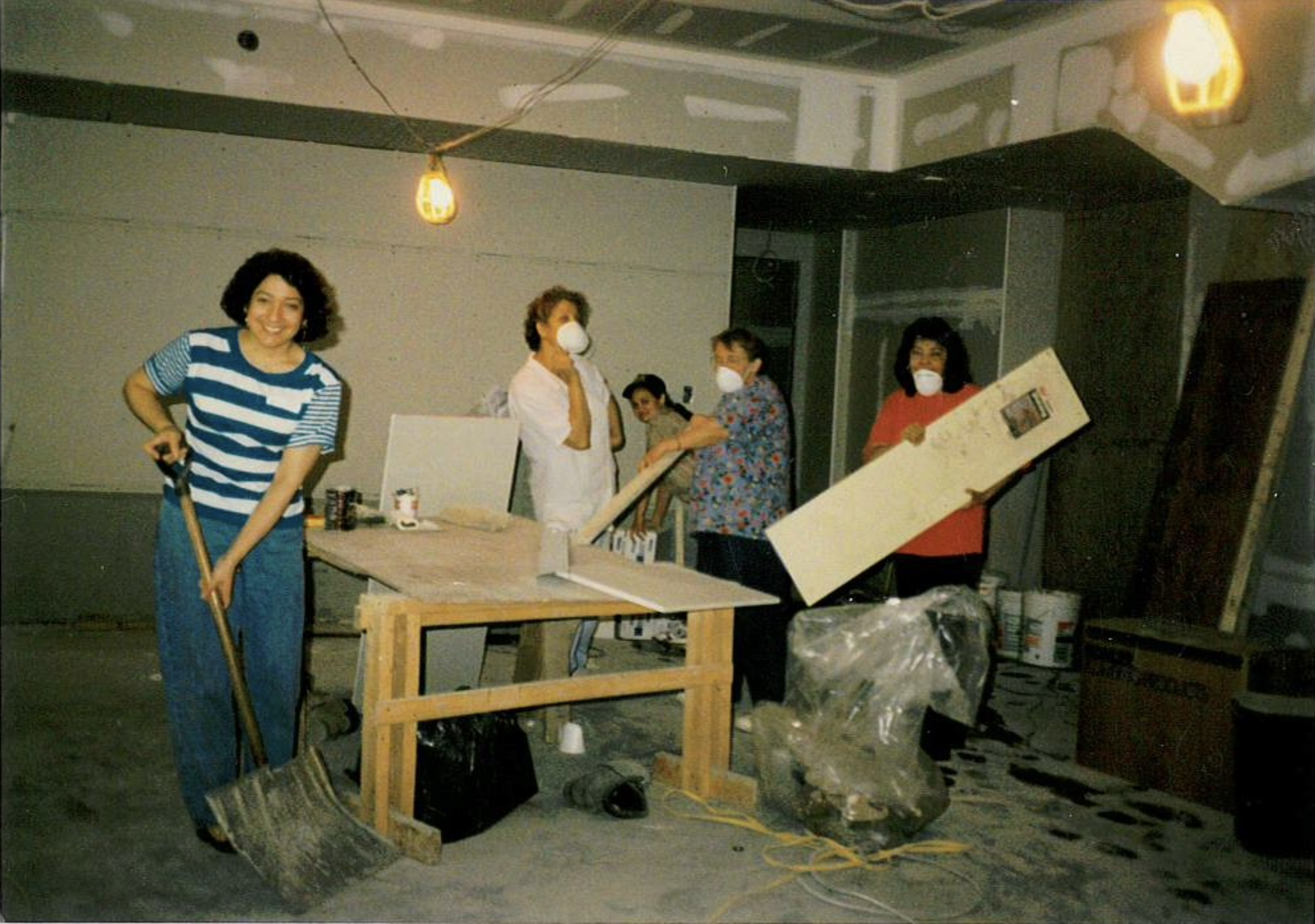

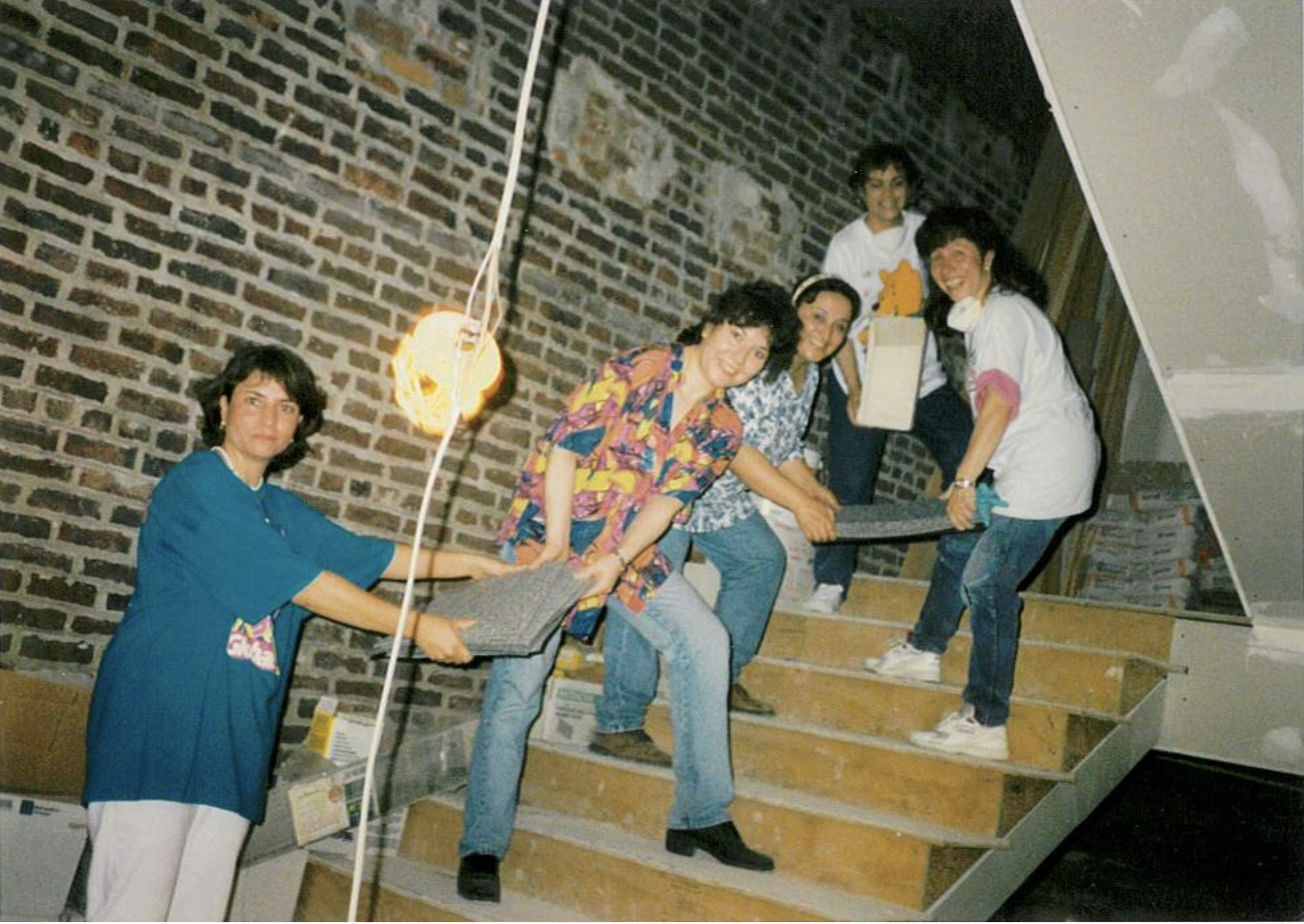
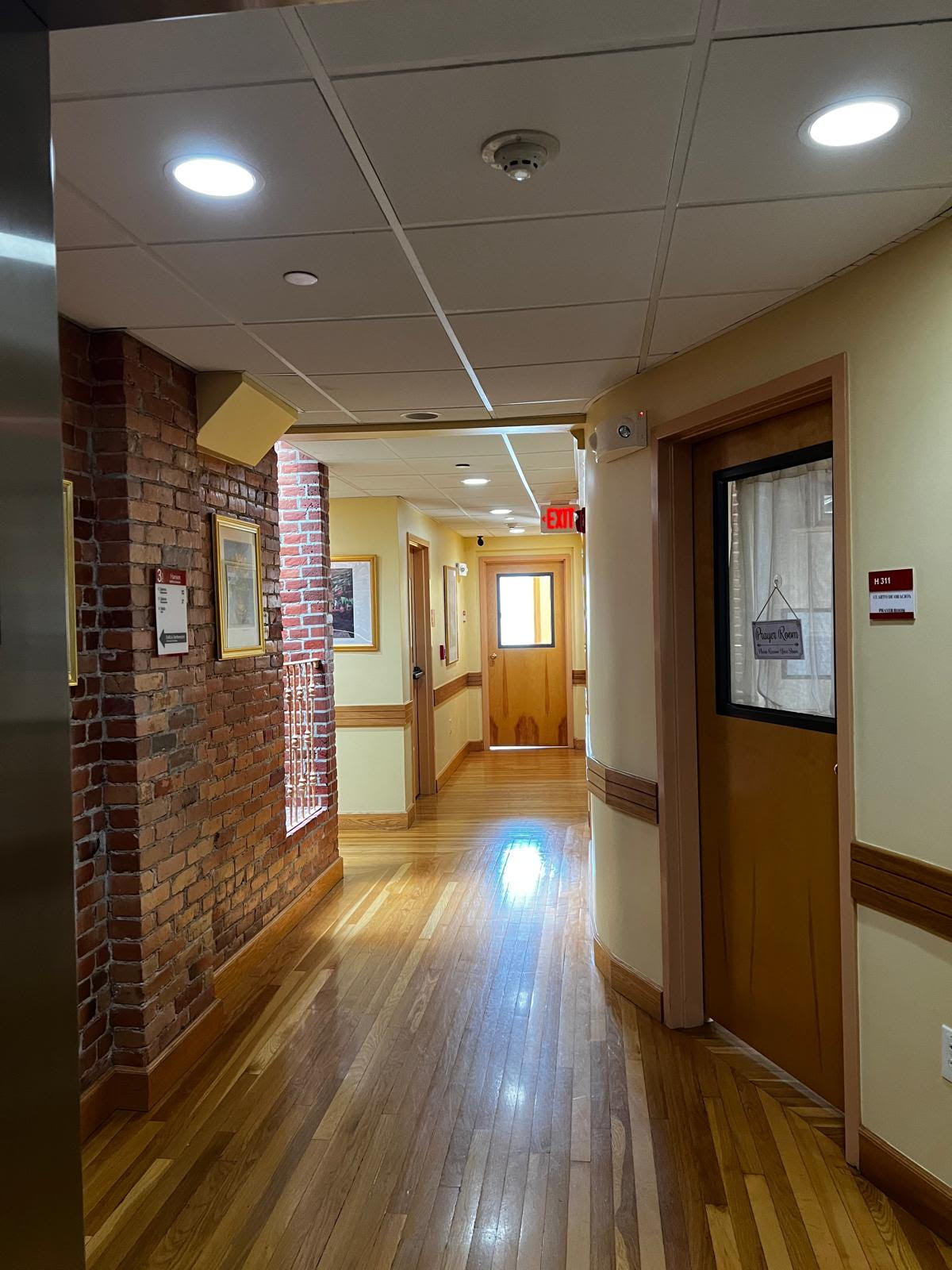
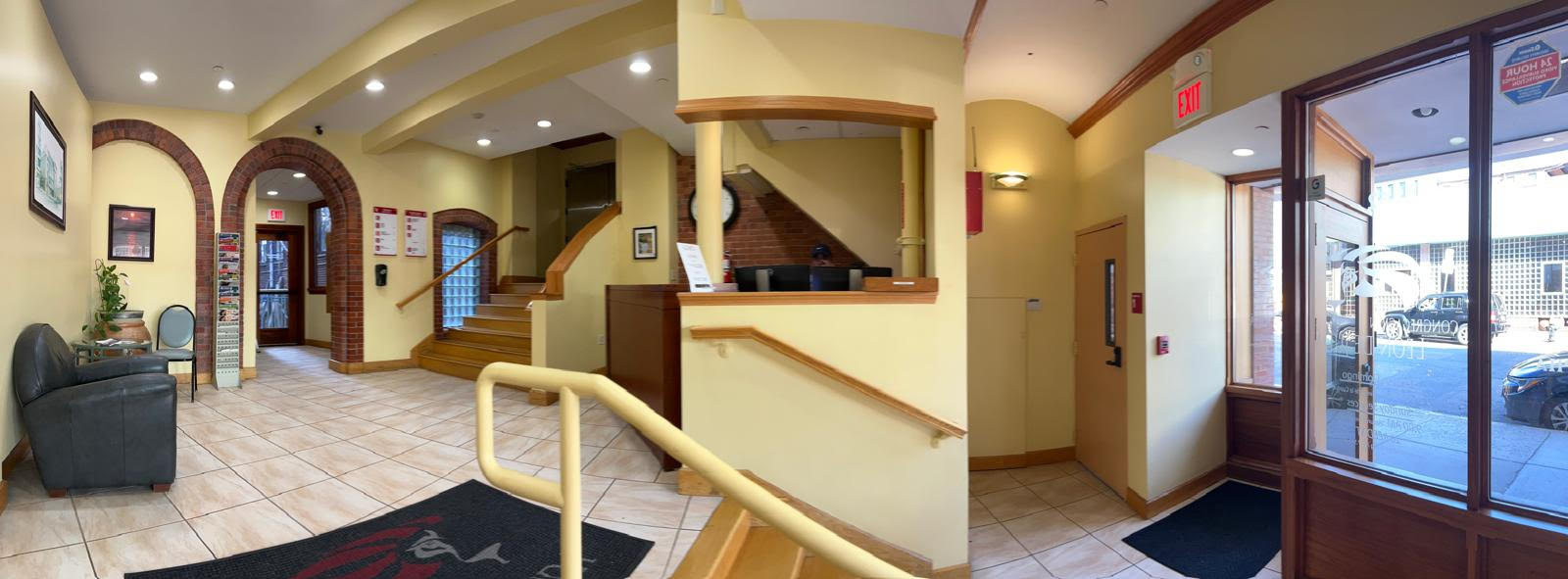



![Connecting Multi-Site Church Leaders [PhotoJournal]](https://images.squarespace-cdn.com/content/v1/57ff1c7ae58c62d6f84ba841/1513116581077-WOWU94O437SJAKKAMZMA/DSC_0438-for-header.jpg)


![Ethiopian Churches in Greater Boston [map]](https://images.squarespace-cdn.com/content/v1/57ff1c7ae58c62d6f84ba841/1506113852983-TSLLC1FENTJJGZYIO7MM/orthodox+cross+church.jpeg)
![Beyond Church Walls: What Christian Leaders Can Learn from Movement Chaplains [Interview]](https://images.squarespace-cdn.com/content/v1/57ff1c7ae58c62d6f84ba841/1550010291251-EVMN3KQ15A70OBTAD4JQ/movement-chaplaincy_outdoorcitygroup.jpg)















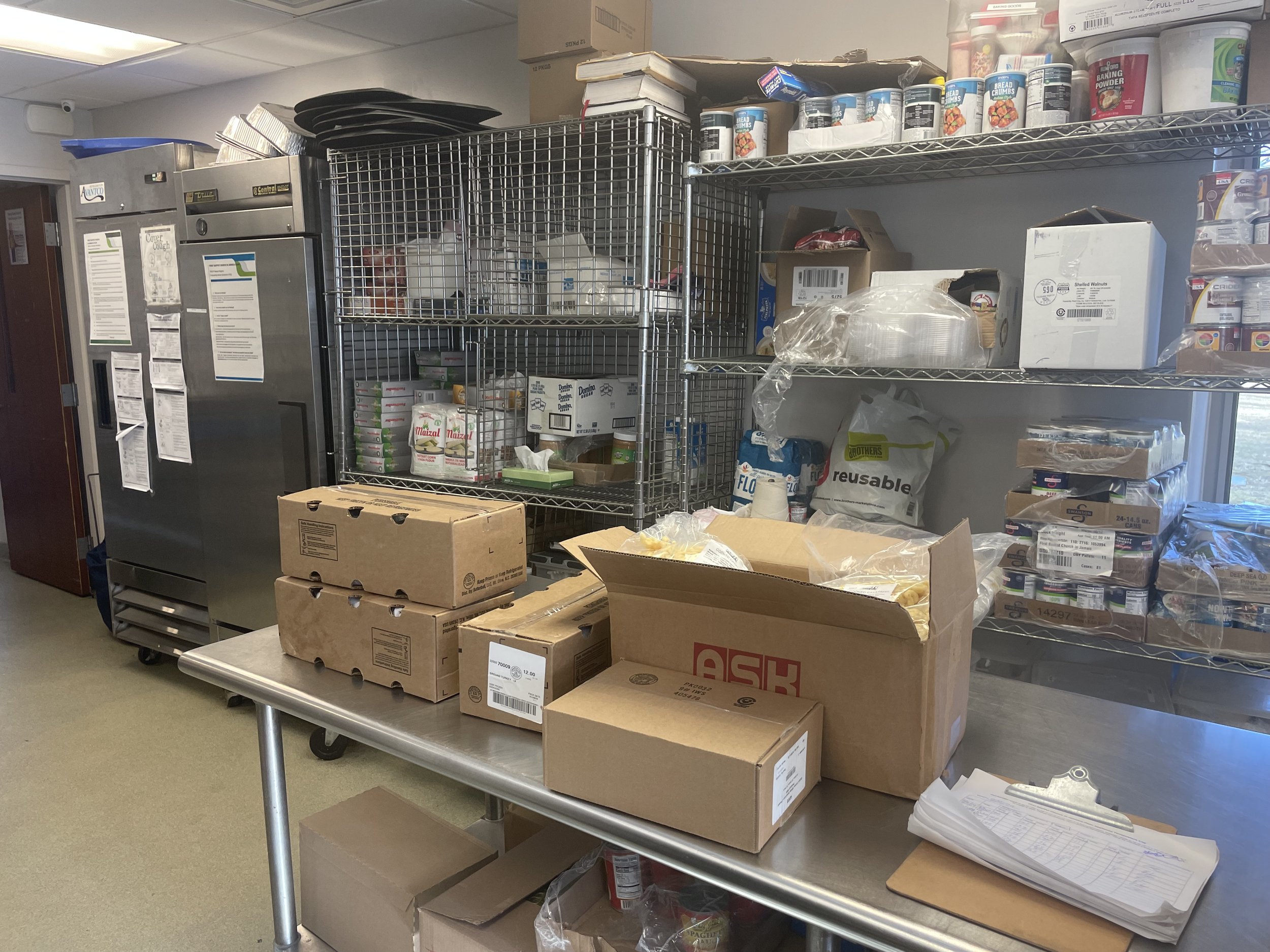
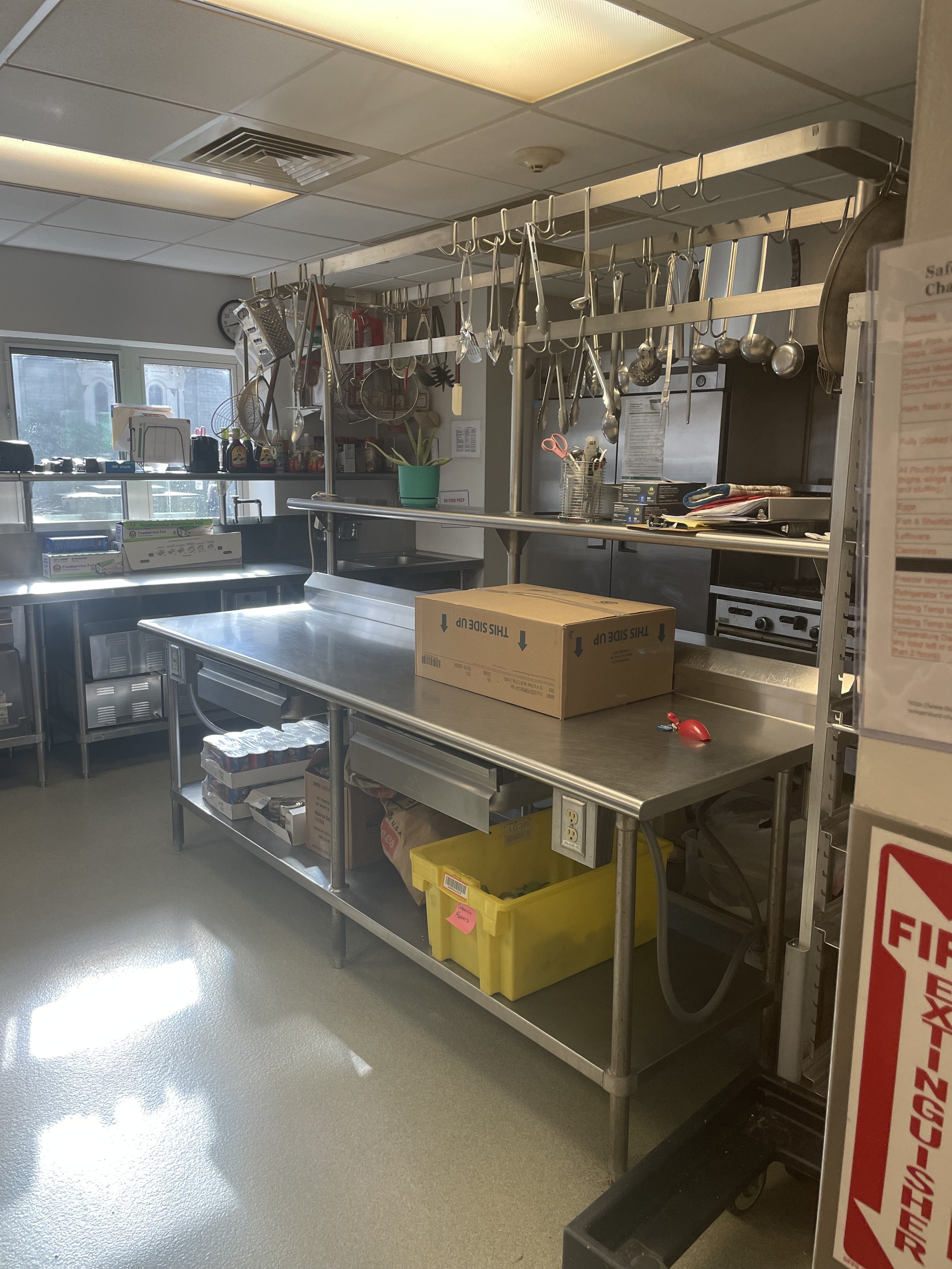

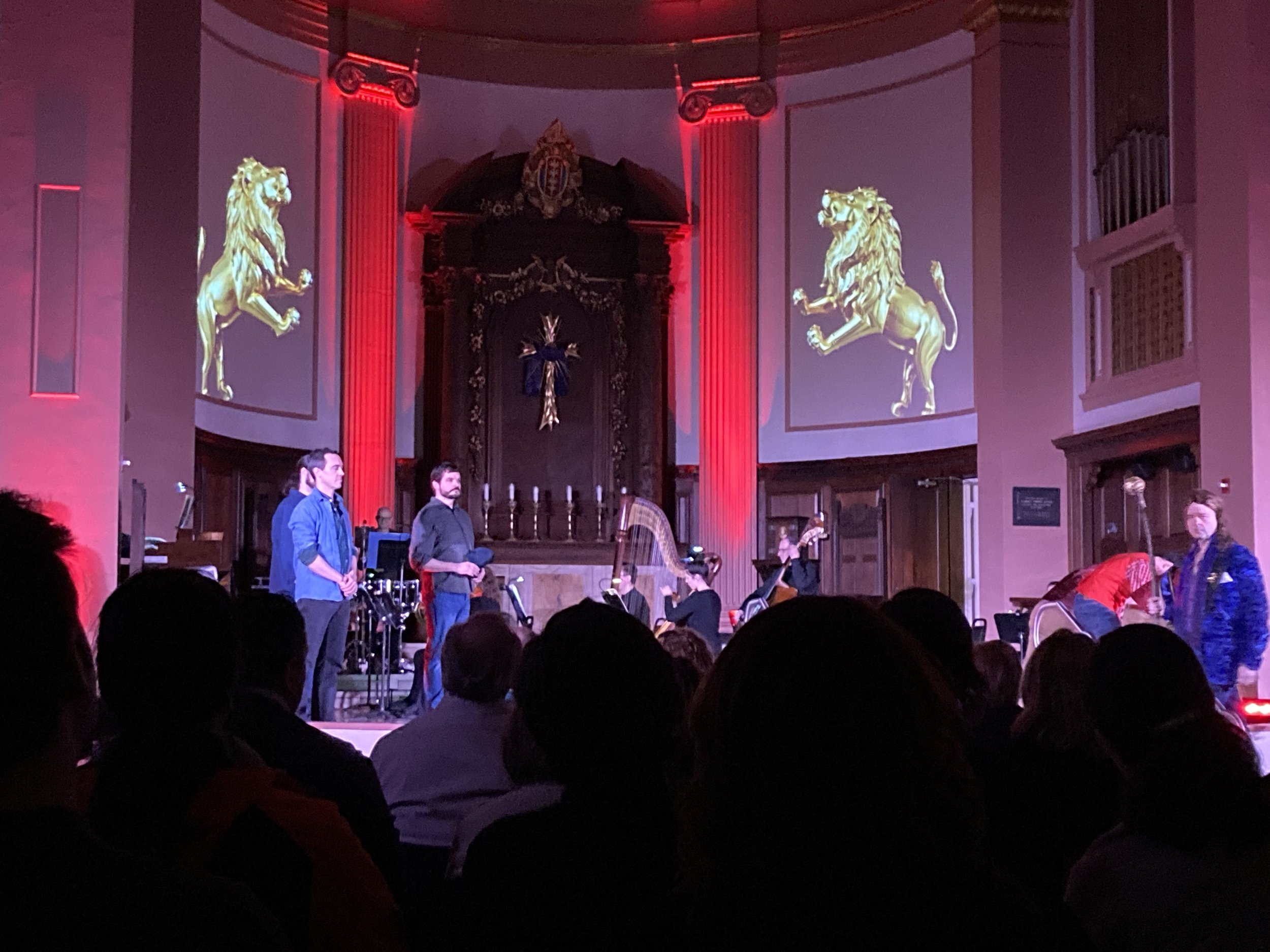
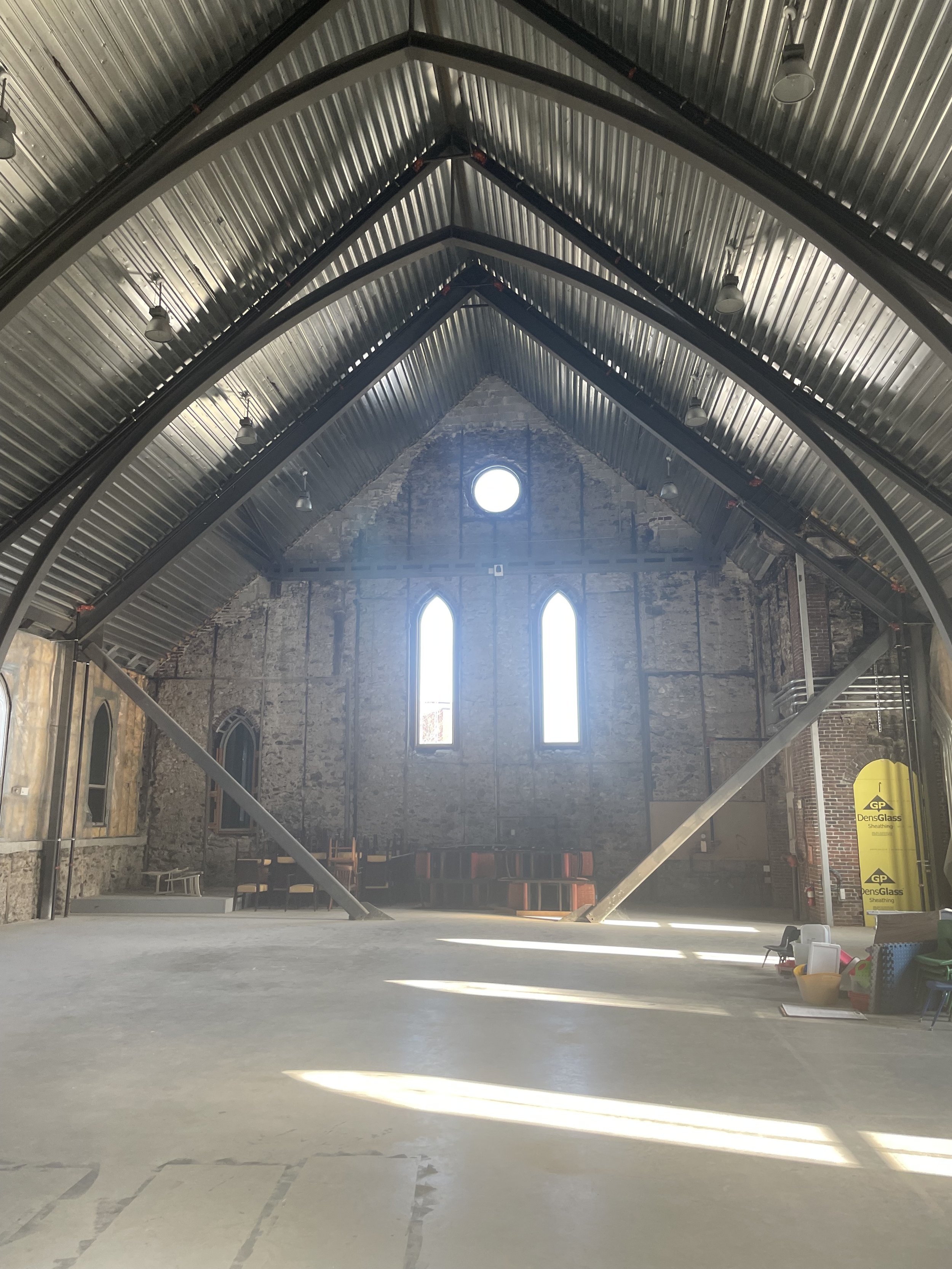







![The Value of Making Youth Voices Heard [VIDEO]](https://images.squarespace-cdn.com/content/v1/57ff1c7ae58c62d6f84ba841/1540908939188-LRJKMBIWZXOOO5V5A9UP/Screenshot+2018-10-30+10.08.13.png)

![Urban Youth Culture Research [Resource List]](https://images.squarespace-cdn.com/content/v1/57ff1c7ae58c62d6f84ba841/1530294363902-G2R6K4YMB3AX42HOIMH9/black-and-white-crowd-gang-38198.jpg)
![God Met Me in Boston [Interview]](https://images.squarespace-cdn.com/content/v1/57ff1c7ae58c62d6f84ba841/1529427271630-4CUDW0ICCL9D8IQ4SV4I/Ruth+%26+Cherchaela+2.jpg)

![[Video] 2018 Trends in Youth Culture](https://images.squarespace-cdn.com/content/v1/57ff1c7ae58c62d6f84ba841/1523474943655-9Q698S527EGBAHR9PLTX/action-adults-celebration-433452.jpg)






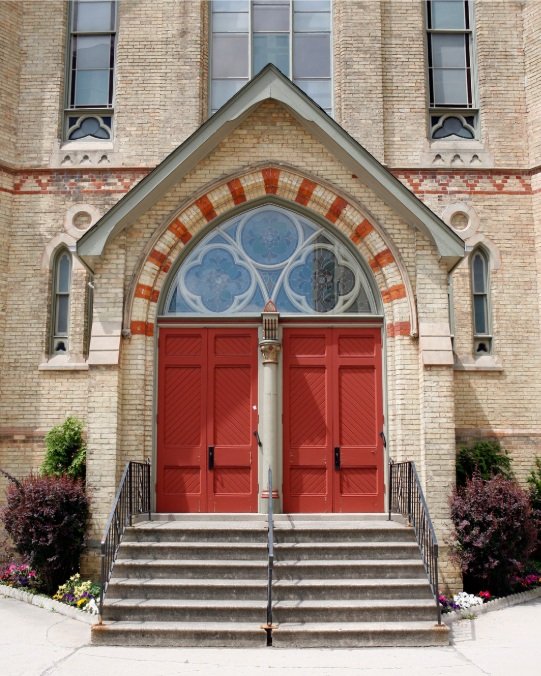






![Gender Based Violence & the Church [Resources]](https://images.squarespace-cdn.com/content/v1/57ff1c7ae58c62d6f84ba841/1525202179581-91N8RV6OP4ASQAHLX1OD/black-and-white-black-and-white-depressed-568025.jpg)













![Hidden Treasures: Celebrating Refugee Stories [photojournal]](https://images.squarespace-cdn.com/content/v1/57ff1c7ae58c62d6f84ba841/1512579164575-AKNVCYX4Q5DW8IN2CNYP/P1070998.jpg)










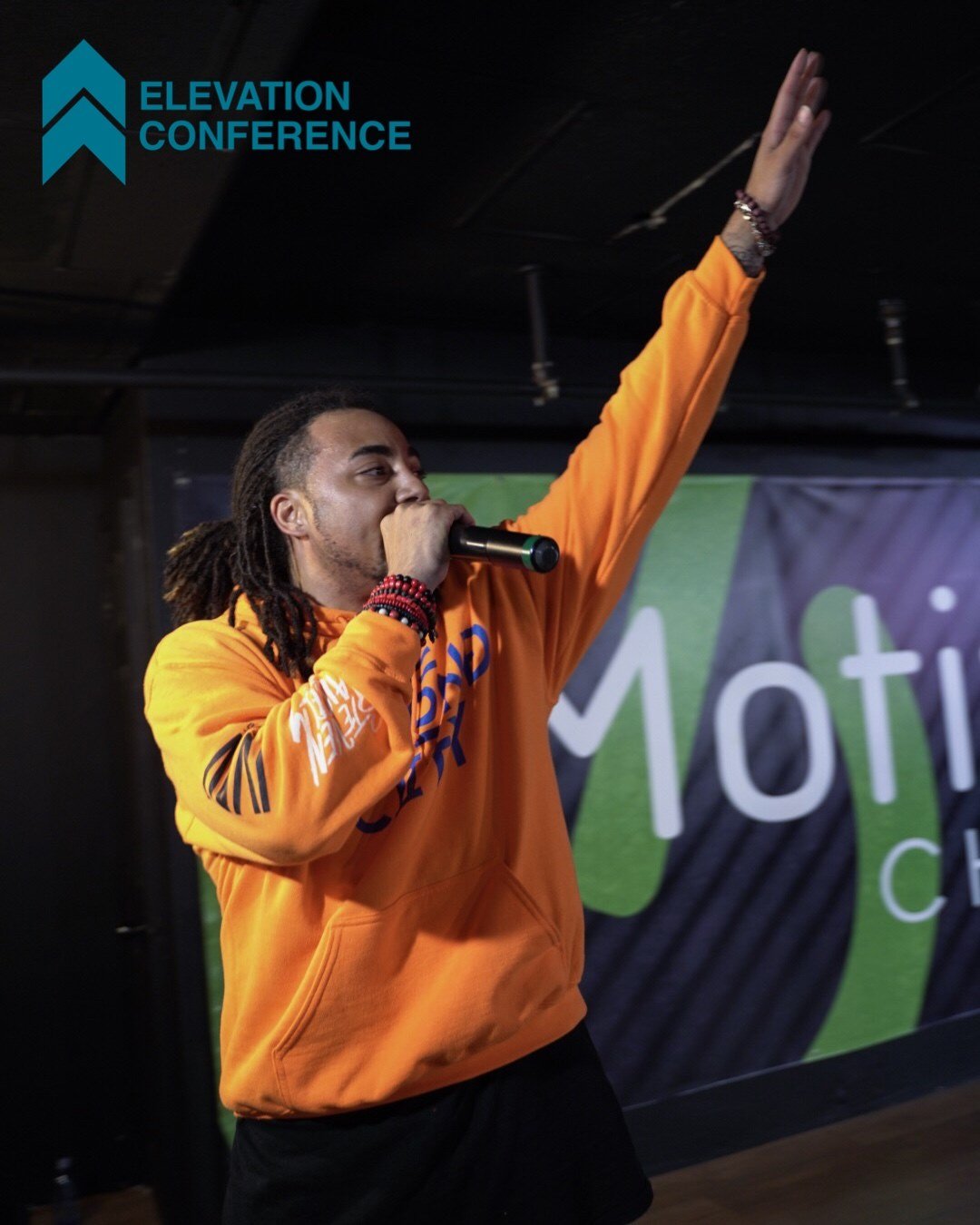

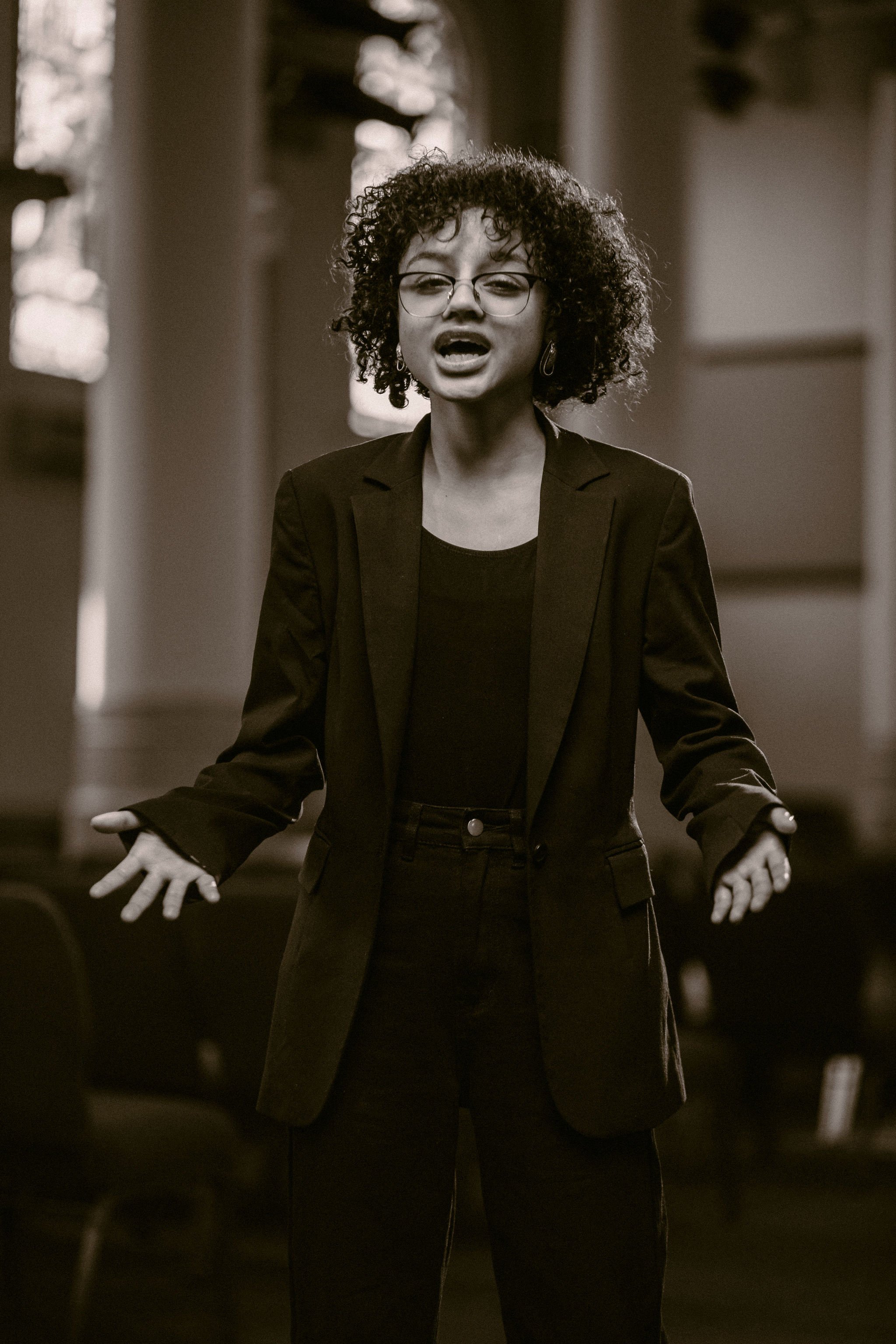













What is the Quiet Revival? Fifty years ago, a church planting movement quietly took root in Boston. Since then, the number of churches within the city limits of Boston has nearly doubled. How did this happen? Is it really a revival? Why is it called "quiet?" EGC's senior writer, Steve Daman, gives us an overview of the Quiet Revival, suggests a definition, and points to areas for further study.